LG DLGX5001V User Manual
Displayed below is the user manual for DLGX5001V by LG which is a product in the Tumble Dryers category. This manual has pages.
Related Manuals

OWNER’S MANUAL
DRYER
Please read this owner’s manual thoroughly before operating and keep it
handy for reference at all times.
MFL67731049
ENGLISH ESPAÑOL
DLEX5000* DLGX5001*
www.lg.com
Copyright © 2017 LG Electronics Inc. All Rights Reserved.
MFL67731049_en_170714.indd 1 2017.7.14 2:23:13 PM

2TABLE OF CONTENTS
TABLE OF CONTENTS
3 IMPORTANT SAFETY
INSTRUCTIONS
3 WHAT TO DO IF YOU SMELL GAS
4 BASIC SAFETY PRECAUTIONS
4 CALIFORNIA SAFE DRINKING WATER AND
TOXIC ENFORCEMEN ACT
5 GROUNDING INSTRUCTIONS
5 SAFETY INSTRUCTIONS FOR INSTALLATION
6 SAFETY INSTRUCTIONS FOR STEAM
FUNCTIONS
7 SAFETY INSTRUCTIONS FOR CONNECTING
ELECTRICITY
8 TRANSMITTER MODULE
INFORMATION
9 SPECIAL FEATURES
10 PRODUCT OVERVIEW
10 Parts
10 Accessories
11 Control Panel Features
12 Display
13 INSTALLATION
13 Installation Overview
14 Installation Location Requirements
14 Clearances
15 Clearances with Optional Pedestal Base
16 Leveling the Dryer
17 Reversing the Door
19 Installing the Side Vent Kit
20 Venting the Dryer
22 Connecting the Inlet Hose
23 Connecting Gas Dryers
25 Connecting Electric Dryers
30 Special Requirements for Manufactured or
Mobile Homes
30 Final Installation Check
31 Installation Test (Duct Check)
33 OPERATION
33 Operating the Dryer
34 Cycle Guide
35 Sorting Loads
35 Loading the Dryer
35 Check the Lint Filter before Every Load
35 Storage Under Top Plate
36 Using the lid
37 Cycle Modifier Buttons
38 Special Functions
39 Custom Program
40 Steam Functions
40 Steam Cycle Guide
41 SMART APPLIANCE
CONNECTIVITY
41 Connectivity Overview
41 Connectivity Setup
42 Smart ThinQ™
44 USING SMART DIAGNOSISTM
45 MAINTENANCE
45 Regular Cleaning
46 TROUBLESHOOTING
46 Before Calling for Service
49 User Support Videos
49 SPECIFICATIONS
50 WARRANTY
MFL67731049_en_170714.indd 2 2017.7.14 2:23:13 PM

3
ENGLISH
IMPORTANT SAFETY INSTRUCTIONS
IMPORTANT SAFETY INSTRUCTIONS
READ ALL INSTRUCTIONS BEFORE USE
wWARNING
For your safety, the information in this manual must be followed to minimize the risk of fire, explosion, or electric
shock, or to prevent property damage, injury to persons, or death.
Your safety and the safety of others is very important.
We have provided many important safety messages in this manual and on your appliance. Always read and obey all
safety messages.
This is the safety alert symbol.
This symbol alerts you to potential hazards that can kill or hurt you and others.
All safety messages will follow the safety alert symbol and either the word DANGER, WARNING, or CAUTION.
These words mean:
wDANGER
You will be killed or seriously injured if you don’t immediately follow instructions.
wWARNING
You can be killed or seriously injured if you don’t follow instructions.
wCAUTION
You may be slightly injured or cause damage to the product if you do not follow instructions.
All safety messages will tell you what the potential hazard is, tell you how to reduce the chance of injury, and tell
you what can happen if the instructions are not followed.
wWARNING
Failure to follow safety warnings exactly could result in serious injury, death or property damage.
- Do not store or use gasoline or other flammable vapors and liquids in the vicinity of this or any other appliance.
- WHAT TO DO IF YOU SMELL GAS
• Do not try to light any appliance.
• Do not touch any electrical switch; do not use any phone in your building.
• Clear the room, building or area of all occupants.
• Immediately call your gas supplier from a neighbor’s phone. Follow the gas supplier’s instructions.
• If you cannot reach your gas supplier, call the fire department.
- Installation and service must be performed by a qualified installer, service agency or the gas supplier.
w
MFL67731049_en_170714.indd 3 2017.7.14 2:23:14 PM

4IMPORTANT SAFETY INSTRUCTIONS
IMPORTANT SAFETY INSTRUCTIONS
READ ALL INSTRUCTIONS BEFORE USE
wWARNING
For your safety, the information in this manual must be followed to minimize the risk of fire, explosion, or electric
shock, or to prevent property damage, injury to persons, or death.
wWARNING
To reduce the risk of fire, electric shock, or injury to persons when using this appliance, follow basic precautions,
including the following:
This act requires the governor of California to publish a list of substances known to the state to cause cancer, birth
defects, or other reproductive harm and requires businesses to warn customers of potential exposure to such
substances.
Gas appliances can cause minor exposure to four of these substances, namely benzene, carbon monoxide,
formaldehyde, and soot, caused primarily by the incomplete combustion of natural gas or LP fuels.
Properly adjusted dryers will minimize incomplete combustion. Exposure to these substances can be minimized
further by properly venting the dryer to the outdoors.
wWARNING:This product contains chemicals known to the State of California to cause cancer and birth defects or
other reproductive harm.
Wash hands after handling.
• Read all instructions before using the dryer.
• Before use, the dryer must be properly installed as
described in this manual.
•
• Do not dry articles that have been previously cleaned
in, washed in, soaked in, or spotted with gasoline, dry-
cleaning solvents, or other flammable or explosive
substances as they give off vapors that could ignite or
explode.
•
• Do not repair or replace any part of the dryer
or attempt any servicing unless specifically
recommended in this owner’s manual or in published
user-repair instructions that you understand and have
the skills to carry out.
•
• Before the dryer is removed from service or discarded,
remove the door to the drying compartment.
• Do not allow children to play on or in the dryer. Close
supervision of children is necessary when the dryer is
used near children.
• Do not use fabric softeners or products to eliminate
static unless recommended by the manufacturer of
the fabric softener or product.
•
• Keep area around the exhaust opening and adjacent
surrounding areas free from the accumulation of lint,
dust, and dirt.
• The interior of the dryer and exhaust vent should be
cleaned periodically by qualified service personnel.
• Do not install or store the dryer where it will be
exposed to the weather.
• Always check the inside of the dryer for foreign
objects.
• Clean lint screen before or after each load.
•
MFL67731049_en_170714.indd 4 2017.7.14 2:23:14 PM

5
ENGLISH
IMPORTANT SAFETY INSTRUCTIONS
•
Follow details in
the installation instructions. Electric shock can result if
the dryer is not properly grounded.
• as
described in this manual. Electric shock can result if
the dryer is not properly grounded.
•
•
Failure to follow this
warning can cause serious injury, fire, electric shock, or
death.
•
Failure to follow this
warning can cause serious injury, fire, electric shock, or
death.
•
Improper
power circuit can melt, creating electric shock and/or
fire hazard.
•
Failure to do so can
result in death, explosion, fire, or burns.
•
Failure to do so can result in
death, explosion, fire, or burns.
• Packaging
material can be dangerous for children. There is a risk
of suffocation.
•
Failure to do so can cause
deform, smoke and fire.
•
Dripping wax,
smoke, or fire can result.
•
Failure to do so can cause product damage, smoke or
fire.
IMPORTANT SAFETY INSTRUCTIONS
READ ALL INSTRUCTIONS BEFORE USE
wWARNING
For your safety, the information in this manual must be followed to minimize the risk of fire, explosion, or electric
shock, or to prevent property damage, injury to persons, or death.
This appliance must be grounded. In the event of malfunction or breakdown, grounding will reduce the risk of
electric shock by providing a path of least resistance for electric current. This appliance must be equipped with a cord
having an equipment-grounding conductor and a grounding plug. The plug must be plugged into an appropriate
outlet that is properly installed and grounded in accordance with all local codes and ordinances.
Do not modify the plug provided with the appliance. If it will not fit the outlet, have a proper outlet installed by
a qualified electrician. This appliance must be connected to a grounded metal, permanent wiring system or an
equipment-grounding conductor must be run with the circuit conductors and connected to the equipment-
grounding terminal or lead on the appliance. Electric shock can result if the dryer is not properly grounded.
wWARNING
To reduce the risk of fire, electric shock, or injury to persons when using this appliance, follow basic precautions,
including the following:
MFL67731049_en_170714.indd 5 2017.7.14 2:23:14 PM

6IMPORTANT SAFETY INSTRUCTIONS
IMPORTANT SAFETY INSTRUCTIONS
READ ALL INSTRUCTIONS BEFORE USE
wWARNING
For your safety, the information in this manual must be followed to minimize the risk of fire, explosion, or electric
shock, or to prevent property damage, injury to persons, or death.
wWARNING
To reduce the risk of injury to persons, follow all industry recommended safety procedures including the use of long
sleeved gloves and safety glasses. Failure to follow all of the safety warnings in this manual could result in property
damage, injury to persons, or death.
Exhaust/Ducting:
wWARNING
To reduce the risk of fire, electric shock, or injury to persons when using this appliance, follow basic precautions,
including the following:
•
Failure to follow these instructions can result in fire or
death.
•
. An accumulation of lint in any area of
the home can create a health and fire hazard.
•
Punctured
ductwork can cause a fire if it collapses or becomes
otherwise restricted in use or during installation.
•
Failure to
follow these instructions can result in fire or death.
•
dryer. Failure to follow these instructions can result in
fire or death.
•
Failure to
follow these instructions can result in fire or death.
•
Secure
all joints with duct tape. For complete details, follow
the Installation Instructions. Failure to follow these
instructions can result in fire or death.
wWARNING
Failure to follow safety warnings exactly could result
in serious injury, death or property damage.
Do not install a booster fan in the exhaust duct.
Install all clothes dryers in accordance with the
installation instructions of the manufacturer of the
dryer.
•
Failure to follow these instructions can result in a burn
hazard.
•
Failure to follow these
instructions can result in fire or death.
•
Failure to follow these instructions can
result in fire or death.
•
Failure to follow these
instructions can result in a burn hazard.
•
Failure to follow these instructions can result
in a burn hazard.
MFL67731049_en_170714.indd 6 2017.7.14 2:23:14 PM

7
ENGLISH
IMPORTANT SAFETY INSTRUCTIONS
IMPORTANT SAFETY INSTRUCTIONS
READ ALL INSTRUCTIONS BEFORE USE
wWARNING
For your safety, the information in this manual must be followed to minimize the risk of fire, explosion, or electric
shock, or to prevent property damage, injury to persons, or death.
wWARNING
To reduce the risk of fire, electric shock, or injury to persons when using this appliance, follow basic precautions,
including the following:
•
To prevent
injury to persons or damage to the dryer, the electrical
power cord must be plugged into a properly grounded
outlet.
•
Failure to do so can result in electric shock
or injury.
•
Failure to follow these instructions can create an
electric shock hazard and/or a fire hazard.
•
Failure to follow these instructions can create an
electric shock hazard and/or a fire hazard.
•
This provides
the best performance and also prevents overloading
house wiring circuits which could cause a fire hazard
from overheated wires.
•
The power cord can be damaged,
resulting in a risk of fire and electric shock.
•
The power cord can
melt, creating an electric shock and/or fire hazard.
•
This will
prevent injury and prevent damage to the dryer from
fire and electric shock.
MFL67731049_en_170714.indd 7 2017.7.14 2:23:14 PM

8TRANSMITTER MODULE INFORMATION
TRANSMITTER MODULE INFORMATION
Model LCW-003
Frequency
Range 2412 to 2462 MHz
Output
Power (Max)
IEEE 802.11 b : 17.56 dBm
IEEE 802.11 g : 25.53 dBm
IEEE 802.11 n : 25.29 dBm
This equipment has been tested and found to comply
with the limits for a Class B digital device, pursuant
to Part 15 of the FCC Rules. These limits are designed
to provide reasonable protection against harmful
interference in a residential installation. This equipment
generates, uses, and can radiate radio frequency energy
and, if not installed and used in accordance with the
instructions, may cause harmful interference to radio
communications. However, there is no guarantee that
interference will not occur in a particular installation.
If this equipment does cause harmful interference to
radio or television reception, which can be determined
by turning the equipment off and on, the user is
encouraged to try to correct the interference by one or
more of the following measures:
• Reorient or relocate the receiving antenna.
• Increase the separation between the equipment and
the receiver.
• Connect the equipment to an outlet on a circuit
different from that to which the receiver is connected.
• Consult the dealer or an experienced radio/TV
technician for help.
This device complies with part 15 of the FCC Rules.
Operation is subject to the following two conditions:
1) This device may not cause harmful interference and
2) This device must accept any interference received,
including interference that may cause undesired
operation of the device.
Any changes or modifications in construction of this
device which are not expressly approved by the party
responsible for compliance could void the user’s
authority to operate the equipment.
This equipment complies with FCC radiation exposure
limits set forth for an uncontrolled environment. This
transmitter must not be co-located or operating in
conjunction with any other antenna or transmitter.
This equipment should be installed and operated with
a minimum distance of 20 cm (7.8 inches) between the
antenna and your body. Users must follow the specific
operating instructions for satisfying RF exposure
compliance.
To obtain the source code under GPL, LGPL, MPL, and
other open source licenses, that is contained in this
product, please visit http://opensource.lge.com.
In addition to the source code, all referred license terms,
warranty disclaimers and copyright notices are available
for download.
LG Electronics will also provide open source code to you
on CD-ROM for a charge covering the cost of performing
such distribution (such as the cost of media, shipping,
and handling) upon email request to opensource@lge.
com. This offer is valid for three (3) years from the date
on which you purchased the product.
MFL67731049_en_170714.indd 8 2017.7.14 2:23:14 PM

9
ENGLISH
SPECIAL FEATURES
SPECIAL FEATURES
EASY-TO-USE CONTROL PANEL
Rotate the cycle selector knob to select the desired dry cycle. Add cycle options or adjust settings with the touch
of a button.
EASY-ACCESS REVERSIBLE DOOR
The wide-opening door provides easy access for loading and unloading. The door hinge can be reversed to adjust
for installation location.
ULTRA-CAPACITY STAINLESS STEEL DRUM WITH DRUM LIGHT
The ultra-large stainless steel drum offers superior durability. The drum is equipped with a light that illuminates
when the dryer door is opened and turns off when the door is closed.
STEAM FUNCTIONS
LG’s steam technology injects fabrics with a swirling jet of hot steam to refresh clothes. Simply select the STEAM
FRESH™ cycle, or add a steam option to selected cycles.
FLOW SENSE™ DUCT BLOCKAGE SENSING SYSTEM INDICATOR
The FLOW SENSE™ duct blockage sensing system detects and alerts you to restrictions in the installed household
ductwork that reduce exhaust airflow through the dryer. If you see the alert: Clean or repair the ducts to remove
the restrictions. Keep your ducts clean to help increase efficiency and reduce long drying times caused by blocked
ducts.
SMART THINQ™
Use a smart phone to control your appliance remotely. Also, it is possible to monitor your cycle
operation so you know how much time is left in the cycle.
Smart appliances can communicate with local utility companies that are equipped with Smart Grid
equipment.
When the cycle is complete or the appliance has problems, you have the option of receiving
push notifications on your smart phone.
Download new and special cycles that are not included with the machine.
Should you experience technical difficulty, your appliance has the capability of transmitting
data by phone to the Customer Information Center to diagnosis the problem.
This feature automatically sets cycle settings based on your laundry needs.
This feature provides the Flow Sense status and cycle use history for the machine.
Your dryer energy usage is affected by the cycle and settings so you may see some changes
in energy usage from one cycle to another.
Protocol P154
Sanitization Performance of
Residential Clothes dryer
C
E
R
T
I
F
I
E
D
D
E
S
I
G
N
MFL67731049_en_170714.indd 9 2017.7.14 2:23:15 PM

10 PRODUCT OVERVIEW
PRODUCT OVERVIEW
PARTS AND ACCESSORIES
Parts
NOTE
• Visit www.lg.com to purchase accessories.
• Contact LG Customer Service at 1-800-243-0000 (1-888-542-2623 in Canada) if any accessories are missing.
• For your safety and for extended product life, use only authorized components. The manufacturer is not
responsible for product malfunction or accidents caused by the use of separately purchased unauthorized
components or parts.
• The images in this manual may be different from the actual components and accessories, which are subject to
change by the manufacturer without prior notice for product improvement purposes.
Leveling
feet
Reversible
Door
Top Plate Power Cord
Location
(Gas
Models)
Gas
Connection
Location
(Gas Models)
Terminal
Block
Access
Panel
(Electric
Models)
Exhaust
Duct
Outlet
Inlet Valve
HoseY connector
Accessories
Side vent kit
(sold separately)
Kit No. 383EEL9001B
Drying rack
(3750EL1001F)
MFL67731049_en_170714.indd 10 2017.7.14 2:23:18 PM

11
ENGLISH
PRODUCT OVERVIEW
Control Panel Features
Following are instructions for starting and using your new dryer. Please refer to specific sections of this
manual for more detailed information.
wWARNING : To reduce the risk of fire, electric shock, or injury to persons, read this entire manual,
including the Important Safety Instructions, before operating this dryer.
Button
- Press to turn the dryer ON. Press again to turn the dryer OFF.
Pressing the ON/OFF button during a cycle will cancel that cycle and any
load settings will be lost.
- Turn this knob to select the desired cycle. Once the desired cycle has been
selected, the standard presets will be shown in the display. On MANUAL DRY
cycles, these settings can be adjusted using the cycle modifier buttons anytime
before starting the cycle.
- Press this button more than 0.5 seconds hold to start the selected cycle. If the
dryer is running, use this button to pause the cycle without losing the current
settings.
If you do not press the Start/Pause button to resume a cycle within four
minutes, the dryer turns off automatically.
- To adjust the drying time, use these buttons with MANUAL DRY, TIME DRY, and
STEAM FRESH™ cycles, as well as the REDUCE STATIC and EASY IRON options. Press
the MORE TIME button to increase the selected manual cycle time by a minute;
press LESS TIME to decrease the cycle time by a minute.
- Use these buttons to modify the default cycle settings for the selected cycle. The
current settings are shown in the display. Press the button for that option to view
and select other settings.
- The OPTION buttons allow you to select additional cycle options. Certain buttons
marked with an asterisk also allow you to activate special functions by pressing
and holding the button for 3 seconds.
- LG’s steam technology injects fabrics with a swirling jet of hot steam to refresh
clothes, reduce static, and make ironing easier. Simply select the Steam Fresh™
cycle, or you can add a steam option to selected cycles.
Operation
MFL67731049_en_170714.indd 11 2017.7.14 2:23:46 PM

12 PRODUCT OVERVIEW
Display
The display shows the settings, estimated time remaining, options, and status messages for your dryer.
When the dryer is turned on, the light in the display will illuminate.
wWARNING : To reduce the risk of fire, electric shock, or injury to persons, read this entire manual,
including the Important Safety Instructions, before operating this dryer.
- When the Hold to Start button is pressed, the dryer will display the estimated
(SENSOR DRY) or set time (TIME DRY) remaining, and begin tumbling.
The cycle time on SENSOR DRY cycles may fluctuate as the dryer
recalculates drying time for optimal results
- This portion of the display shows which stage of the drying cycle is currently
underway (CLEAN FILTER, DRY, or COOL).
- When CHILD LOCK is set, the CHILD LOCK indicator will appear and all buttons are
disabled except the POWER button. This prevents children from changing settings
while the dryer is operating
- The display will show CLEAN FILTER when the dryer is turned on as a reminder to
clean the lint filter. It turns off when the Hold to Start button is pressed.
- If you have a special combination of settings that you use frequently, you can
save these settings as a CUSTOM PROGRAM.
- The FLOW SENSE™ duct blockage sensing system detects and alerts you to
blockages in the ductwork that reduce exhaust flow from the dryer. This improves
operating efficiency and helps minimize service calls, saving you money.
- When the appliance is connected to the internet through a home Wi-Fi network,
this indicator appears.
MFL67731049_en_170714.indd 12 2017.7.14 2:23:51 PM

13
ENGLISH
INSTALLATION
INSTALLATION
Installation Overview
Checking and
choosing the proper
location
Leveling the dryer Venting the Dryer
Installation test
Connecting Gas Dryers
(Gas Dryer Type)
Connecting Electric Dryers
(Electric Dryer Type)
Plugging in the power cord
and grounding
Test run
Press and hold
120V
240V(USA)
230V(CANADA)
(Gas) (Electric)
MFL67731049_en_170714.indd 13 2017.7.14 2:23:52 PM

14 INSTALLATION
Installation Location Requirements
wWARNING
It is important that
you review this entire manual before installing and using your dryer. Detailed instructions concerning electrical
connections, gas connections, and exhaust requirements are provided on the following pages.
Do not operate your dryer at temperatures below 45°F (7°C). At lower temperatures, the dryer might not shut off
at the end of an automatic cycle. This can result in longer drying times. The dryer must not be installed or stored in
an area where it will be exposed to water and/or weather. Check code requirements. Some codes limit, or do not
permit, installation of the dryer in garages, closets, mobile homes or sleeping quarters. Contact your local building
inspector.
Clearances
INSTALLATION SPACING FOR RECESSED AREA OR CLOSET INSTALLATION
The following clearances are recommended for this dryer. Although this dryer has been tested for 1inch (2.5cm)
clearance on the sides and rear, the recommended clearances should be considered for the following reasons:
• A location that allows for proper exhaust installation.
A gas dryer must be exhausted to the outdoors. See
.
• A grounded electrical outlet located within 2 ft.
(61 cm) of either side of the dryer. See
• A sturdy floor to support the total dryer weight of 200
lbs (90.7 kg). The combined weight of a companion
appliance should also be considered.
• No other fuel-burning appliance can be installed in the
same closet as a dryer.
• Additional clearance should be considered for ease of
installation and servicing.
• Additional clearances might be required for wall, door
and floor moldings.
• Additional clearance should be considered on all sides
of the dryer to reduce noise transfer.
For closet installation, with a door, minimum
ventilation openings in the top and bottom of the
door are required. Louvered doors with equivalent
ventilation openings are acceptable.
• Companion appliance clearances should also be
considered.
24 in.
2*
(155 cm
2
)
18" min.*
(45.7 cm)
1"*
(2.5 cm)
5"**
(12.7 cm)
48 in.
2*
(310 cm
2
)
14" max.*
(35.6 cm)
3"
*
(7.6 cm)
3"
*
(7.6 cm)
1"
(2.5 cm)
27’’
(68.6cm)
1"
(2.5 cm)
1"*
(2.5 cm)
5"**
(12.7 cm)
14" max.*
(35.6 cm)
18" min.*
(45.7 cm)
0"
(0 cm)
38
11/16
"
(98.3cm)
1"*
(2.5 cm)
27’’
(68.6cm)
27’’
(68,6cm)
1"*
(2.5 cm)
7"* (17.8 cm)
9"*
(22.9 cm)
7"* (17.8 cm)
1"**
(2.5 cm)
27"
(68.6cm)
5"**
(12.7 cm) (2.5 cm)
(2.5 cm)
48 in.
2
*
(310 cm
2
)
3"* (7.6 cm)
3"* (7.6 cm)
1"* (2.5 cm)
24 in.
2
*
(155 cm
2
)
6"* (15.2 cm)
81.6
"
(207.2 cm)
29"
(73.7 cm)
1"
(2.5 cm)
1"
(2.5 cm)
5 "**
(14 cm)
2/4
24 in.
2*
(155 cm
2
)
18" min.*
(45,7 cm)
1"*
(2,5 cm)
5"**
(12,7 cm)
48 in.
2*
(310 cm
2
)
14" max.*
(35,6 cm)
3"
*
(7,6 cm)
3"
*
(7,6 cm)
1"
(2,5 cm)
27’’
(68,6cm)
1"
(2,5 cm)
1"*
(2,5 cm)
5"**
(12,7 cm)
14" max.*
(35,6 cm)
18" min.*
(45,7 cm)
0"
(0 cm)
38
11/16
"
(98,3cm)
1"*
(2,5 cm)
1"*
(2,5 cm)
7"* (17,8 cm)
9"*
(22,9 cm)
7"* (17,8 cm)
27"
(68,6cm) (2,5 cm)
(2,5 cm)
48 in.
2
*
(310 cm
2
)
3"* (7,6 cm)
3"* (7,6 cm)
1"* (2,5 cm)
24 in.
2
*
(155 cm
2
)
6"* (15,2 cm)
81,6
"
(207,2 cm)
29"
(73,7 cm)
1"
(2,5 cm)
1"
(2,5 cm)
5 "**
(14 cm)
2/4
1"**
(2,5 cm)
5"**
(12,7 cm)
31
1
/
8
"
(79.0 cm)
31
1
/
8
"
(79,0 cm)
31 1/8"
(79.0 cm)
31 1/8"
(79,0 cm)
31
1
/
8
"
(79.0 cm)
31
1
/
8
"
(79,0 cm)
NOTE
• Floor must be level, with a maximum slope of 1 inch (2.5 cm) under entire dryer. Clothes may not tumble
properly, and automatic sensor cycles may not operate correctly if dryer is not level.
• For a garage installation, you will need to place the dryer at least 18 inches (46 cm) above the floor. If using a
pedestal, you will need 18 inches (46 cm) to the bottom of the dryer.
NOTE
There should be at least a little space around the dryer (or any other appliance) to eliminate the transfer of
vibration from one to the other. With enough vibration, the appliances will make noise or touch each other
causing paint damage and making even more noise.
MFL67731049_en_170714.indd 14 2017.7.14 2:23:53 PM

15
ENGLISH
INSTALLATION
Clearances with Optional Pedestal Base
RECOMMENDED INSTALLATION SPACING FOR CABINET INSTALLATION
• For cabinet installation with a door, minimum ventilation openings in the top of the cabinet are required.
*Required spacing
** For side or bottom venting,
2 inches (5.1 cm) spacing is allowed.
24 in.
2*
(155 cm
2
)
18" min.*
(45.7 cm)
1"*
(2.5 cm)
5"**
(12.7 cm)
48 in.
2*
(310 cm
2
)
14" max.*
(35.6 cm)
3"
*
(7.6 cm)
3"
*
(7.6 cm)
1"
(2.5 cm)
27’’
(68.6cm)
1"
(2.5 cm)
1"*
(2.5 cm)
5"**
(12.7 cm)
14" max.*
(35.6 cm)
18" min.*
(45.7 cm)
0"
(0 cm)
38
11/16
"
(98.3cm)
1"*
(2.5 cm)
27’’
(68.6cm)
27’’
(68,6cm)
1"*
(2.5 cm)
7"* (17.8 cm)
9"*
(22.9 cm)
7"* (17.8 cm)
1"**
(2.5 cm)
27
"
(68.6cm)
5"**
(12.7 cm) (2.5 cm)
(2.5 cm)
48 in.
2
*
(310 cm
2
)
3"* (7.6 cm)
3"* (7.6 cm)
1"* (2.5 cm)
24 in.
2
*
(155 cm
2
)
6"* (15.2 cm)
81.6"
(207.2 cm)
29"
(73.7 cm)
1"
(2.5 cm)
1"
(2.5 cm)
5 "**
(14 cm)
2/4
24 in.
2*
(155 cm
2
)
18" min.*
(45,7 cm)
1"*
(2,5 cm)
5"**
(12,7 cm)
48 in.
2*
(310 cm
2
)
14" max.*
(35,6 cm)
3"
*
(7,6 cm)
3"
*
(7,6 cm)
1"
(2,5 cm)
27’’
(68,6cm)
1"
(2,5 cm)
1"*
(2,5 cm)
5"**
(12,7 cm)
14" max.*
(35,6 cm)
18" min.*
(45,7 cm)
0"
(0 cm)
38
11/16
"
(98,3cm)
1"*
(2,5 cm)
1"*
(2,5 cm)
7"* (17,8 cm)
9"*
(22,9 cm)
7"* (17,8 cm)
27
"
(68,6cm)
(2,5 cm)
(2,5 cm)
48 in.
2
*
(310 cm
2
)
3"* (7,6 cm)
3"* (7,6 cm)
1"* (2,5 cm)
24 in.
2
*
(155 cm
2
)
6"* (15,2 cm)
81,6"
(207,2 cm)
29"
(73,7 cm)
1"
(2,5 cm)
1"
(2,5 cm)
5 "**
(14 cm)
2/4
1"**
(2,5 cm)
5"**
(12,7 cm)
31
1
/
8
"
(79.0 cm)
31
1
/
8
"
(79,0 cm)
31
1
/
8
"
(79.0 cm)
31
1
/
8
"
(79,0 cm)
31
1
/
8
"
(79.0 cm)
31
1
/
8
"
(79,0 cm)
MFL67731049_en_170714.indd 15 2017.7.14 2:23:54 PM

16 INSTALLATION
Leveling the Dryer
wWARNING
Failure to follow this warning can cause serious injury
or death.
Failure to follow
this warning can cause serious injury or death.
To ensure that the dryer provides optimal drying
performance, it must be level. To minimize vibration,
noise, and unwanted movement, the floor must be a
perfectly level, solid surface.
1. Position the dryer in the final location. Place a level
across the top of the dryer.
• All four leveling feet must rest solidly on the floor.
Gently push on the top corners of the dryer to make
sure that the dryer does not rock from corner to corner.
If you are installing the dryer on the optional pedestal,
you must use the leveling feet on the pedestal to
level the dryer. The dryer leveling feet should be fully
retracted.
2. Use an adjustable wrench to turn the leveling feet.
Turn clockwise to raise the dryer or counterclockwise
to lower it. Raise or lower the leveling feet until the
dryer is level from side to side and front to back.
Make sure that all four leveling feet are in firm contact
with the floor.
Level
Leveling Feet
NOTE
Adjust the leveling feet only as far as necessary to
level the dryer. Extending the leveling feet more than
necessary can cause the dryer to vibrate.
MFL67731049_en_170714.indd 16 2017.7.14 2:23:55 PM

17
ENGLISH
INSTALLATION
flat blade screwdriver, Phillips screwdriver
1. Unplug the machine or turn off the power supply at
the main circuit before reversing the door. Open the
dryer door.
wWARNING
Be sure to support the weight of the door before
removing the hinge screws.
1. While supporting the door, remove the four hinge
screws.
2. Carefully pull the door away from the cabinet to reveal
the wire harness behind the hinge at the top. Depress
the side lock tab to disconnect the wire harness
connector. The twist tie and cap should prevent the
wire harness from pulling back into the cabinet.
3. Remove the door from the cabinet cover. Set the door
face down on a protected work surface.
Cap R
Reversing the Door
wWARNING
THE DRYER DOOR IS VERY LARGE AND HEAVY. Two or
more people are required when reversing the door.
Failure to follow the warnings below can result in
damage to the dryer, property damage or injury to
persons.
the door.
1. Remove the four screws on the right door frame
(handle and strike), lift it off, and set the parts aside.
(The two center strike screws are longer.)
2. Remove the four screws on the left door frame (hinge
assembly).
3. Carefully lift out the hinge assembly, revealing the
wire harness connector at the top of the hinge.
Depress the center lock tab to disconnect the wire
harness connector.
4. Rotate the hinge assembly 180 degrees and connect
the wire harness to the connector in the bottom right
side of the door.
5. Install the hinge assembly in the recess on the right
side of the door, tucking the wire harness in the corner
to make room. Insert and tighten the four screws.
6. Rotate the handle removed in step one 180 degrees
and install it on the left side of the door using the two
shorter screws. Use the longer screws to mount the
door strike in the center.
Frame L Frame R
MFL67731049_en_170714.indd 17 2017.7.14 2:24:9 PM

18 INSTALLATION
1. Remove the two screws and the latch assembly from
the left side of the opening.
2. Rotate the latch assembly and remount it on the right
side of the opening with the two screws.
3. Switch the two caps. Untie the twist tie and remove
the small cap from the side of the wire harness on the
top right of the cabinet. Make sure the wire harness
does not slip back into the cabinet.
4. Remove the left cap by gently prying it up with a flat
blade screwdriver, being careful not to scratch the
paint. Disconnect the wire harness attached to the
cap by pressing the tabs on either side.
5. Attach the left cap to the wire harness on the top right
of the cabinet. Snap the cap into place.
6. Attach the twist tie and the small cap removed in step
1 to the side of the wire harness on the bottom left of
the cabinet. The wire harness will be attached to the
harness in the door.
7. Unscrew the four decorative screws from the left side
of the cabinet and insert them into the matching
holes on the right side of the cabinet.
Latch
Cap L
Cap L
wWARNING
Be sure to support the weight of the door while
inserting the hinge screws.
1. While supporting the door, move the door into
position with the hinge on the left side.
2. Connect the wire harness from the hinge to the
connector on the lower left side of the cabinet.
Harness
Connector
Hinge Hole
1. Align the hinge with the mounting holes.
2. While supporting the door, fasten the four hinge
screws.
1. Check that the door closes and latches properly.
MFL67731049_en_170714.indd 18 2017.7.14 2:24:13 PM

19
ENGLISH
INSTALLATION
Installing the Side Vent Kit
wWARNING
• Failure to follow all of the safety warnings in this
manual could result in property damage, injury to
persons, or death.
Your new dryer is shipped to vent to the rear.
It can also be configured to vent to the bottom or side
(right-side venting is not available on gas models).
An adapter kit, part number , may be
purchased from an LG retailer. This kit contains the
necessary duct components to change the dryer vent
location.
1. Remove the rear exhaust duct retaining screw. Pull
out the exhaust duct.
OPTION 1: SIDE VENTING
2. Press the tabs on the knockout and carefully remove
the knockout for the desired vent opening (right-
side venting is not available on gas models). Press the
adapter duct onto the blower housing and secure to
the base of the dryer as shown.
3. Preassemble a 4-inch (10.2 cm) elbow to the next
4-inch (10.2 cm) duct section, and secure all joints
with duct tape. Be sure that the male end of the elbow
faces AWAY from the dryer. Insert the elbow/duct
assembly through the side opening and press it onto
the adapter duct. Secure it in place with duct tape.
Be sure that the male end of the duct protrudes 1½
inches (3.8 cm) to connect the remaining ductwork.
Attach the cover plate to the back of the dryer with
the included screw.
OPTION 2: BOTTOM VENTING
2. Press the adapter duct onto the blower housing and
secure it to the base of the dryer as shown.
3. Insert the 4-inch (10.2 cm) elbow through the rear
opening and press it onto the adapter duct. Be sure
that the male end of the elbow faces down through
the hole in the bottom of the dryer. Secure it in place
with duct tape.
Attach the cover plate to the back of the dryer with
the included screw.
Rear
Exhaust Duct
Retaining
Screw
Elbow
Cover
Plate
Knockout
Bracket
Adapter
Duct
Bracket
Adapter
Duct
Elbow
Cover
Plate
12/4”
(3.8 cm)
MFL67731049_en_170714.indd 19 2017.7.14 2:24:15 PM

20 INSTALLATION
Venting the Dryer
wWARNING
To reduce the risk of fire, electric shock, or injury to persons when using this appliance, follow basic precautions,
including the following:
• Failure to follow
these instructions can result in fire or death.
•
Failure to follow these instructions can result
in fire or death.
•
Failure to follow these instructions can result in fire or
death.
•
Failure to follow these instructions can result in fire or
death.
•
Failure to follow these instructions can result in fire or
death.
•
Failure to follow these
instructions can result in fire or death.
•
Failure to follow these instructions can result
in fire or death.
•
Failure to follow these instructions can result in fire or
death.
•
dryer. Failure to follow these instructions can result in
fire or death.
•
Failure to
follow these instructions can result in fire or death.
•
Failure to follow these
instructions can result in fire or death.
•
Failure to follow these instructions can
result in fire or death.
•
Failure to
follow these instructions can result in fire or death.
•
•
In the
United States, only those foil-type flexible ducts, if any,
specifically identified for use with the appliance by the
manufacturer and that comply with the Outline for
Clothes Dryer Transition Duct, Subject 2158A, shall be
used.
MFL67731049_en_170714.indd 20 2017.7.14 2:24:15 PM

21
ENGLISH
INSTALLATION
Venting the Dryer (cont.)
ROUTING AND CONNECTING DUCTWORK
NOTE
Deduct 6 ft. (1.8 m) for each additional elbow. Use of
more than four 90* elbows is not recommended.
NOTE
Follow the guidelines below to maximize drying
performance and reduce lint buildup and
condensation in the ductwork.
Ductwork and fittings are NOT included and must be
purchased separately.
• Use 4-inch (10.2 cm) diameter rigid or semirigid
metal ductwork.
• The exhaust duct run should be as short as possible.
• Use as few elbow joints as possible.
• The male end of each section of exhaust duct must
point away from the dryer.
• Use duct tape on all duct joints.
• Insulate ductwork that runs through unheated areas
in order to reduce condensation and lint buildup on
duct surfaces.
• Failure to exhaust the dryer correctly will void the
dryer’s warranty.
Ductwork
0
1
2
3
4
0
1
2
3
4
65 ft. (19.8 m)
55 ft. (16.8 m)
47 ft. (14.3 m)
36 ft. (11.0 m)
28 ft. (8.5 m)
55 ft. (16.8 m)
47 ft. (14.3 m )
41 ft. (12.5 m)
30 ft. (9.1 m)
22 ft. (6.7 m)
Recommended
Use only for
short run
installations
4”
(10.2 cm)
4”
(10.2 cm)
22/4”
(6.35 cm)
MFL67731049_en_170714.indd 21 2017.7.14 2:24:17 PM

22 INSTALLATION
1. Check the rubber seal in the inlet hose. Two rubber
seals are supplied with each inlet hose. They are used
for preventing water leaks. Make sure the connection
to the cold water tap is tight.
2. Check the installation type.
a.
Shut off the cold water tap and remove the washer hose.
b. Connect the short hose to the Y-connector using one
of the rubber seals.
c. Connect the other end of the short hose to the cold
water faucet.
d.
Connect the long dryer hose to one side of theY-connector
and connect the washer hose to the other side.
a. Connect the straight end of the long hose to the cold
water faucet.
Connecting the Inlet Hose
The dryer must be connected to the cold water tap using the new water supply hose. Do not reuse old hoses.
3. Connect the hose to the dryer.
• Connect the water supply hose to the dryer inlet valve
tightly by hand and then tighten another 2/3 turn with
pliers.
Make sure that there are no kinks in the hoses and that
they are not crushed.
4. Turn on the cold water faucet.
5. Check for leaks at the Y-connector (if used) and in all
hoses.
NOTE
• If any leaks are found, shut o the water faucet,
remove the hose and check the condition of the
rubber seals.
NOTE
• Before connecting the water line to the dryer, ush
several gallons of water into a drain or bucket. This will
help prevent foreign particles such as sand and scale
from clogging the dryer inlet valve.
• Do not overtighten. Damage to the coupling can result.
NOTE
• Water supply pressure must be between 20 psi and 120 psi (138–827 kPa).
• Do not strip or cross-thread when connecting the inlet hose to the valve.
• If the water supply pressure is more than 120 psi (827 kPa), a pressure reducing valve must be installed.
• Periodically check the condition of the hose and replace the hose if necessary.
• Replace inlet hoses after ve years of use to reduce the risk of hose failure.
• Record hose installation or replacement dates on the hoses for future reference.
Hose
connector
Y connector
Rubber
seal
Long
hose
WITH WASHER WITHOUT WASHER
Short
hose
Y connector
MFL67731049_en_170714.indd 22 2017.7.14 2:24:18 PM

23
ENGLISH
INSTALLATION
Connecting Gas Dryers
wWARNING
To reduce the risk of fire, electric shock, or injury to persons when using this appliance, follow basic precautions,
including the following:
Electrical requirements for gas models only
wWARNING
To reduce the risk of fire, electric shock, or injury to persons when using this appliance, follow basic precautions,
including the following:
•
Failure
to follow this warning can result in fire, explosion, or
death.
•
Failure to follow this warning can result in
fire, explosion, or death.
•
Failure to follow this warning can
result in fire, explosion, or death.
•
Failure to follow this
warning can result in fire, explosion, or death.
•
•
Failure
to follow this warning can result in fire, explosion, or
death.
•
Failure to do
so can result in fire, explosion, or death.
•
Failure to do so can result in fire, explosion, or death.
•
Failure to do so can result in fire, explosion, or
death.
•
Failure to do so can result in fire,
explosion, or death.
•
Failure to do so can result in fire,
explosion, or death.
•
Failure to
do so can result in fire, explosion, or death.
•
Failure
to do so can result in fire, explosion, or death.
• Failure to do
so can result in fire, explosion, or death.
•
Failure to do so can result in fire, explosion,
or death.
•
Failure to do so can result in fire, explosion, or death.
wWARNING
Failure to follow safety warnings could result in serious
injury or death.
This dryer is equipped with a three-prong grounding
plug for protection against shock hazard and should
be plugged directly into a properly grounded three-
prong receptacle. Do not cut or remove the grounding
prong from this plug.
MFL67731049_en_170714.indd 23 2017.7.14 2:24:19 PM

24 INSTALLATION
Connecting Gas Dryers (cont.)
wWARNING
To reduce the risk of fire, electric shock, or injury
to persons when using this appliance, follow basic
precautions, including the following:
•
Failure to do so can result in fire, explosion,
or death.
•
Failure to do so
can result in fire, explosion, or death.
•
Failure to do so can result in fire,
explosion, or death.
•
Failure to do so can result in fire,
explosion, or death.
•
Failure to do so can
result in fire, explosion, or death.
•
. Failure to do so can result in
fire, explosion, or death.
• Failure to
do so can result in fire, explosion, or death.
Connecting the gas supply
1. Make sure that the gas supply to the laundry room is
turned OFF. Confirm that the type of gas available in
your laundry room is appropriate for the dryer. The
dryer is prepared for Natural Gas with a 3⁄₈ - inch NPT
gas connection.
2. Remove the shipping cap from the gas connection
at the back of the dryer. Be careful not to damage
the threads of the gas connector when removing the
shipping cap.
3. Connect the dryer to your laundry room’s gas supply
using a new flexible stainless steel connector with a 3⁄₈
- inch NPT fitting.
4. Securely tighten all connections between the
dryer and your laundry room’s gas supply. Turn on
your laundry room’s gas supply and check all pipe
connections (both internal and external) for gas leaks
with a noncorrosive leak-detection fluid.
Electrical connection
High-altitude installations
The BTU rating of this dryer is AGA-certified for
elevations below 10,000 feet.
If your gas dryer is being installed at an elevation above
10,000 feet, it must be derated by a qualified technician
or gas supplier.
Plug dryer into a
grounded 3-prong
outlet.
Gas Supply
Shutoff Valve
3/8” NPT Gas
Connection
1/8” NPT Pipe
Plug
AGA/CSA-Certified
Stainless Steel Flexible
Connector
MFL67731049_en_170714.indd 24 2017.7.14 2:24:20 PM

25
ENGLISH
INSTALLATION
Connecting Electric Dryers
wWARNING
To help prevent fire, electric shock, serious injury,
or death, the wiring and grounding must conform
to the latest edition of the National Electrical Code,
ANSI/NFPA 70 and all applicable local regulations.
Please contact a qualified electrician to check your
home’s wiring and fuses to ensure that your home has
adequate electrical power to operate the dryer.
Electrical requirements for electric models only
wWARNING
To reduce the risk of fire, electric shock, or injury
to persons when using this appliance, follow basic
precautions, including the following:
•
Failure to
do so can result in fire, explosion, or death.
•
Failure to follow
these instructions can result in fire, explosion, or
death.
•
Failure to do so can result in fire,
explosion, or death.
•
Failure to follow these instructions can result in fire,
explosion, or death.
•
Failure
to do so can result in fire, explosion, or death.
wWARNING
To reduce the risk of fire, electric shock, or injury
to persons when using this appliance, follow basic
precautions, including the following:
wWARNING
To reduce the risk of fire, electric shock, or injury
to persons when using this appliance, follow basic
precautions, including the following:
•
•
Failure to
do so can result in fire, explosion, or death.
MFL67731049_en_170714.indd 25 2017.7.14 2:24:20 PM
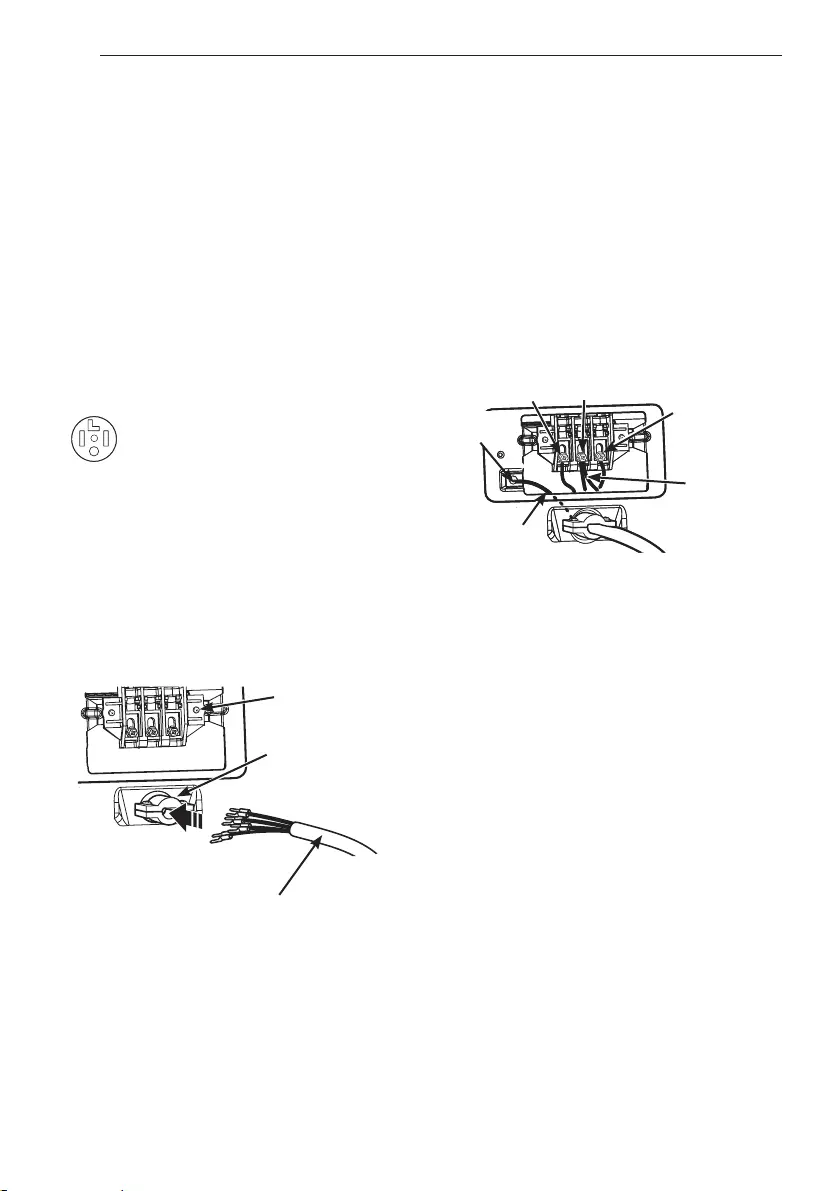
26 INSTALLATION
Connecting Electric Dryers (cont.)
USA only
wWARNING
•
fire or death.
•
Four-wire connection for electric dryers:
Power cord
• A 4-wire connection is required for all mobile and
manufactured home installations, as well as all new
construction after January 1, 1996.
• A UL-listed strain relief is required.
1. Remove the terminal block access cover on the upper
back of the dryer. Install a UL-listed strain relief into
the power cord through-hole; then thread a UL-listed,
conductor power cord through the strain relief.
•
conductor and closed loop or
forked terminals with upturned ends.
2. Transfer the dryer’s ground wire from behind the
green ground screw to the center screw of the
terminal block. Attach the two hot leads of the power
cord to the outer terminal block screws. Attach the
white neutral wire to the center terminal block screw.
Attach the power cord ground wire to the green
ground screw. .
Reinstall the terminal block access cover.
Hot
(Black)
Power Cord
Ground Wire
Ground
Screw
White Wire
moved from
Ground Screw
Neutral
(White)
Hot
(Red)
UL-Listed
Strain Relief
UL-Listed
4-Wire Power
Cord
Terminal
Block
MFL67731049_en_170714.indd 26 2017.7.14 2:24:21 PM
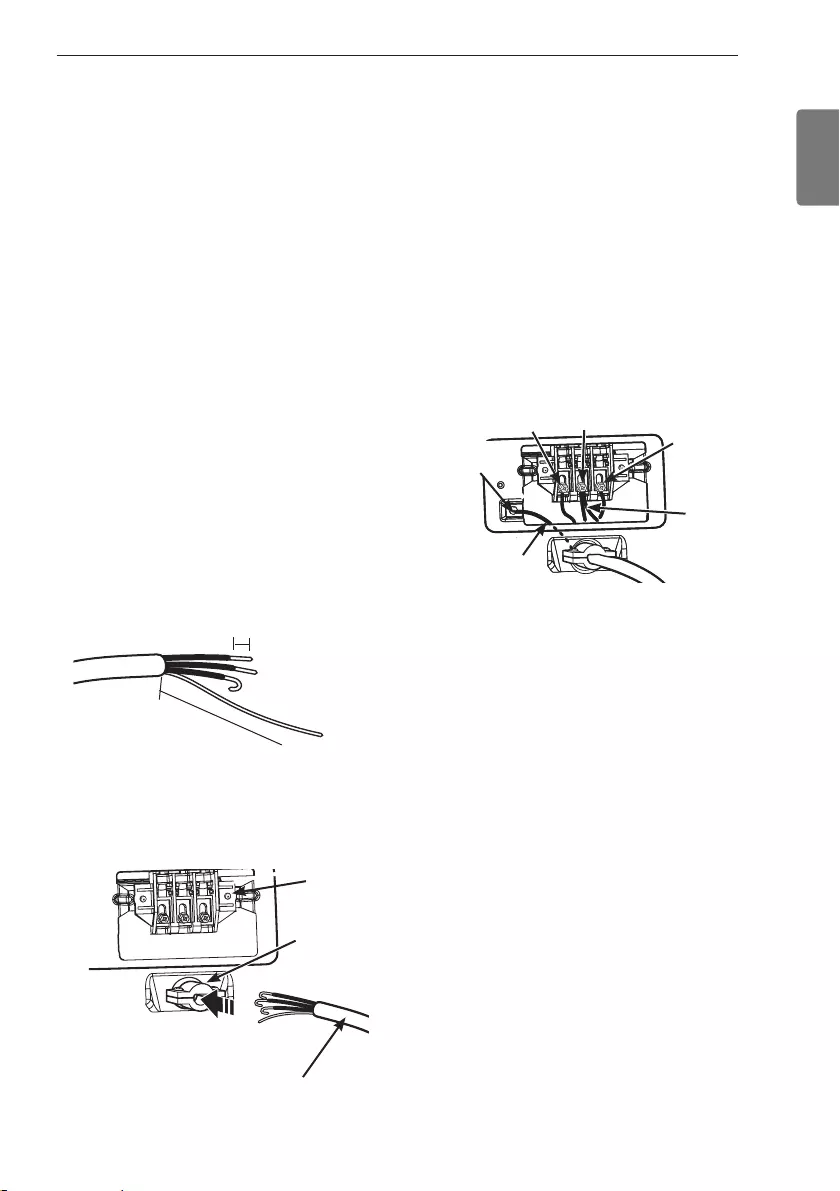
27
ENGLISH
INSTALLATION
wWARNING
•
•
Four-wire connection for electric dryers: Direct wire
• A 4-wire connection is required for all mobile and
manufactured home installations, as well as all new
construction after January 1, 1996.
• A UL-listed strain relief is required.
1. Remove 5 inches (12.7 cm) of the outer covering from
the wire. Remove 5 inches of insulation from the
ground wire. Cut off approximately 11⁄₂ inches (3.8 cm)
from the other three wires and strip 1 inch (2.5 cm)
insulation from each wire. Bend the ends of the three
shorter wires into a hook shape.
2. Remove the terminal block access cover on the upper
back of the dryer. Install a UL-listed strain relief into
the power cord through-hole; then thread the power
cable prepared in Step 1 through the strain relief.
Ground Wire
5"
(12.7 cm)
1" (2.5 cm)
Connecting Electric Dryers (cont.)
USA only
• Use UL-listed
conductor cable.
• Allow at least 5 ft. (1.5 m) length to allow for removal
and reinstallation of the dryer.
3. Transfer the dryer’s ground wire from behind the
green ground screw to the center screw of the
terminal block. Attach the two hot leads of the power
cable to the outer terminal block screws. Attach the
white neutral wire to the center terminal block screw.
Attach the power cable ground wire to the green
ground screw. .
Reinstall the terminal block access cover.
UL-Listed
Strain Relief
UL-Listed 4-Wire
Power Cord
Terminal
Block
Hot
(Black)
Power Cord
Ground Wire
Ground
Screw
White Wire
moved from
Ground Screw
Neutral
(White)
Hot
(Red)
MFL67731049_en_170714.indd 27 2017.7.14 2:24:22 PM
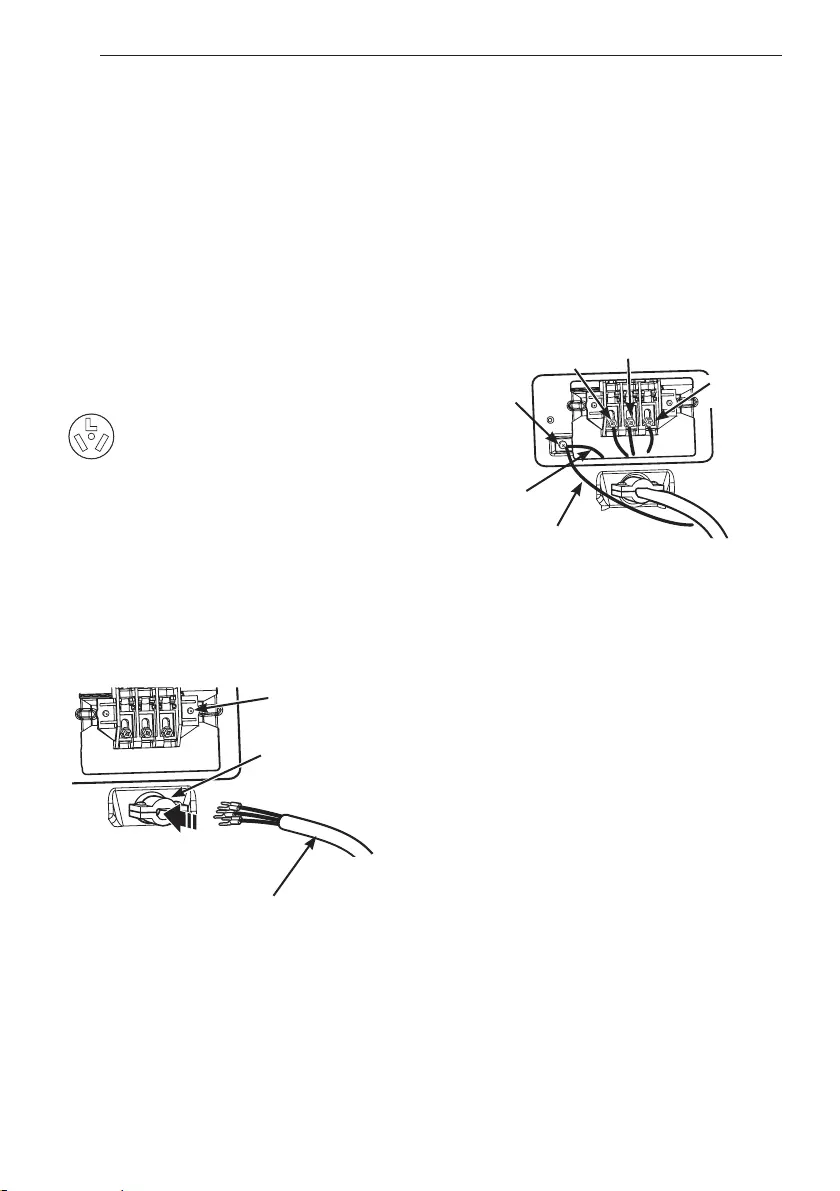
28 INSTALLATION
Connecting Electric Dryers (cont.)
USA only
wWARNING
•
•
Three-wire connection for electric dryers:
Power cord
• A 3-wire connection is NOT permitted on new
construction after January 1, 1996.
• A UL-listed strain relief is required.
1. Remove the terminal block access cover on the
upper back of the dryer. Install a UL-listed strain relief
into the power cord through-hole; then thread a UL-
listed,
conductor power cord through the strain
relief.
• Use a
conductor and closed loop or
forked terminals with upturned ends.
2. Attach the two hot leads of the power cord to the
outer terminal block screws. Attach the neutral wire to
the center terminal block screw. Connect the external
ground (if required by local codes) to the green
ground screw. .
Reinstall the terminal block access cover.
UL-Listed
Strain Relief
UL-Listed
3-Wire Power
Cord
Terminal
Block
Ground
Screw
Neutral
(White)
Hot
(Black)
Hot
(Red)
External Ground
Wire (If required
by local codes)
White Wire
from Dryer
harness
MFL67731049_en_170714.indd 28 2017.7.14 2:24:23 PM
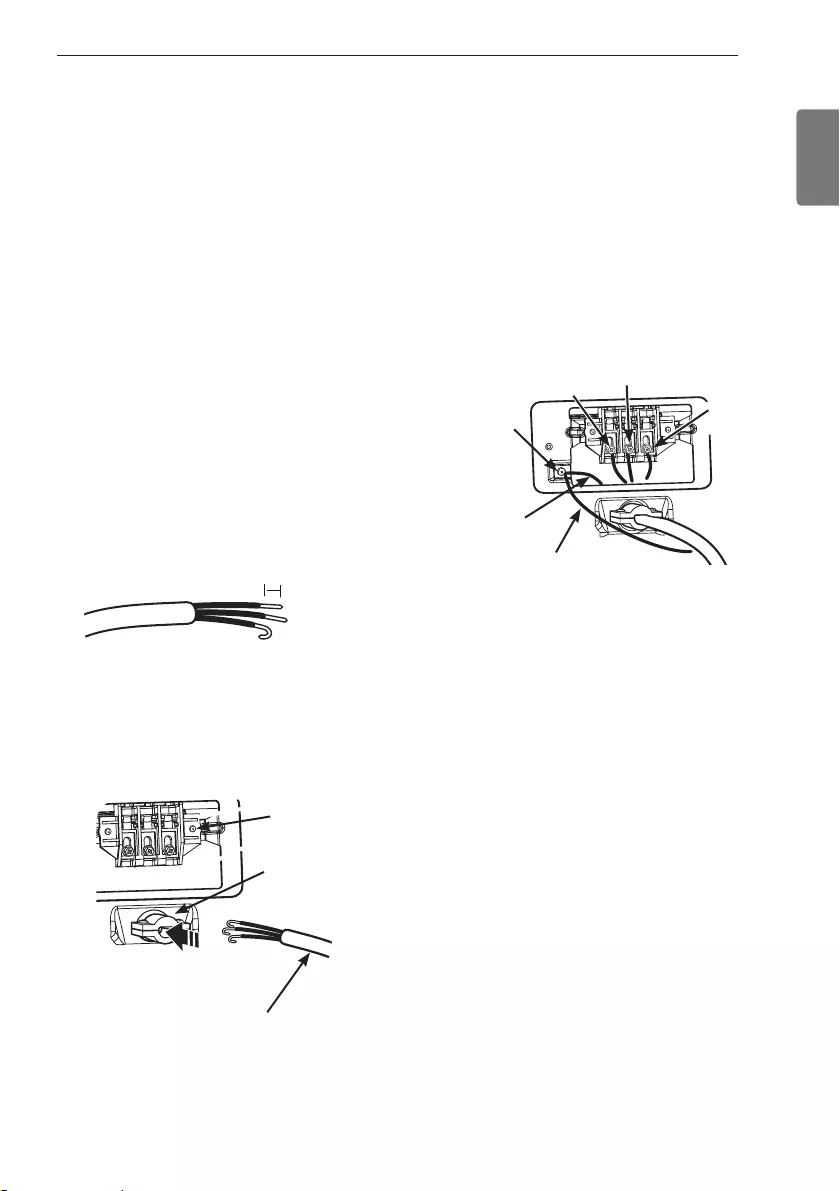
29
ENGLISH
INSTALLATION
Connecting Electric Dryers (cont.)
USA only
wWARNING
•
fire or death.
•
Three-wire connection for electric dryers: Direct wire
• A 3-wire connection is NOT permitted on new
construction after January 1, 1996.
• A UL-listed strain relief is required.
1. Remove 31⁄₂ inches (8.9 cm) of the outer covering from
the wire. Strip 1 inch (2.5 cm) insulation from each
wire. Bend the ends of the three wires into a hook
shape.
2. Remove the terminal block access cover on the upper
back of the dryer. Install a UL-listed strain relief into
the power cord through-hole; then thread the power
cable prepared in Step 1 through the strain relief.
• Use UL-listed
conductor cable.
• Allow at least 5 ft. (1.5 m) length to allow for removal
and reinstallation of the dryer.
3. Attach the two hot leads of the power cord to the
outer terminal block screws. Attach the neutral wire to
the center terminal block screw. Connect the external
ground (if required by local codes) to the green
ground screw. .
Reinstall the terminal block access cover.
1" (2.5 cm)
UL-Listed
Strain Relief
UL-Listed 3-Wire
Power Cord
Terminal
Block
Ground
Screw
Neutral
(White)
Hot
(Black)
Hot
(Red)
External Ground
Wire (If required
by local codes)
White Wire
from Dryer
harness
MFL67731049_en_170714.indd 29 2017.7.14 2:24:24 PM
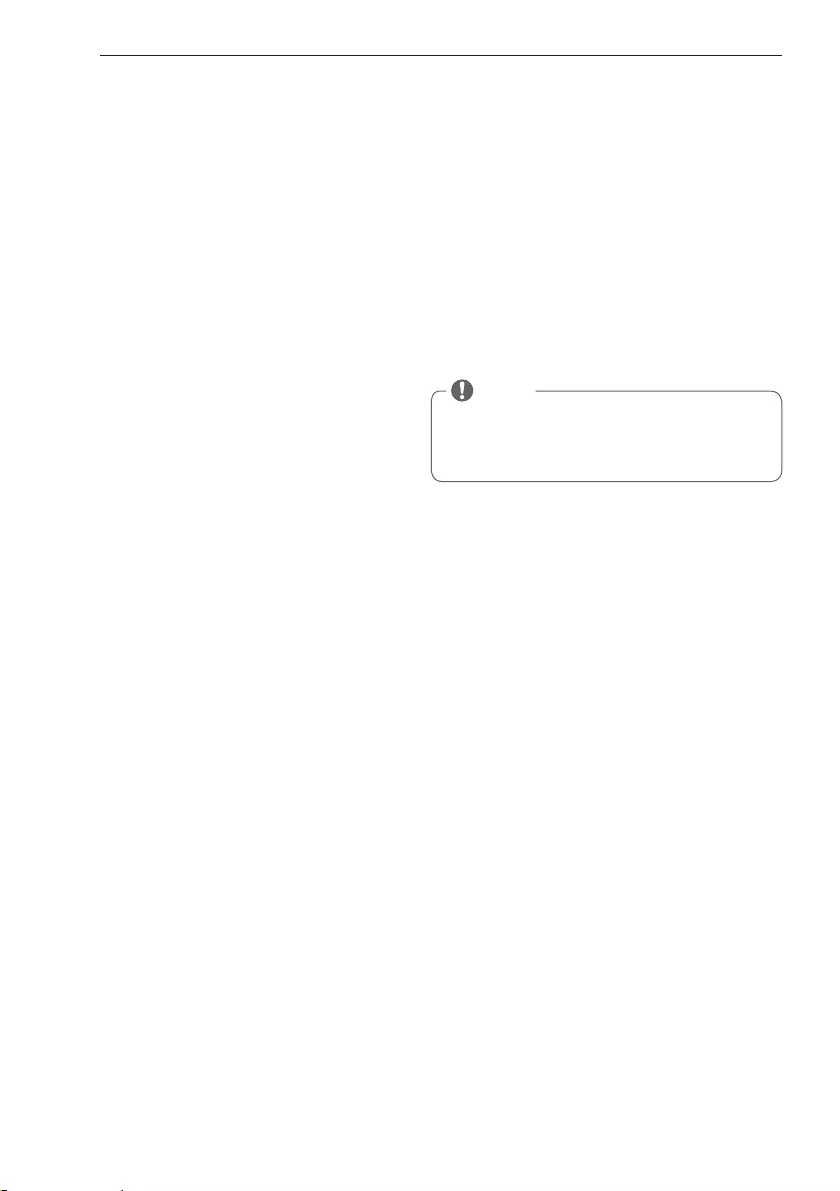
30 INSTALLATION
Special Requirements for
Manufactured or Mobile Homes
Any installation in a manufactured or mobile home must
comply with the Manufactured Home Construction and
Safety Standards Title 24 CFR, Part 3280 or Standard
CAN/CSA Z240 MH and local codes and ordinances. If
you are uncertain whether your proposed installation
will comply with these standards, please contact a
service and installation professional for assistance.
• A gas dryer must be permanently attached to the floor.
• The electrical connection for an electric dryer must
be a 4-wire connection. More detailed information
concerning the electrical connection is provided in the
section Connecting Electric Dryers.
• To reduce the risk of combustion and fire, the dryer
must be vented to the outside.
• DO NOT vent the dryer under a manufactured home or
mobile home.
• Electric dryers may be vented to the outside using the
back, left, right, or bottom panel.
• Gas dryers may be vented to the outside using the
back, left, or bottom panel. Gas dryers may not be
vented to the outside using the right side panel
because of the burner housing.
• The dryer exhaust duct must be affixed securely to
the manufactured or mobile home structure, and the
exhaust duct must be made of a material that will resist
fire and combustion.
It is recommended that you use a rigid, semi-rigid, or
flexible metal duct.
• DO NOT connect the dryer exhaust duct to any other
duct, vent, chimney, or other exhaust duct.
• Make sure the dryer has adequate access to outside
fresh air to ensure proper operation. The opening for
outside fresh air must be at least 25 in2 (163 cm2).
• It is important that the clearance of the duct from any
combustible construction be at least 2 inches (5 cm),
and when venting the dryer to the outdoors, the dryer
can be installed with a clearance of 1 inch (2.5 cm) at
the sides and back of the dryer.
• Please be aware that venting materials are not supplied
with the dryer. You should obtain the venting materials
necessary for proper installation.
Final Installation Check
Once you have completed the installation of the dryer
and it is in its final location, confirm proper operation
with the following tests and the Installation Test (Duct
Check) on the following page.
Testing Dryer Heating
Close the dryer door, press the ON/OFF button to turn
the dryer on, and start the dryer on a heat setting.
When the dryer starts, the igniter should ignite the main
burner.
Close the dryer door, press the ON/OFF button to turn
the dryer on, and start the dryer on a heat setting. The
exhaust air should be warm after the dryer has been
operating for 3 minutes.
Checking Airflow
Effective dryer operation requires proper airflow.
The adequacy of the airflow can be measured by
evaluating the static pressure. Static pressure in the
exhaust duct can be measured with a manometer,
placed on the exhaust duct approximately 2 ft. (60.9 cm)
from the dryer.
Static pressure in the exhaust duct should not exceed 0.6
inches (1.5 cm). The dryer should be checked while the
dryer is running with no load.
Checking Levelness
Once the dryer is in its final location, recheck the dryer
to be sure it is level. Make sure it is level from front to
back and side to side, and that all four leveling feet are
firmly on the floor.
NOTE
If all air is not purged from the gas line, the gas igniter
may turn off before the main burner ignites. If this
happens, the igniter will reattempt gas ignition after
approximately two minutes.
MFL67731049_en_170714.indd 30 2017.7.14 2:24:24 PM
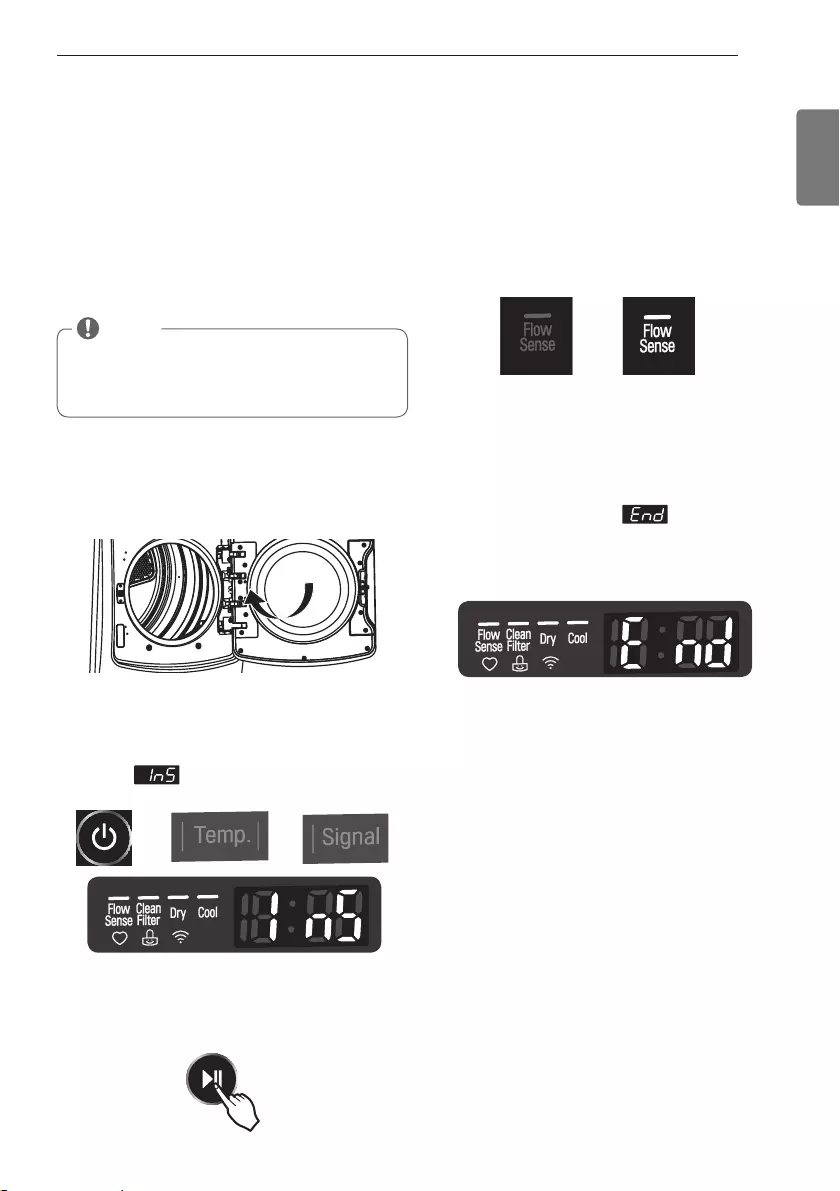
31
ENGLISH
INSTALLATION
Installation Test (Duct Check)
Once you have completed the installation of the dryer,
use this test to make sure the condition of the exhaust
system is adequate for proper operation of the dryer.
This test should be performed to alert you to any serious
problems in the exhaust system of your home.
• Your dryer features FLOW SENSETM, an innovative
sensing system that automatically detects blockages
and restrictions in dryer ductwork. Keeping ductwork
clean of lint buildup and free of restrictions allows
clothes to dry faster and reduces energy use.
1.
door.
Do not load anything in the drum for this test, as it
may affect the accuracy of the results.
2.
This button sequence activates the installation test.
The code will display if the activation is
successful.
3.
The dryer will start the test, which will last about
two minutes. The heat will be turned on and the
temperatures in the drum will be measured.
4.
During the test cycle, monitor the FLOW SENSETM
display on the control panel. If the Flow Sense
indicator text lights up, the exhaust system is
restricted. If the indicator text remains dark, the
exhaust system is adequate.
Other problems may also be shown with error codes.
Refer to the next page for error code details and
solutions.
Have the system checked immediately, as performance
will be poor.
5.
At the end of the test cycle, will display.
The test cycle will end and the dryer will shut off
automatically after a short delay.
NOTE
The dryer should be cool before starting this test. If
the dryer was warmed up during installation, run the
AIR DRY cycle for a few minutes to reduce the interior
temperature. DARK:
OK
LIGHTED:
RESTRICTED
MFL67731049_en_170714.indd 31 2017.7.14 2:24:39 PM
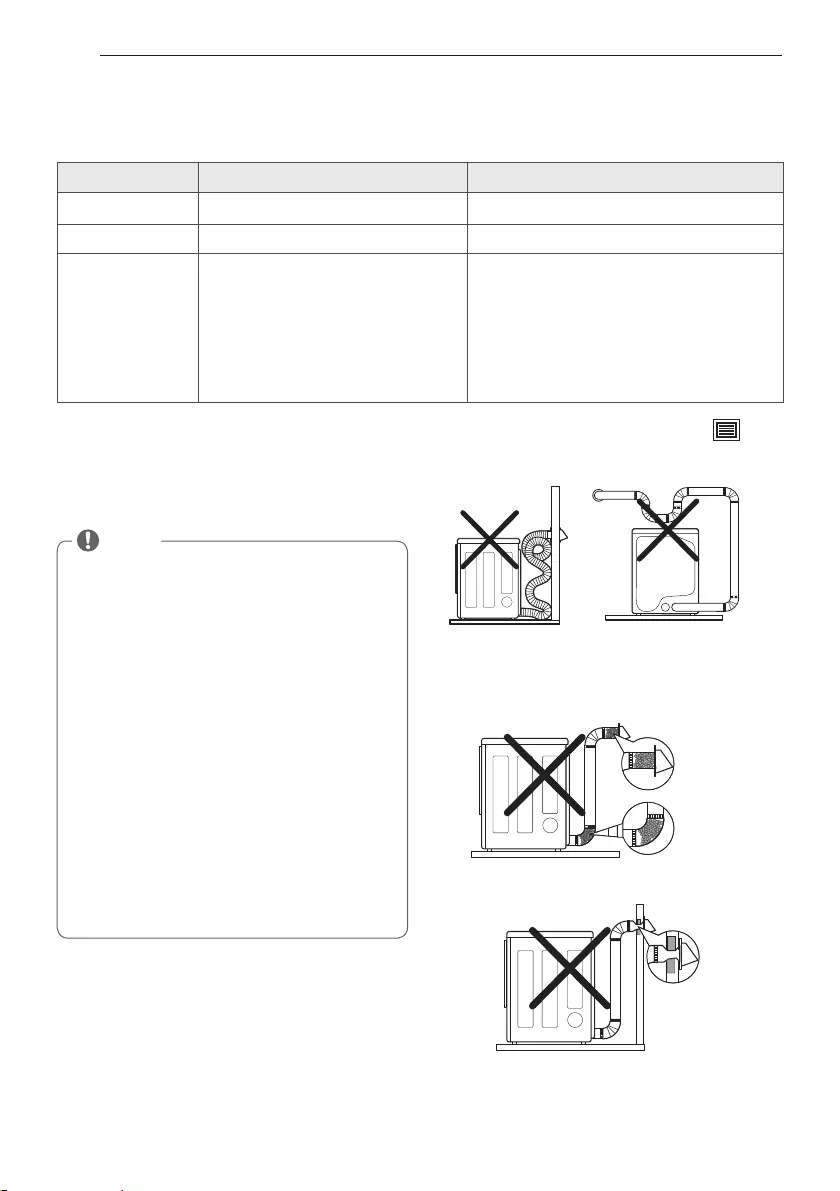
32 INSTALLATION
Installation Test (Duct Check) (cont.)
• Check the Error Code before you call for service
If the FLOW SENSETM LED is turned on, check the
exhaust system for restrictions and damage. Repair or
replace the exhaust system as needed.
Error Code Possible Causes Solutions
or
• Temperature sensor failure • Turn o the dryer and call for service.
• Humidity Sensor failure. • Turn o the dryer and call for service.
or
or
• Electric dryer power cord is not
connected correctly, or house power
supply is incorrect.
• House fuse is blown, circuit breaker has
tripped, or power outage has occurred.
• Check the power supply or the connection of
power cord to the terminal block. Refer to the
section of this
manual for complete instructions.
• Reset circuit breaker or replace fuse. Do not
increase the fuse capacity. If the problem is a
circuit overload, have it corrected by a quali-
ed electrician.
Avoid long runs or runs with multiple elbows or
bends.
Excess or crushed
transition duct
Too many elbows or
exhaust too long
Check for blockages and lint buildup.
Make sure the ductwork is not crushed or restricted.
Crushed or
damaged
exhaust
Lint buildup
or blockage
NOTE
When the dryer is rst installed, this test should be
performed to alert you to any existing problems with
the exhaust duct in your home. However, since the
test performed during normal operation provides
more accurate information on the condition of the
exhaust duct than does the installation test, the num-
ber of bars displayed during the two tests may not be
the same.
Do not interrupt the test cycle, as this could result in
inaccurate results.
Even if no bars are displayed during the test cycle,
some restrictions may still be present in the exhaust
system. Refer to the Venting the Dryer section of this
manual for complete exhaust system and venting
requirements.
Your dryer features Flow Sense™, an innovative sens-
ing system that automatically detects blockages and
restrictions in dryer ductwork. Keeping ductwork
clean of lint buildup and free of restrictions allows
clothes to dry faster and reduces energy use.
MFL67731049_en_170714.indd 32 2017.7.14 2:24:43 PM
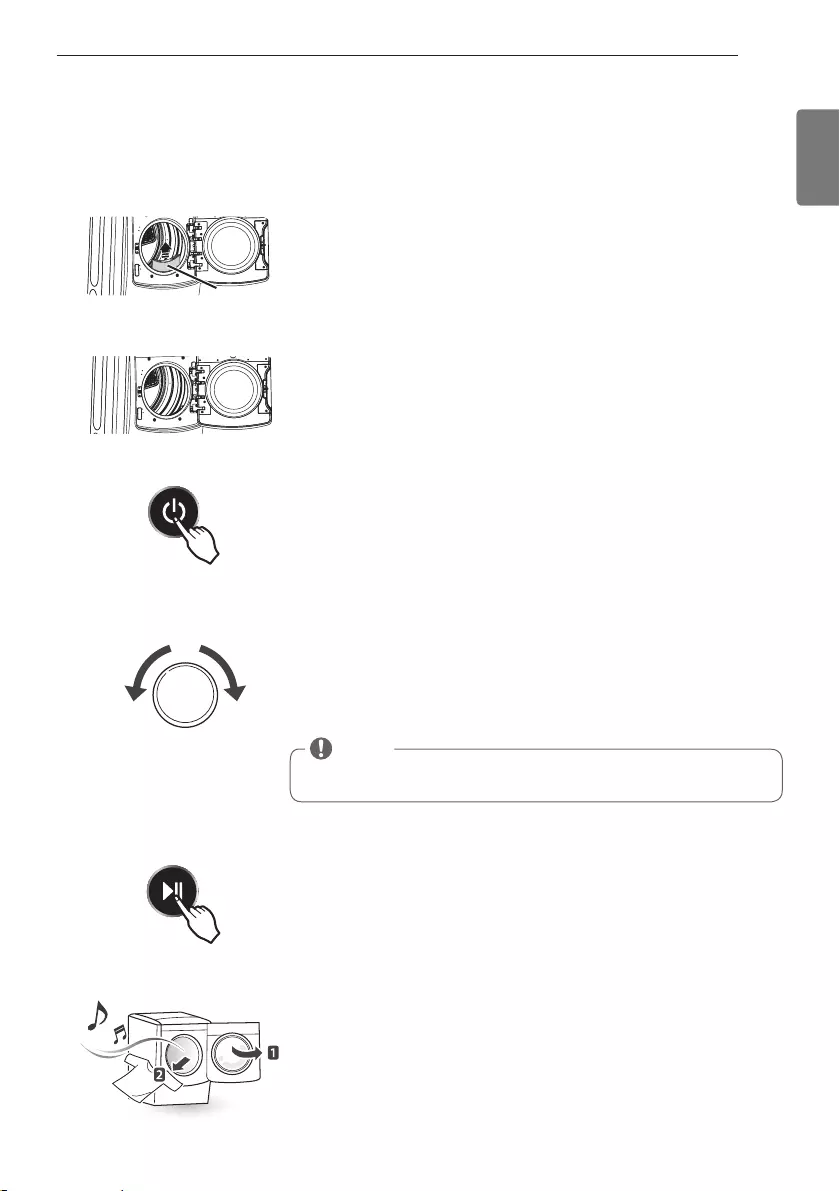
33
ENGLISH
OPERATION
OPERATION
Operating the Dryer
Press the POWER button to turn on the dryer. The cycle LEDs illuminate and a
signal sounds, if turned on. Refer to page 11.
3
Press the Hold to Start button to begin the cycle. The cycle can be paused at
any time either by opening the door or by pressing the Hold to Start button. If
the cycle is not restarted within 4 minutes, the dryer will shut off and the cycle
settings will be lost.
5
Turn the cycle selector knob in either direction until the LED for the desired
cycle is on. The preset temperature, dry level, and option settings for that cycle
will be shown. Refer to page 34. Default settings for the selected cycle can now
be changed if desired. This can be done using the cycle modifier buttons as
shown on page 37. Cycle options can be added using the option buttons as
shown on page 37-40.
4
NOTE
Not all options or modifiers are available on all cycles. A different chime will
sound and the LED will not come on if the selection is not allowed.
Load the dryer with the wet laundry from the washer. If the load is extra large,
you may need to divide it into smaller loads for proper performance and fabric
care.
2
If the lint filter has not already been cleaned, lift out the filter and remove the
lint from the last load. This will help ensure the fastest and most efficient drying
performance.
1
Lint Filter
When the cycle is finished, the chime will sound if it is set. Remove your
clothing from the dryer immediately to reduce wrinkling. If WRINKLE CARE
is selected, the dryer will tumble briefly every few minutes to help prevent
wrinkles from setting in the clothes.
6
MFL67731049_en_170714.indd 33 2017.7.14 2:24:51 PM
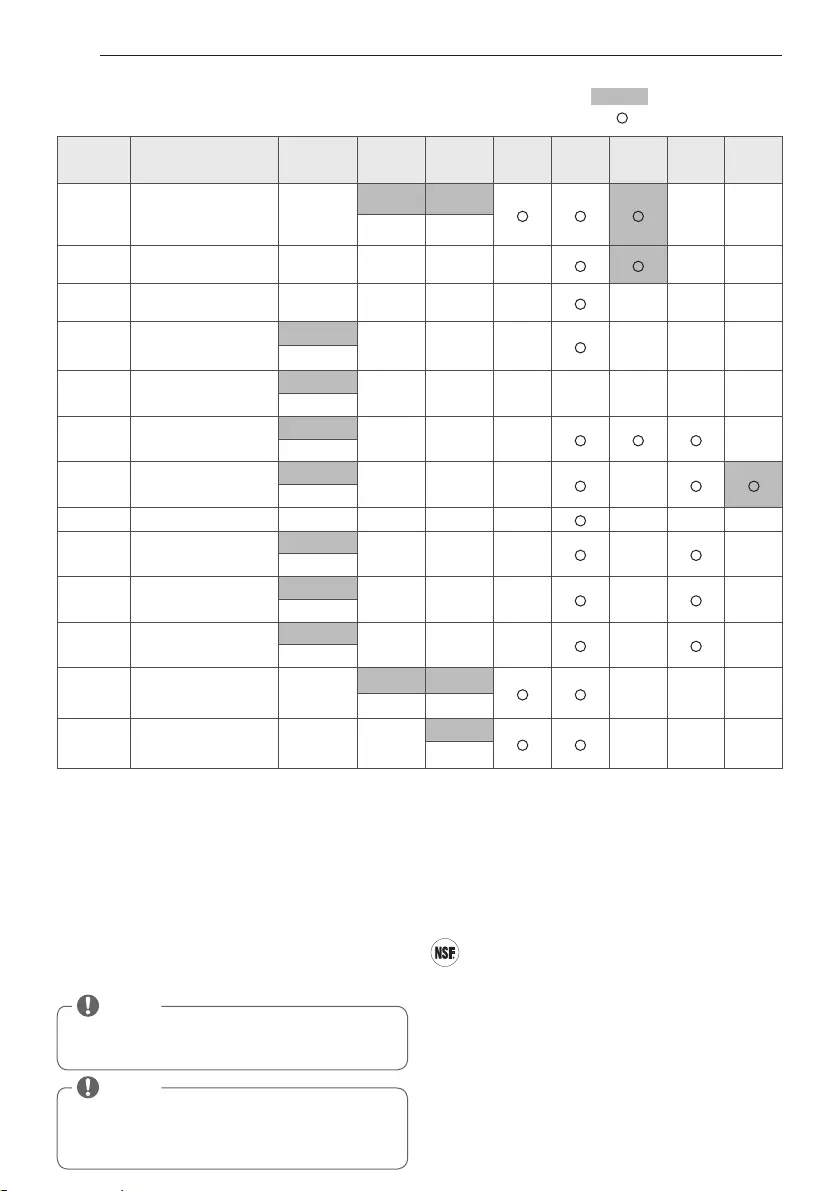
34 OPERATION
Cycle Guide
Sensor Dry Cycles
Sensor Dry cycles utilize LG’s unique dual sensor system to
detect and compare the moisture level in clothes and in the
air and adjust the drying time as needed to ensure superior
results. The dryer automatically sets the dryness level and
temperature at the recommended setting for each cycle.
The estimated time remaining will be shown in the display.
LowTemp Dry
This cycle can save energy over the Normal cycle,
depending on the load size. It may be necessary to adjust
the Dryness Level to achieve the desired amount of drying.
Manual Dry Cycles
Use Manual Dry cycles to select a specific amount of
drying time and a drying temperature. When a Manual
Dry cycle is selected, the ESTIMATED TIME REMAINING
display shows the actual time remaining in your cycle.
You can change the actual time in the cycle by pressing
MORE TIME or LESS TIME.
NSF International (formerly the National Sanitation
Foundation), certifies that the cycle
reduces 99.9% of bacteria on laundry, and none of the
bacteria will carry over onto the next laundry load.
• The default settings for the cycle are
temperature and .
These default settings cannot be changed.
• Do NOT use this cycle with delicate items or fabrics.
NOTE
To protect your garments not every dryness level,
temperature, or option is available with every cycle.
See the Cycle Guide for details.
NOTE
The Energy Saver option is turned on by default in the
Normal cycle.
Turn off the Energy Saver option for a faster Normal
cycle which begins with heated drying.
Steam
FreshTM
comforters, shirts,
trousers (except
especially delicate
fabrics)
Off
Mid High 10
Adjustable Adjustable
Steam
SanitaryTM comforters, bedding,
children’s clothing Off High
31
Anti
Bacterial Do not use this cycle
with delicate fabrics. Very High
70
LowTemp
Dry Only normal / towels
fabric type (Max 3lb)
Normal
High
50
Adjustable
Bedding comforters, pillows,
shirts
Normal
Medium
55
Adjustable
Heavy
Duty jeans,
heavyweight items
Normal
High
54
Adjustable
Normal work clothes,
corduroys, etc.
Normal
Medium
Elec : 57
Gas : 63
*
Adjustable
Sportswear
sportswear Off - 27
Perm.
Press permanent press,
synthetic items
More
Low
32
**
Adjustable
Delicates lingerie sheets,
blouses
Normal
Low
28
Adjustable
Towels denim, towels,
heavy cottons
Normal Mid High 55
Adjustable
Speed Dry For small loads
with short
drying times Off High
25
Adjustable Adjustable
Air Dry For items that require
heat-free drying such
as plastics or rubber Off Off
30
Adjustable
*
TurboSteam can only be selected if the Energy Saver is turned off.
**
TurboSteam can only be selected if the Very or More dry level is selected.
= default setting
= allowable option
MFL67731049_en_170714.indd 34 2017.7.14 2:24:53 PM

35
ENGLISH
OPERATION
Check the Lint Filter before Every
Load
Always make sure the lint filter is clean before starting a
new load; a clogged lint filter will increase drying times.
To clean, pull the lint filter straight up and roll any lint
off the filter with your fingers. Do not rinse or wash the
filter to remove lint. Push the lint filter firmly back into
place. See for more information.
Always ensure the lint filter is properly installed before
running the dryer. Running the dryer with a loose or
missing lint filter will damage the dryer and articles in
the dryer.
Storage Under the Lid
· Under the lid are three small storage spaces.
· To open the lid, slide it back.
wWARNING
Do not store flammable substances or adhesives under
the lid.
Sorting Loads
Fabric care labels
Most articles of clothing feature fabric care labels that
include instructions for proper care.
Grouping Similar Items
For best results, sort clothes into loads that can be dried
with the same drying cycle.
Different fabrics have different care requirements, and
some fabrics will dry more quickly than others.
Loading the Dryer
wWARNING
To reduce the risk of fire, electric shock, or injury
to persons when using this appliance, follow basic
precautions, including the following:
•
Failure to do so can result
in fire, explosion, or death.
•
Failure to obey this warning can result in fire, explosion,
or death.
NOTE
Loading tips
• Combine large and small items in a load.
• Damp clothes will expand as they dry. Do not
overload the dryer; clothes require room to tumble
dry properly.
• Close zippers, hooks, and drawstrings to prevent
these items from snagging or tangling on other
clothes.
Lint
Filter
Tumble
dry
Dry Normal Permanent Press
/
wrinkle resistant
Gentle/
delicate
Do not tumble dry Do not dry
(used with
do not wash)
Fabric care labels
Heat
setting
High Medium Low No heat/air
Tumble
dry
Dry Normal Permanent Press
/
wrinkle resistant
Gentle/
delicate
Do not tumble dry Do not dry
(used with
do not wash)
MFL67731049_en_170714.indd 35 2017.7.14 2:24:55 PM
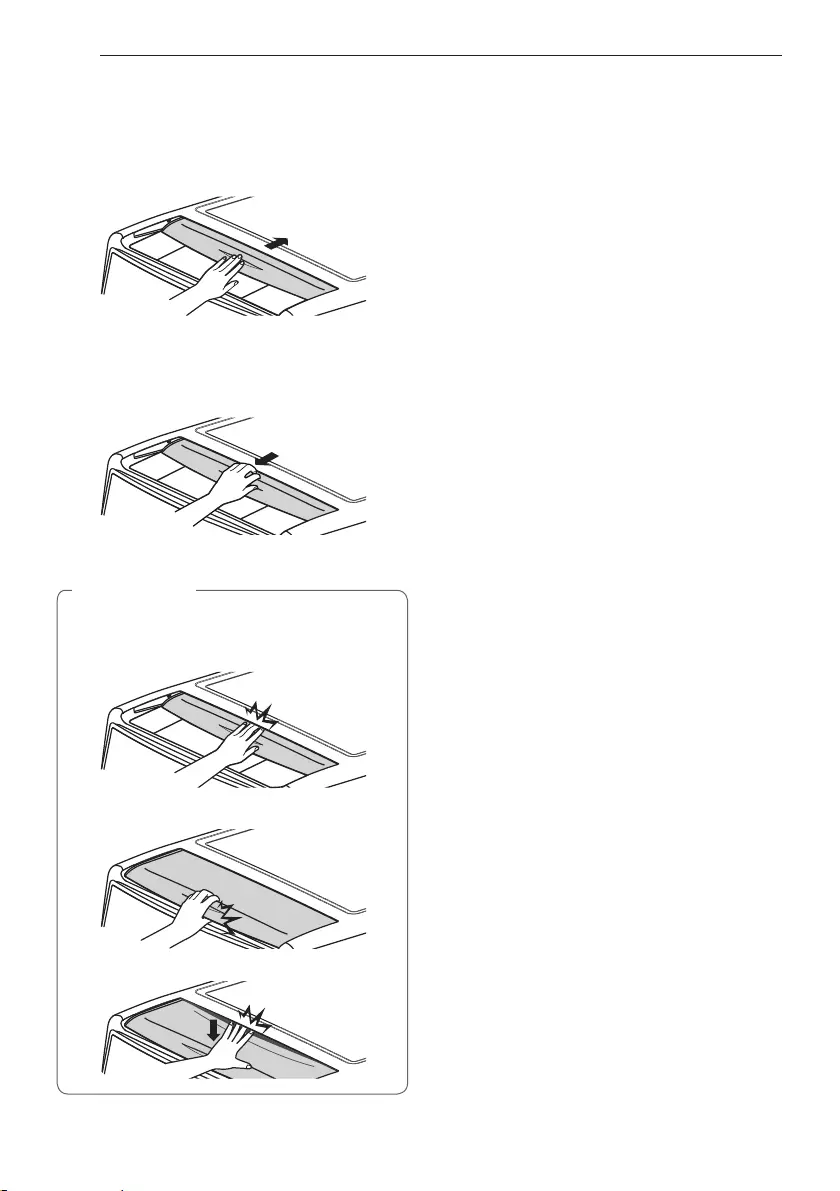
36 OPERATION
w
WARNING
• To avoid injury, do not place fingers under the lid or
between the lid and the cabinet when pressing or
sliding the detergent dispenser lid open or closed.
Using the Lid
- Push the front handle to slide the lid open.
- Pull the top of the handle to slide the lid closed.
MFL67731049_en_170714.indd 36 2017.7.14 2:24:56 PM
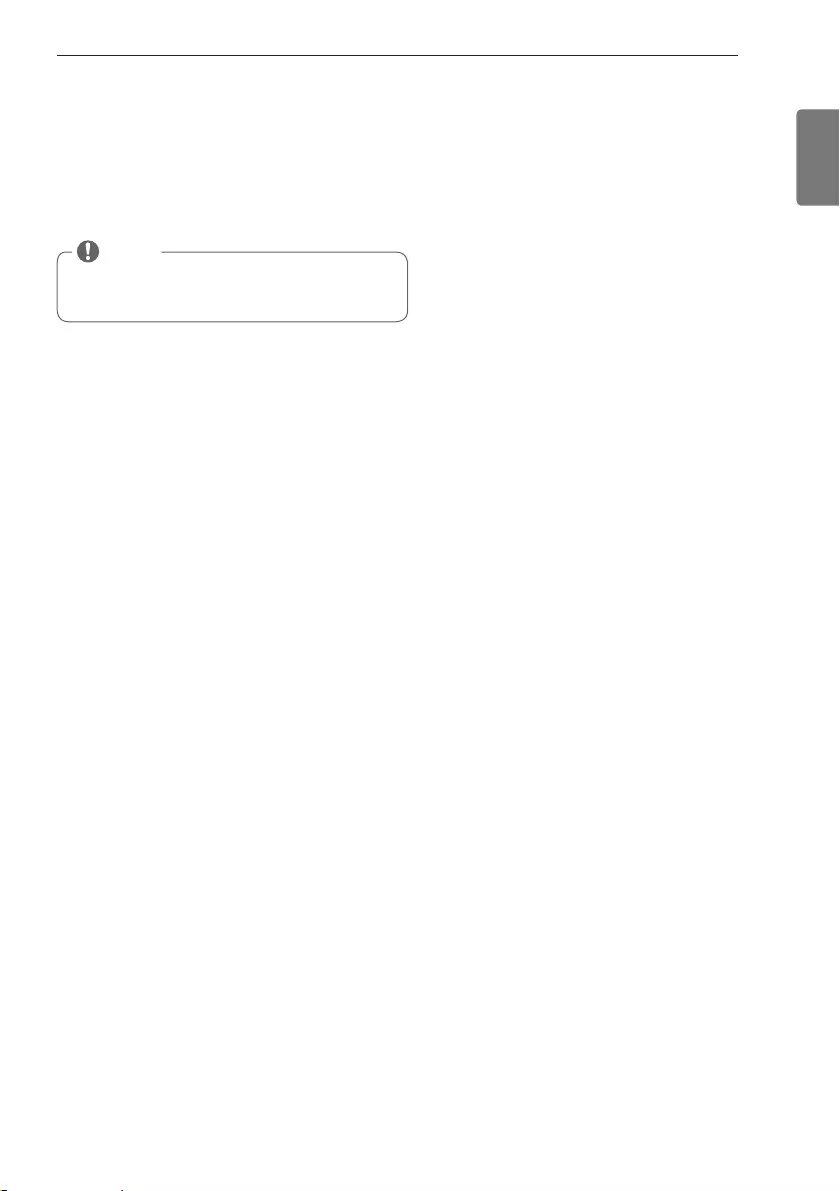
37
ENGLISH
OPERATION
Your dryer features several additional cycle options to
customize cycles to meet your individual needs. Certain
option buttons also feature a special function (see the
following page for details) that can be activated by
pressing and holding that option button for 3 seconds.
To Add Cycle Options to a Cycle:
1. Turn on the dryer and turn the cycle selector knob to
select the desired cycle.
2. Use the cycle modifier buttons to adjust the settings
for that cycle.
3. Press the cycle option button(s) for the option you
would like to add. A confirmation message is shown in
the display.
4. Press the Hold to Start button to start the cycle. The
dryer starts automatically.
SIGNAL
Adjusts the volume of the Signal or turns off the Signal.
Press the button repeatedly until the desired volume
setting is illuminated.
Cycle Modifier Buttons
SENSOR DRY cycles have preset settings that are
selected automatically. MANUAL DRY cycles have
default settings, but you may also customize the
settings using the cycle modifier buttons.
Press the button for that option to view and select other
settings.
DRY LEVEL
Selects the level of dryness for the cycle. Press the DRY
LEVEL button repeatedly to scroll through available
settings.
• This option is only available with SENSOR DRY cycles.
• The dryer will automatically adjust the cycle time.
Selecting MORE or VERY increases the cycle time, while
LESS or DAMP decreases the cycle time.
• Use a LESS or DAMP setting for items that you wish to
iron.
TEMP.
Adjusts the temperature setting from ULTRA LOW
to HIGH. This allows precise care of your fabrics and
garments. Press the TEMP. button repeatedly to scroll
through available settings.
TIME DRY
Allows you to manually select the drying time, from 20
to 60 minutes, in 10-minute increments. Use this for
small loads or to remove wrinkles. Use the MORE TIME/
LESS TIME buttons to add or reduce the drying time in
1-minute increments.
NOTE
To protect your garments, not every dryness level,
temperature, or option is available with every cycle.
See the Cycle Guide for details.
MFL67731049_en_170714.indd 37 2017.7.14 2:24:56 PM
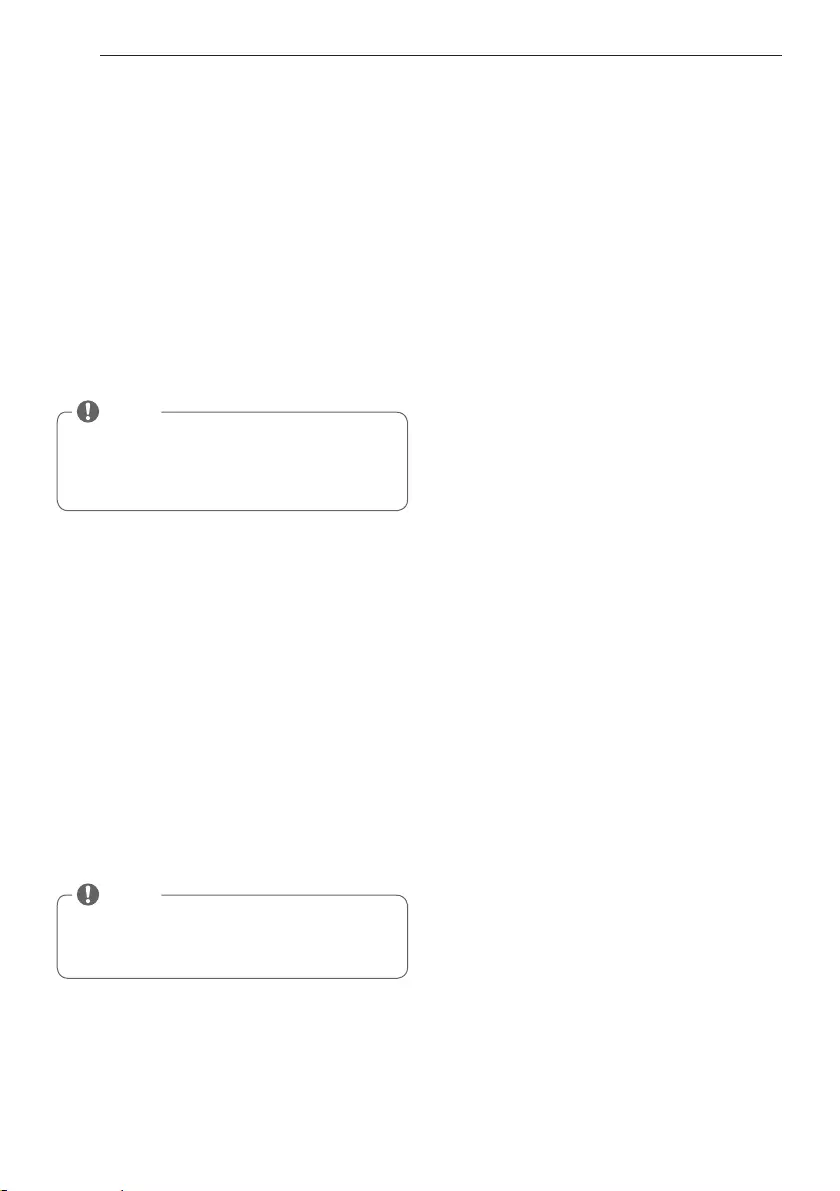
38 OPERATION
Special Functions
The option buttons also activate special functions,
including CHILD LOCK.
Select the option by pressing the option button. Press
and hold the option button to select special features
marked with the asterisk (*), such as Child Lock.
* CHILD LOCK
Use this option to prevent unwanted use of the dryer
or to keep cycle settings from being changed while the
dryer is operating.
Press and hold the button for 3 seconds to activate or
deactivate the CHILD LOCK function.
The CHILD LOCK icon is shown in the display, and all
controls are disabled except the POWER button.
DAMP DRY SIGNAL
With this option, the dryer signals when the load is
approximately 80% dry. This allows you to remove
faster- drying lightweight items or items that you would
like to iron or hang while still slightly damp. Press the
DAMP DRY SIGNAL button.
WRINKLE CARE
Selecting this option will tumble the load periodically for
up to 3 hours after the selected cycle, or until the door is
opened. This is helpful in preventing wrinkles when you
are unable to remove items from the dryer immediately.
ENERGY SAVER
This option helps to reduce the energy consumption in
the Normal cycle, depending on the load size.
When the Energy Saver option is selected, the cycle
begins with an air dry section and the drying time is
increased.
* Default On/Off
This option allows the Energy Saver settings to be
changed.
To turn the Energy Saver default off, press and hold the
Energy Saver button for three seconds.
ON or OFF appears in the display.
SMART GRID
Lower your energy costs when you dry your clothes by
avoiding peak usage times. See the Smart Connectivity
section for more information.
*REMOTE START
Use a smart phone to control the dryer remotely. See the
Smart Connectivity section for more information.
NOTE
Once set, CHILD LOCK remains active until it is
manually deactivated. CHILD LOCK must be turned off
to run another cycle.
To deactivate CHILD LOCK, press and hold the button
for three seconds.
NOTE
The Energy Saver option is turned on by default in the
Normal cycle.
Turn off the Energy Saver option for a faster Normal
cycle which begins with heated drying.
MFL67731049_en_170714.indd 38 2017.7.14 2:24:56 PM
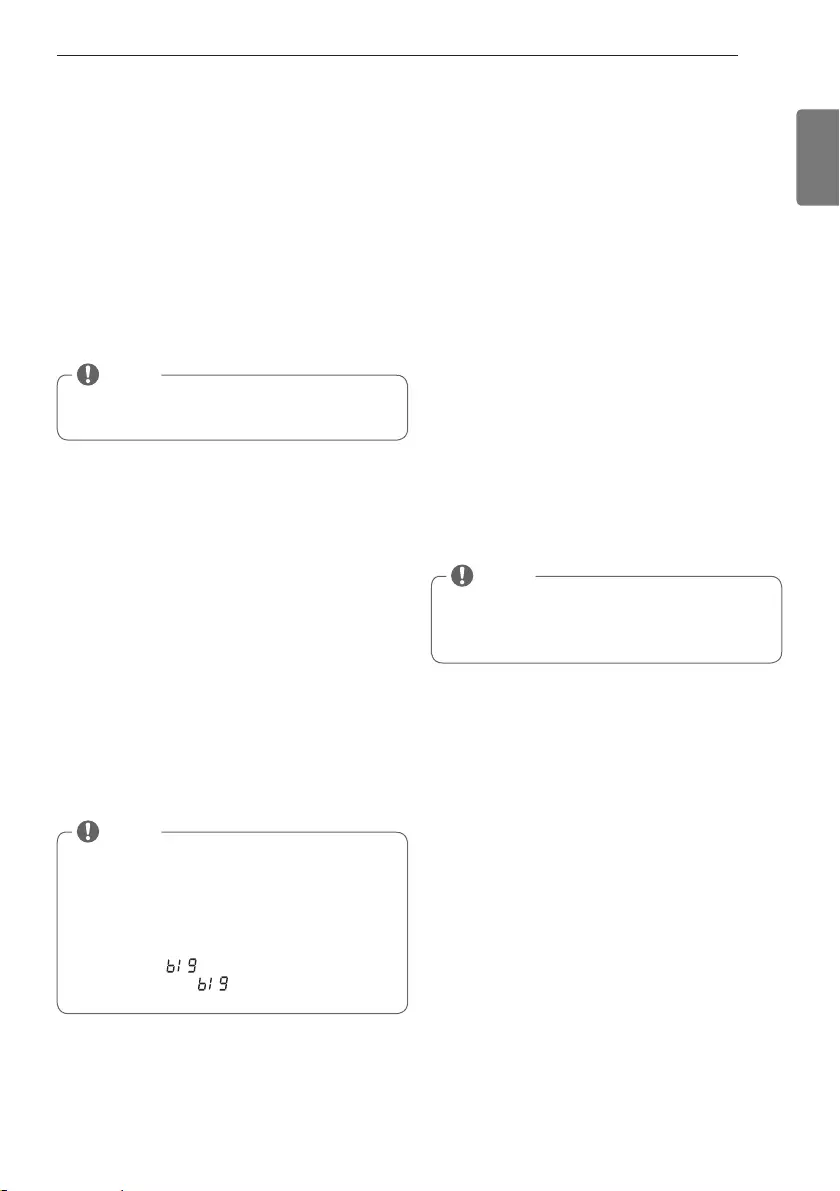
39
ENGLISH
OPERATION
Custom Program
If you have a special combination of settings that you
use frequently, you can save these settings as a CUSTOM
PROGRAM.
To Save a Custom Program:
1. Turn on the dryer and turn the cycle selector knob to
select the desired cycle.
2. Use the cycle modifier buttons to adjust the settings
for that cycle.
3. Press the cycle option button(s) for the option you
would like to add. A confirmation message will be
shown in the display.
4. Press and hold the PGM Save button for 3 seconds.
Recalling a Custom Program
1. Turn on the dryer.
2. Press the CUSTOM PGM button.
3. Press the Hold to Start button to start the cycle.
Steam Functions
LG’s new steam technology allows you to inject fabrics
with a swirling jet of hot steam to refresh clothes.
Simply select the STEAM FRESH™ cycle, or you can add a
steam option to selected cycles.
The STEAM FRESHTM Cycle
STEAM FRESH™ uses the power of steam to quickly
reduce wrinkles and odor in fabrics. It brings new life to
wrinkled clothes that have been stored for an extended
time and makes heavily wrinkled clothes easier to iron.
STEAM FRESH™ can also be used to help reduce odors in
fabrics.
NOTE
• The TurboSteam option is activated by default when
the Steam Fresh™ or Steam Sanitary™ cycles are
selected.
• Depending on the load (quantity of items), you may
change the amount of time for the cycle by pressing
the MORE TIME or LESS TIME button. The display will
show 1, 3, 5, or . 3 means 3 or fewer items, 5 is
for 4 or 5 items, and indicates a large load such
as a comforter.
Using the STEAM FRESHTM Cycle
1. Turn on the dryer and turn the cycle selector knob to
select the STEAM FRESH ™ cycle.
2. To add an option function, select TurboSteam, or
WRINKLE CARE.
3. Depending on the load (quantity of items), steam time
can be changed by pressing the MORE TIME or LESS
TIME buttons.
4. Press Hold to Start to start the cycle.
Adding STEAM to a Standard Cycle
1. Turn on the dryer and turn the cycle selector knob to
select the Normal, Perm. Press, or Heavy Duty cycle.
2. Use the cycle modifier buttons to adjust the settings
for that cycle.
3. Press the TurboSteam button.
4. Press Hold to Start to start the cycle.
The STEAM SANITARYTM Cycle
The STEAM SANITARYTM cycle is ideal for sanitizing non-
washable items quickly and easily using only steam.
This cycle is recommended for use with cotton and
polyester materials only. (Do NOT use for urethane foam,
down feathers or delicate items)
NOTE
• Turbo Steam can only be selected if the Energy Saver
is turned off.
• Turbo Steam can only be selected if the Very or More
dry level is selected.
NOTE
You may save only one custom program at a time.
Pressing and holding the PGM Save button will
overwrite any previously saved custom program.
MFL67731049_en_170714.indd 39 2017.7.14 2:24:57 PM
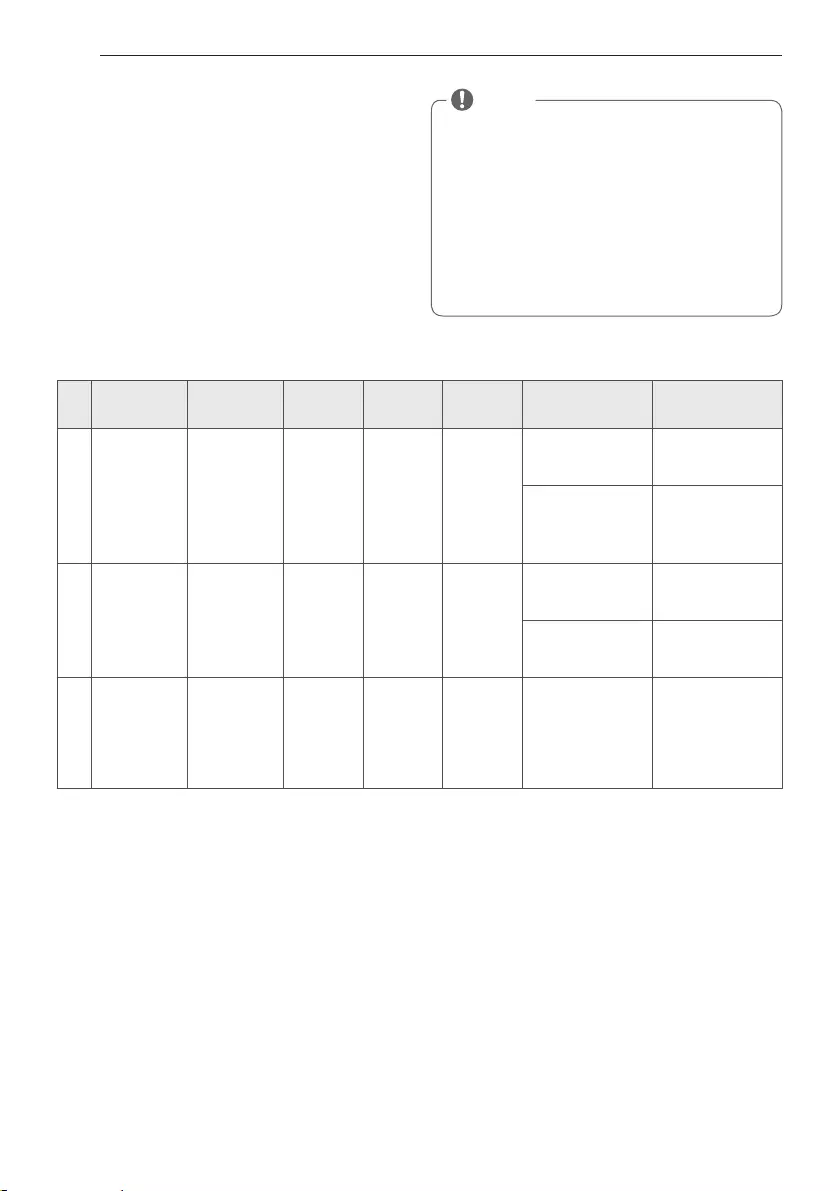
40 OPERATION
Steam Functions (cont.)
wWARNING
•
Failure to follow this warning can cause serious injury
or death.
•
Failure to follow this warning
can cause serious injury or death.
NOTE
• Steam may not be clearly visible during the steam
cycles. This is normal.
• Do not use Steam Fresh™ with items such as wool
clothing or blankets, leather jackets, silk, wet clothes,
lingerie, foam products, or electric blankets.
• For best results, load articles of similar size and fabric
type. Do not overload.
• When the filter/duct is clogged, the steam option
may not have optimal results.
• When the steam function is operating, the drum will
stop to allow steam to stay in the drum.
Steam Cycle Guide
31 minutes Dry
Comforter
Bedding Single (1 each)
Children’s
clothing 3 lbs.
10 minutes Dry
Comforter Single (1 each)
Shirts* 5 each
+
Follows
Selected
Cycle
Wet Varies by selected
cycle
8 lbs.
(18 Items)
*Shirt: 70% cotton/30% poly blend. Except especially delicate fabrics.
• When the lint filter or exhaust duct is clogged, steam options will not give proper results.
• For best results, load articles of similar size and fabric type. Do not overload.
MFL67731049_en_170714.indd 40 2017.7.14 2:24:57 PM

41
ENGLISH
SMART APPLIANCE CONNECTIVITY
SMART APPLIANCE CONNECTIVITY
Connectivity Overview
This smart appliance offers options for how you do laundry. Once it is connected to the internet through a home
Wi-Fi network, you can check the progress of a cycle and control the appliance remotely with the LG Smart Laundry
application for your smart phone.
The application can be set up to send push notifications when the cycle is complete or the appliance has problems.
It also provides a list of extra cycles available for download, and helps to troubleshoot problems by recording and
analyzing data from the appliance. The appliance has Smart Grid capability for areas where the utility company has
installed Smart Grid equipment. This feature adjusts the appliance operating times based on when electricity prices
are lower or delays operation when the demand for electricity is high.
Connectivity Setup
1. Run the Google Play Store on an Android smart
phone.
2. Search for LG Smart Laundry.
3. Press LG Smart Laundry on the resulting list.
4. Press INSTALL and ACCEPT to automatically install the
application. You can also check the progress through
the smart phone.
5. When the installation is complete, touch the icon to
access the application.
• LG Smart Laundry application for iOS devices will be
supported later.
You can skip these steps if you already have an LG
account at http://us.smartthinQ.com
1. Run the LG Smart Laundry application on a smart
phone.
2. Select Login at the bottom of the screen.
3. Select Create an account at the bottom of the screen.
4. On the next page, agree to the Terms and Conditions,
Privacy Policy, and LG Account Terms and Conditions.
After selecting I agree, press Confirm.
5. Next, in the e-mail box, enter your email address. This
will be your user ID. You will receive a confirmation
email for activating the account at that email address.
6. Enter a password. Passwords are case sensitive. The
password should be 6-12 characters. Remember
your ID and password. They will be used on the LG
Smart Laundry application to use Smart Appliance
Connectivity functions.
7. Enter your name.
8. Enter your mobile number.
9. Press the Subscribe button. The system will send you
an email containing a link to confirm your identity for
the account.
10. Press the CONFIRM button in the confirmation email,
and the website will display a confirmation page.
Your account is not set up.
1. Run the LG Smart Laundry application on a smart
phone.
2. Select Smart Appliance.
3. Select Dryer.
- If you see a pop-up message about NFC, press the
Cancel button.
4. Press the Wi-Fi model button at the bottom of the
screen.
5. Enter the email ID and password you registered. If you
don’t have an account at http://us.smartthinQ.com,
press the Create an Account button and create a user
ID and password.
6. Select the Login button.
7. On the next page, the application shows the Wi-
Fi network list. Select your home network. If your
network requires a key, enter the password and select
the Connect button.
8. If the application successfully connects to the home
network, turn on the dryer and then press and hold
the Wi-Fi Connect button on the dryer for three
seconds. After powering on the dryer, do not press
any other buttons before pressing and holding the Wi-
Fi Connect button. The Wi-Fi connection indicator on
the dryer blinks to indicate the machine is connecting.
MFL67731049_en_170714.indd 41 2017.7.14 2:24:57 PM
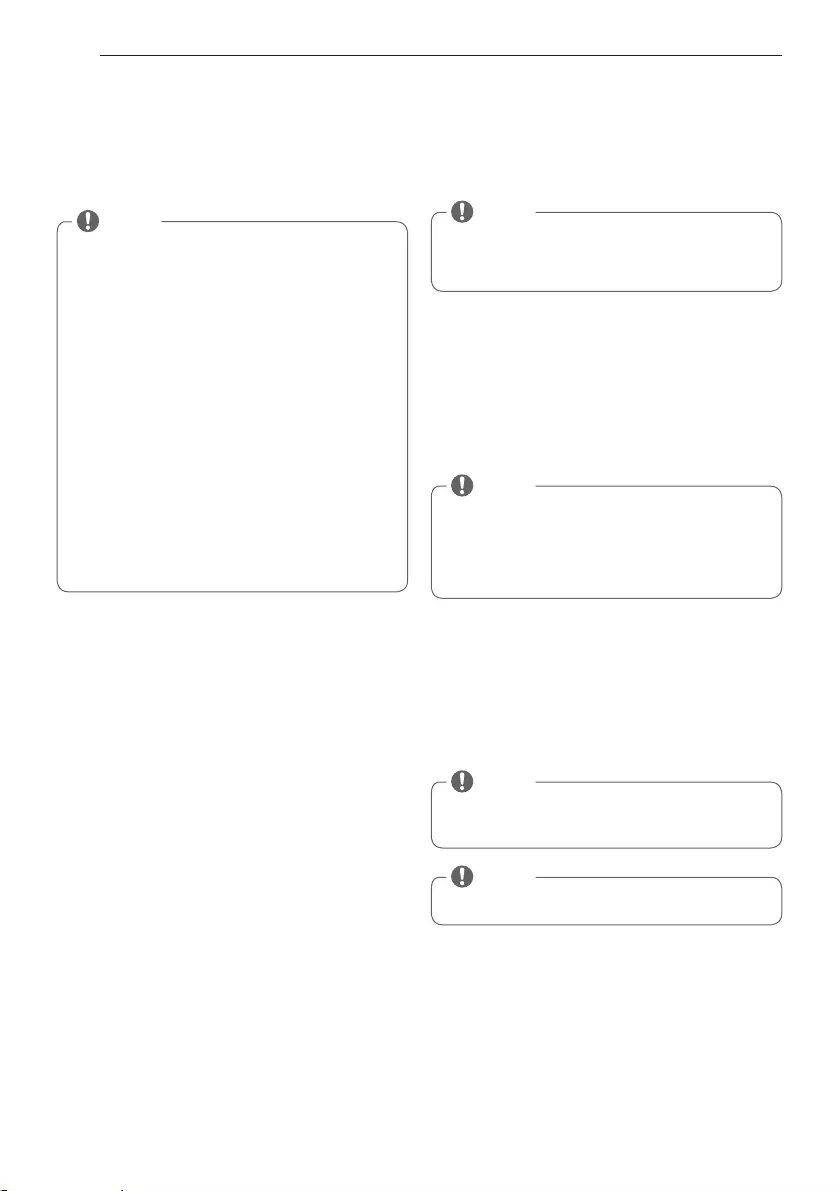
42 SMART APPLIANCE CONNECTIVITY
9. The application now works to connect the appliance
and register it as a Wi-Fi product. A notification
appears when the dryer is successfully set up and
the product registration and Wi-Fi setup is complete.
The Wi-Fi connection indicator illuminates when the
machine connects to the home network.
NOTE
• The machine supports 2.4 GHz Wi-Fi networks only.
• Use the Settings menu in the application to register or
change the machine. Select Settings > Change Product
> Add Product and then follow steps 2–9 above.
• If the router or the router’s password is changed, select
Settings > Change Product > Add Product and then
follow steps 2–9 above.
• If the appliance is having trouble connecting to the Wi-
Fi network, it may be too far from the router. Purchase
a Wi-Fi repeater (range extender) to improve the Wi-Fi
signal strength.
• The Wi-Fi connection may not connect or may
be interrupted because of the home network
environment.
• The network connection may not work properly
depending on the Internet service provider. The
surrounding wireless environment can make the
wireless network service run slowly.
• This information is current at the time of publication.
The application is subject to change for product
improvement purposes without notice to users.
Smart ThinQ™
Use a smart phone to control the appliance remotely. Or
monitor the cycle operation to see the remaining time
left in the cycle.
NOTE
• You must first connect to a gateway and register your
appliance in order to use the Remote Start function.
• The Remote LED on the control panel should be
illuminated.
1. Press and hold the Remote Start button. The Remote
LED on the control panel is illuminated if the
appliance is connected to a Wi-Fi network.
2. Start a cycle from the application on a smart phone.
If the cycle is not started, the machine will wait to
start the cycle until it is turned off remotely from the
application or the Remote Start mode is disabled.
NOTE
• Cycles and options cannot be selected at the
appliance when the machine is in Remote Start
mode.
• Press and hold the Remote Start button again to
enable the Remote Start mode when the appliance is
turned off or the Remote Start mode is released.
Reduce energy costs from drying clothes by avoiding
peak usage periods, with information supplied by your
local electric utility company.
If your utility company has equipped your home with
Smart Grid technology, you will need to contact the
utility company for information regarding the Smart
Grid features.
NOTE
• When Smart Grid is enabled, you may experience
delays or extended cycle times during peak usage
periods.
NOTE
• You must first connect to a gateway and register your
appliance in order to use the Smart Grid function.
MFL67731049_en_170714.indd 42 2017.7.14 2:24:58 PM
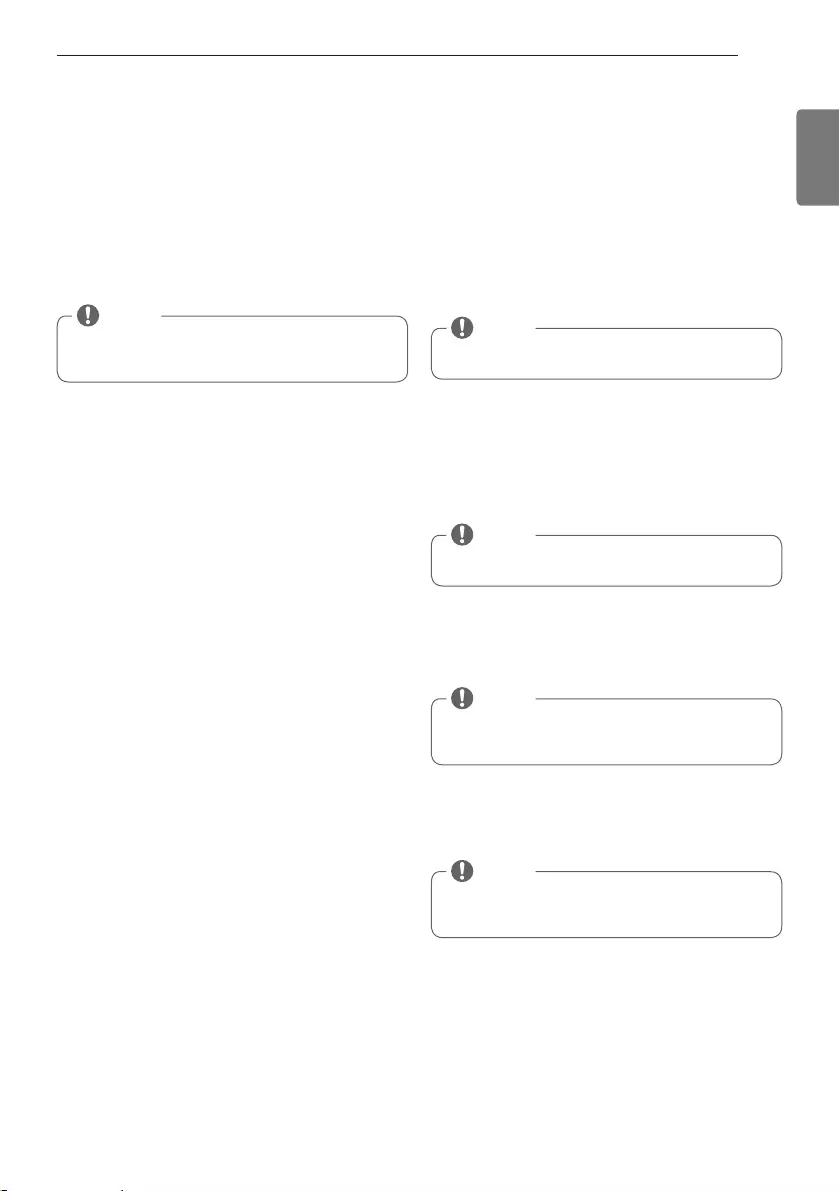
43
ENGLISH
SMART APPLIANCE CONNECTIVITY
The Download Cycle features of this appliance allow
you to download new and special cycles that are not
included in the basic cycles on the appliance.
Appliances that have been successfully registered can
download a variety of specialty cycles specific to the
appliance.
Only one cycle can be stored on the appliance at a time.
Once Cycle Download is completed in the dryer, the
product keeps the downloaded cycle until you change it
to a new download cycle.
NOTE
• You must first connect to a gateway and register
your appliance in order to use the Download cycle
function.
Use your phone to record the Smart Diagnosis™ signal if
you have problems with your appliance.
The application can analyze the signal and help you
solve the problem without waiting for a technician.
Cycle Set helps you choose the best cycle and settings
based on your laundry needs.
Once you have selected your cycle based on the Cycle
Set guide, the cycle and settings will be automatically
set.
NOTE
• Cycle Set function can be enabled when the Remote
Start button is activated.
Laundry Stats will tell you basic stats about your
appliance such as your cycle history and basic
maintenance timing.
Select Laundry Stats in the application to get the stats
and find out the dryer’s vent status.
NOTE
• You must first connect to a gateway and register your
appliance in order to use the Laundry Stats function.
When the cycle is complete or the appliance has
problems, you have the option of receiving push
notifications on your smart phone.
NOTE
• You must first connect to a gateway and register
your appliance in order to use the Smart Message
function.
Your dryer energy usage is affected by the cycle and
options so you may see some changes in energy usage
from one cycle to another.
NOTE
• You must first connect to a gateway and register
your appliance in order to use the Energy Monitoring
function.
MFL67731049_en_170714.indd 43 2017.7.14 2:24:58 PM
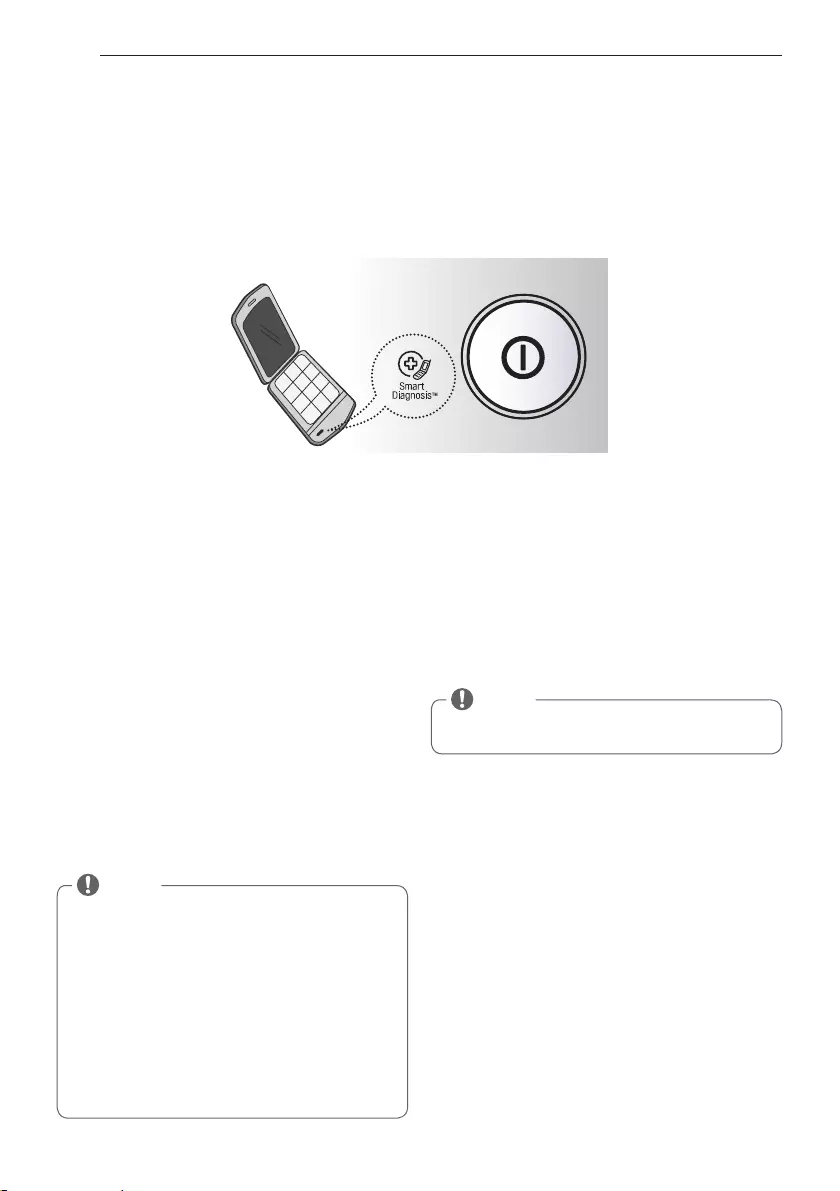
44 USING SMART DIAGNOSIS™
USING Smart DiagnosisTM
Audible Diagnosis
Should you experience any problems with your dryer, it has the capability of transmitting data to your Smart Phone
using the LG Smart Laundry Application or via your telephone to the LG call center.
Smart Diagnosis™ cannot be activated unless your dryer is turned on by pressing the Power button. If your dryer is
unable to turn on, then troubleshooting must be done without using Smart Diagnosis™.
Smart Diagnosis™ Using Your
Smart Phone
1. Download the LG Smart Laundry application on your
smart phone.
2. Open the LG Smart Laundry application on your
smart phone. Press the right arrow button to advance
to the next screen.
3. Press the Record button on the smart phone and then
hold the mouth piece of the smart phone near the
Smart Diagnosis™ logo on the dryer.
4. With the phone held in place, press and hold Temp.
button for three seconds.
5. Keep the phone in place until the tone transmission
has finished. It takes time on panel displayed.
6. When the recording is complete, view the diagnosis
by pressing the Next button on the phone.
Smart Diagnosis™ Through the Call
Center
1. Call the LG call center at: (LG U.S.) 1-800-243-0000
(LG Canada) 1-888-542-2623.
2. When instructed to do so by the call center agent,
hold the mouthpiece of your phone over the Smart
Diagnosis™ logo on the machine. Hold the phone no
more than one inch (but not touching) the machine.
3. Press and hold the Temp. button for three seconds.
4. Keep the phone in place until the tone transmission
has finished. It takes time on panel displayed.
5. Once the countdown is over and the tones have
stopped, resume your conversation with the call
center agent, who will then be able to assist you in
using the information transmitted for analysis.
NOTE
Smart Diagnosis™ is a troubleshooting feature
designed to assist, not replace, the traditional method
of troubleshooting through service calls. The
effectiveness of this feature depends upon various
factors, including, but not limited to, the reception
of the cellular phone being used for transmission,
any external noise that may be present during the
transmission, and the acoustics of the room where the
machine is located.
Accordingly, LG does not guarantee that Smart
Diagnosis™ would accurately troubleshoot any given
issue.
NOTE
Do not touch any other buttons or icons on the
display screen.
MFL67731049_en_170714.indd 44 2017.7.14 2:24:58 PM
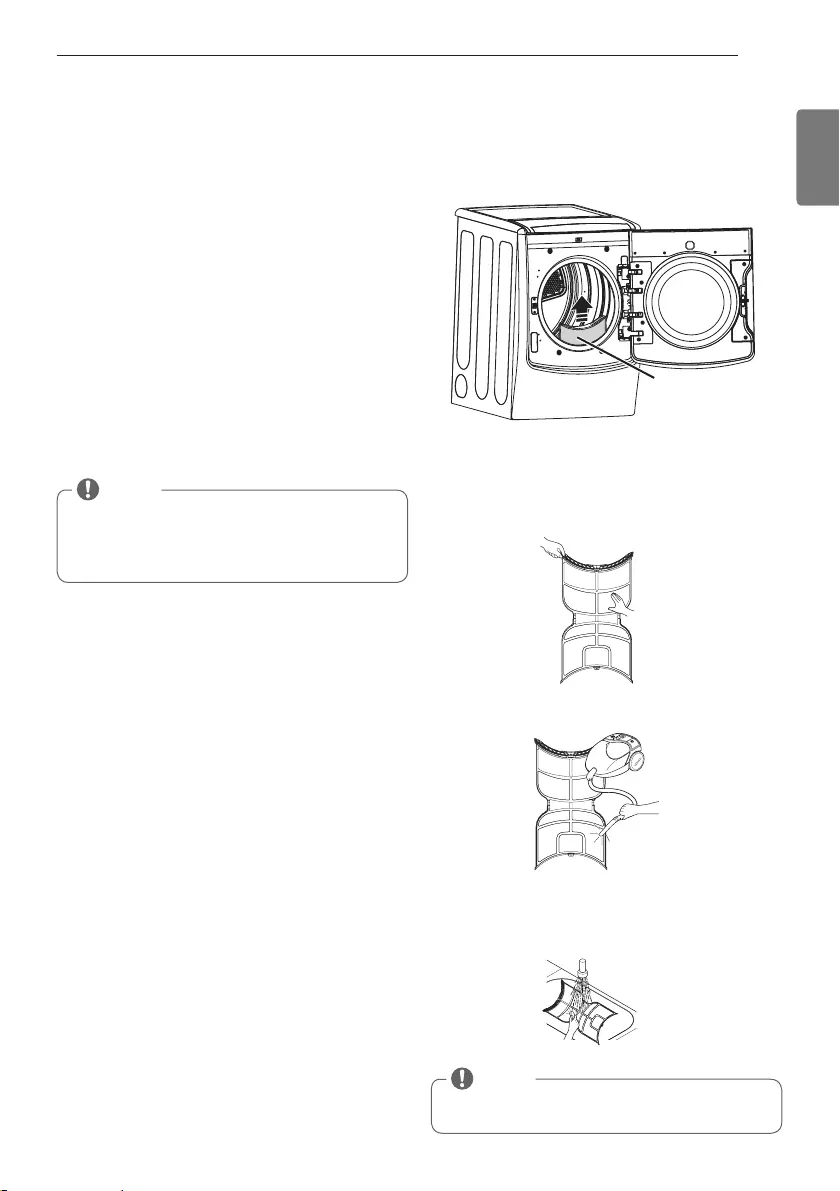
45
ENGLISH
MAINTENANCE
MAINTENANCE
Regular Cleaning
wWARNING
To reduce the risk of fire, electric shock, or personal
injury when using this appliance, follow basic
precautions, including the following:
•
Failure to follow this warning can
cause serious injury, fire, electrical shock, or death.
•
They will damage the
finish.
Cleaning the Exterior
Proper care of the dryer can extend its life.
The outside of the machine can be cleaned with warm
water and a mild, nonabrasive household detergent.
Immediately wipe off any spills with a soft, damp cloth.
Cleaning the Interior
Wipe around the door opening and seal with a soft,
damp cloth to prevent lint and dust buildup that could
damage the door seal.
Clean the window with a soft cloth dampened with
warm water and a mild, nonabrasive household
detergent; then wipe dry.
The stainless steel drum can be cleaned with a
conventional stainless steel cleaner, used according to
the manufacturer’s specifications.
Never use steel wool or abrasive cleansers; they can
scratch or damage the surface.
Cleaning Around and Under the Dryer
Vacuum lint and dust from around the dryer and
underneath it regularly. Vent ductwork should be
checked for lint buildup and cleaned at least once per
year. If any noticeable reduction in airflow or drying
performance occurs, immediately check ductwork for
obstructions and blockages.
Maintaining Ductwork
Vent ductwork should be checked for lint buildup
and cleaned at least once per year. If any noticeable
reduction in airflow or drying performance occurs,
immediately check ductwork for obstructions and
blockages. Contact a qualified technician or service
provider.
Cleaning the Lint Filter
Always clean the lint filter after every cycle.
To clean, open the dryer door and pull the lint filter
straight up. Then:
1. Roll any lint off the filter with fingers, or
2. Vacuum the lint filter, or
3. If the lint filter has become very dirty or clogged with
fabric softener, wash the lint filter in warm, soapy
water and allow to dry thoroughly before reinstalling.
NOTE
NEVER operate the dryer without the lint filter in
place. NEVER operate the dryer with a wet lint filter.
NOTE
Do not use methylated spirits, solvents, or similar
products.
Never use steel wool or abrasive cleansers; they can
damage the surface.
Lint
Filter
MFL67731049_en_170714.indd 45 2017.7.14 2:25:2 PM

46 TROUBLESHOOTING
TROUBLESHOOTING
Before Calling for Service
Your dryer is equipped with an automatic error-monitoring system to detect and diagnose problems at an early
stage. If your dryer does not function properly or does not function at all, check the following before you call for
service.
Dryer will not
turn on • Power cord is not properly
plugged in.
• House fuse is blown, circuit
breaker has tripped, or power
outage has occurred.
• Make sure that the plug is plugged securely into a
grounded outlet matching the dryer’s rating plate.
• Reset circuit breaker or replace fuse. Do not increase
fuse capacity. If the problem is a circuit overload, have it
corrected by a qualified electrician.
Dryer does not
heat • House fuse is blown, circuit
breaker has tripped, or power
outage has occurred.
• Gas supply or service turned off
(gas models only).
• Energy Saver option selected
• Reset circuit breaker or replace fuse. Do not increase
fuse capacity. If the problem is a circuit overload, have it
corrected by a qualified electrician.
• Confirm that the house gas shutoff and the dryer gas
shutoff are both fully open.
• If using the Cotton/Normal cycle, deselect the Energy
Saver option. The Energy Saver option is selected by
default. This option reduces energy use by adding an air
dry section to the beginning of the cycle. It is normal to
feel no heat at the beginning of the cycle while in Energy
Saver mode.
Greasy or
dirty spots on
clothes
• Fabric softener used incorrectly.
• Clean and dirty clothes being
dried together.
• Confirm and follow the instructions provided with your
fabric softener.
• Make sure to use your dryer to dry only clean items,
because dirty items can soil clean clothes placed in the
same or subsequent loads.
• Stains on dried clothes are actually stains that were not
removed during the washing process.
Make sure that clothes are being completely cleaned
according to the instructions for your washer and
detergent.
Display shows
error code tE1
or tE2
• Thermistor is malfunctioning. • Turn off the dryer and call for service.
Lint on clothes • Lint filter not cleaned properly.
• Laundry not sorted properly.
• Excess static in clothes.
• Dryer is overloaded.
• Tissue, paper, etc., left in pockets.
• Make sure the lint filter is cleaned before every load. With
some loads that produce high amounts of lint, it may be
necessary to clean the filter during the cycle.
• Some fabrics are lint producers (i.e., a fuzzy white cotton
towel) and should be dried separately from clothes that
are lint trappers (i.e., a pair of black linen pants).
• See the Excess static in clothes after drying section below.
• Divide larger loads into smaller loads for drying.
• Check pockets thoroughly before washing and drying
clothes.
Excess static in
clothes after
drying
• Fabric softener not used or used
incorrectly.
• Clothes dried too long
(overdried).
• Drying synthetics, permanent
press, or synthetic blends.
• Use a fabric softener to reduce static electricity correctly.
Do not use fabric softeners or products to eliminate static
unless recommended by the manufacturer of the fabric
softener or product.
• Overdrying a load of laundry can cause a buildup of static
electricity. Adjust settings and use a shorter drying time,
or use SENSOR DRY cycles.
• These materials can cause static buildup. Try using a fabric
softener.
Display shows
error code PS • Power cord connection is
incorrect. • Check the connection of power cord to the terminal block.
Refer to pages 26-29 in this manual.
MFL67731049_en_170714.indd 46 2017.7.14 2:25:3 PM

47
ENGLISH
TROUBLESHOOTING
Before Calling for Service (cont.)
Drying time is
not c onsistent • Heat settings, load size, or
dampness of clothing is not
consistent.
•
The drying time for a load will vary depending on the heat
setting, the type of heat used (electric, natural gas, or LP gas),
the size of the load, the type of fabrics, the wetness of the
clothes, and the condition of the exhaust ducts and lint filter.
Clothes take
too long to dry • Load is not properly sorted.
• Large load of heavy fabrics.
• Dryer controls are not set
properly.
• Lint filter needs to be cleaned.
• Exhaust ducts blocked, dirty, or
duct run is too long.
• House fuse is blown, circuit
breaker has tripped, or power
outage has occurred.
• Dryer is overloaded.
• Dryer is underloaded.
•
Energy Saver option selected
• Separate heavy items from lightweight items. Larger and
heavier items take longer to dry.
• Heavy fabrics take longer to dry because they tend to
retain more moisture. To help reduce and maintain more
consistent drying times for large and heavy fabrics,
separate these items into smaller loads of a consistent size.
• Use the appropriate control settings for the type of load
you are drying.
• Make sure the lint filter is cleaned before every load. With
some loads that produce high amounts of lint, it may be
necessary to clean the filter during the cycle.
• Confirm that the exhaust ductwork is properly configured
and free of debris, lint, and obstructions. Make sure that
outside wall dampers can open properly and are not
blocked, jammed, or damaged.
• Reset circuit breaker or replace fuse. Do not increase
fuse capacity. If the problem is a circuit overload, have it
corrected by a qualified electrician.
• Divide larger loads into smaller loads for drying.
• If you are drying a very small load, add a few extra items to
ensure proper tumbling action.
• If using the Cotton/Normal cycle, deselect the Energy Saver
option. This option reduces energy use by adding an air dry
section to the beginning of the cycle.
Clothes are
wrinkled • Clothes dried too long
(overdried).
• Clothes left in dryer too long
after cycle ends.
• Overdrying a load of laundry can lead to wrinkled clothes.
Try a shorter drying time, and remove items while they
still retain a slight amount of moisture.
• Remove items from the dryer immediately at the end
of the cycle. Use the WRINKLE CARE option to continue
tumbling clothes at the end of the cycle, for up to 3 hours.
Clothes are
shrinking • Garment care instructions are
not being followed. •
To avoid shrinkage, please carefully follow the fabric care
instructions for your garment, because some fabrics will
naturally shrink when washed. Other fabrics can be washed but
will shrink when dried in a dryer. Use a low or no heat setting.
indicator
light is on
during the
drying cycle
• Water supply error. • Check steam feeder drawer:
(1) Make sure steam feeder is filled with water to MAX line.
(2) Make sure steam feeder is seated properly and drawer is
fully closed.
(3) Turn the dryer off then restart the Steam cycle.
• Do not use distilled water; the water level sensor in the
steam generator will not work.
• The pump is not working. Unplug the dryer and call for
service.
Water drips
from nozzle
when Steam
Cycle starts
• This is normal. • This is steam condensation. The dripping water will stop
after a short time.
The display
shows “d80”,
“d90”, “d95”
• The duct work is about 80%,
90%-95% blocked.(“d80”, “d90”
or “d95” error code displayed 2
hours only)
• House exhaust system blocked.
•
Using the dryer with a
severely restricted exhaust is dangerous and could result
in a fire or other property damage.
• Check the outside dryer vent while the dryer is operating
to make sure there is strong airflow.
• If the exhaust system is extremely long, have it repaired or
rerouted.
• Keep the area around the dryer clean and free of clutter.
• Check the vent hood for damage or lint clogging.
• Make sure the area around the vent hood is clear.
MFL67731049_en_170714.indd 47 2017.7.14 2:25:3 PM

48 TROUBLESHOOTING
Before Calling for Service (cont.)
Steam does not
generate but
no error code is
shown
• Water level error. • Unplug dryer and call for service.
Garments still
wrinkled after
STEAM FRESH™
• Too many or too different types
of garments in dryer. • Small loads of 1 to 5 items work best.
• Load fewer garments. Load similar-type garments.
There are no
creases left on
garment after
STEAM FRESH™
• The function of this cycle is to
remove wrinkles from fabric. • Use an iron to make creases.
Water drips from
door during
Steam Cycle
• This is normal. • Condensation will normally form on the inside of the
dryer door during steam operation. Some condensation
may drip out the bottom of the door.
Steam is not
visible during
Steam Cycle
• This is normal. • Steam vapor is difficult to see when the door is closed.
However, condensation will normally form on the
inside of the dryer door if the steam system is operating
normally.
Drum does not
turn during
Steam Cycle
• This is normal. • The drum is turned off so that the steam vapor remains
in the drum. The drum will normally turn for about 2
seconds once a minute.
Cannot see
steam vapor at
the beginning of
cycle
• This is normal. • Steam is released at different stages of the cycle for each
option.
The display
shows • MORE TIME button pressed. • This display indicates that the steam option has been set
for a “ ” item such as a comforter.
Press the LESS TIME button to reduce the indicated load
size.
Odors remain
in clothing after
STEAM FRESH™
• STEAM FRESH™ did not remove
odor completely. • Fabrics containing strong odors should be washed in a
normal cycle.
CHECK FILTER
light is on during
the drying cycle
• Lint filter is almost clogged or
full. • Pause the drying cycle and clean the lint filter.
FLOW SENSETM
indicator shows
four bars during
the drying cycle
or the display
shows “d80” after
drying.
• Ductwork is too long or has too
many turns/restrictions.
• Significant blockage of the
ductwork due to lint buildup or
debris.
• The appliance has detected a
restriction in the external dryer
venting.
• Install a shorter or straighter duct run. See the Installation
Instructions.
• Ductwork should be checked/cleaned soon.
Dryer can be used in this condition, but drying times may
be longer.
• If exhaust restrictions are sensed by the Flow SenseTM
system, the indicator will remain on for two hours after
the end of the cycle. Opening the door or pressing the
Power button will turn off the display.
MFL67731049_en_170714.indd 48 2017.7.14 2:25:3 PM
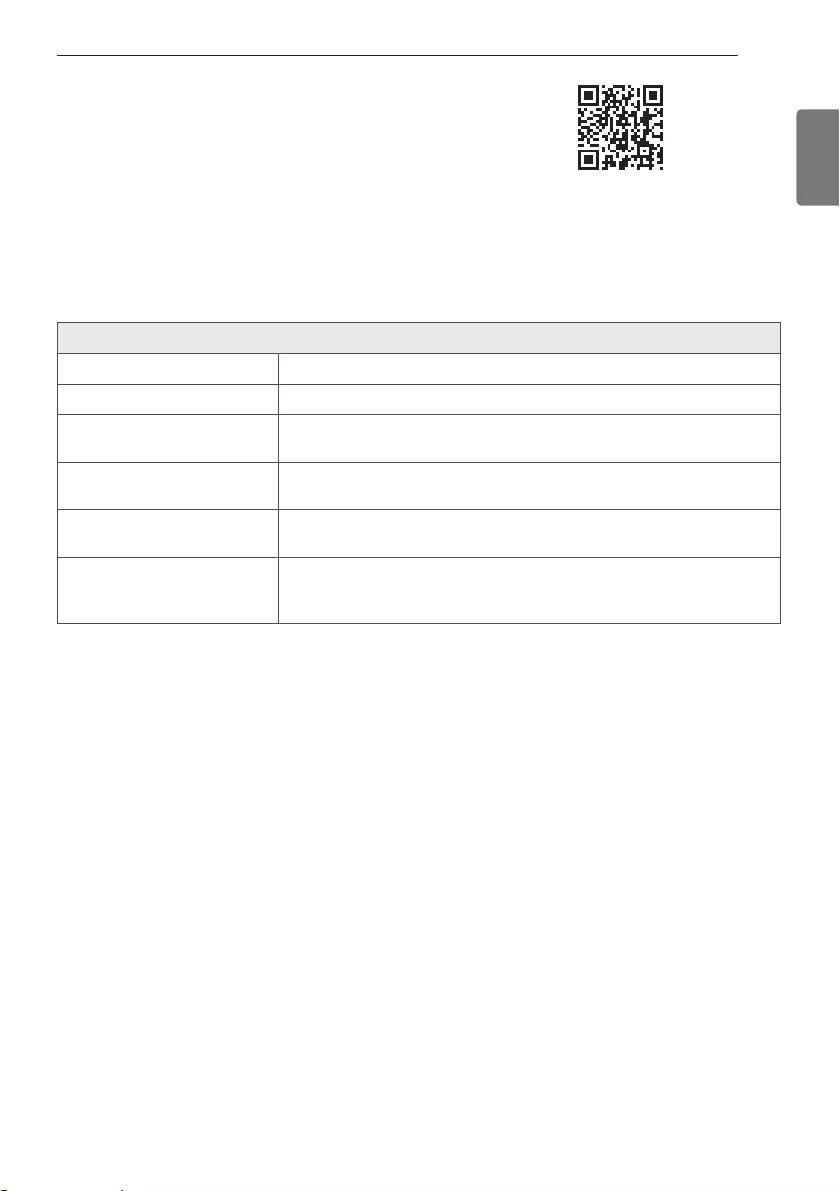
49
ENGLISH
SPECIFICATIONS
Description Steam Dryer
Electrical Requirements Please refer to the rating label regarding detailed information.
Gas Requirements NG: 4-10.5 inches WC
LP: 8–13 inches WC
Dimensions 27”(W) X 31 1/8”(D) X 38 11/16”(H), 54” (D with door open)
68.6 cm (W) X 79.0 cm (D) X 98.3 cm (H), 137.2 cm (D with door open)
Net Weight Gas dryer : 151.7 lbs(68.8 kg)
Electric dryer : 148.6 lbs(67.4 kg)
Drying Capacity
- Normal Cycle
- Steam Cycle
IEC 7.4 cu.ft. (22.5 lbs/10.2 kg)
IEC 7.4 cu.ft. (8 lbs/3.6 kg)
SPECIFICATIONS
User Support Videos
For further assistance, there are videos and Tutorials available
through the LG.com website.
1. For further assistance, there are videos and tutorials available
through the LG.com website.
On the lg.com/us home page, hover over the Support menu
tab to bring up the menu selections. Select Videos & Tutorials.
2. Type Dryer in the search box on the new page and click the
Search button.
Scan this QR code to quickly access the video
Search page on the LG website. Once there,
type Dryer in the search box.
MFL67731049_en_170714.indd 49 2017.7.14 2:25:4 PM
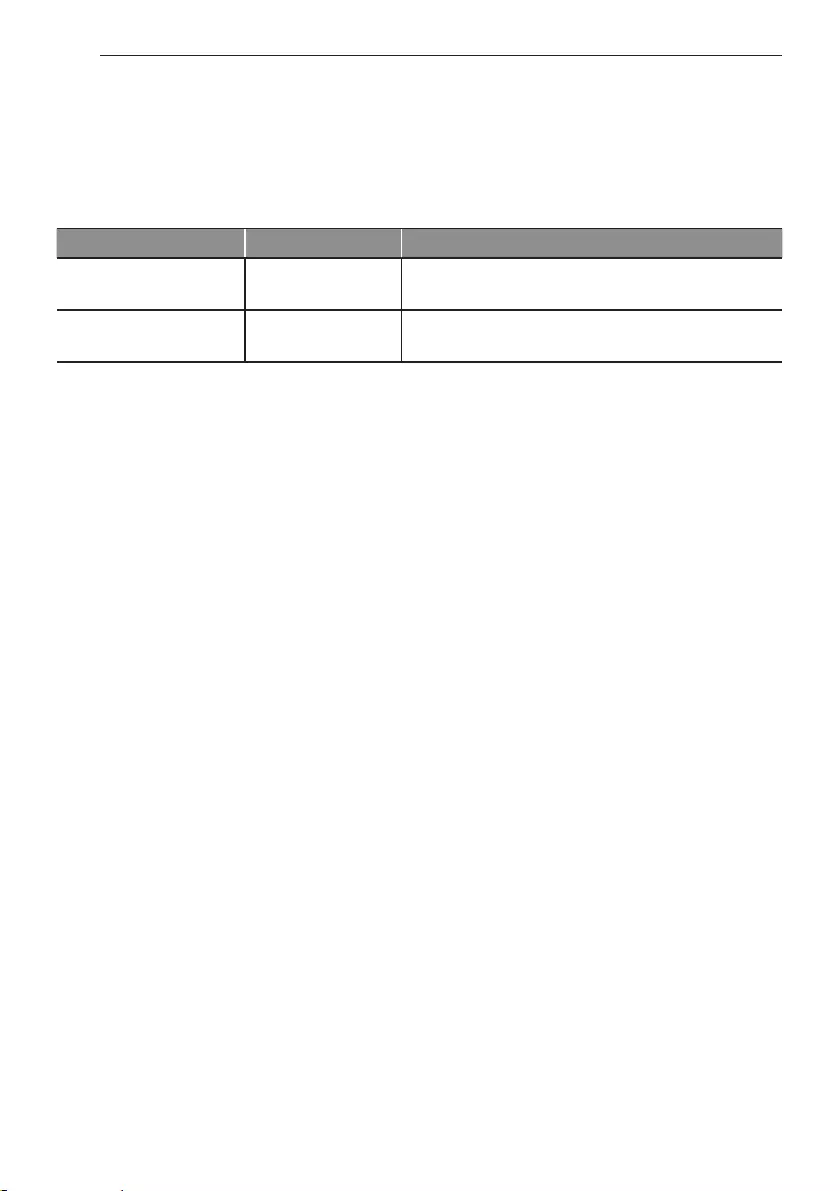
50 WARRANTY
WARRANTY (USA)
Should your LG Dryer (“Product”) fail due to a defect in materials or workmanship under normal home use, during the
warranty period set forth below, LG will at its option repair or replace the product. This limited warranty is valid only
to the original retail purchaser of the product and applies only when purchased and used within the United States
including U.S. Territories. Proof of original retail purchase is required to obtain warranty service under this limited
warranty.
Warranty Period Scope of Warranty HOW SERVICE IS HANDLED
One (1) year from date of
original retail purchase Parts and Labor LG will provide parts and labor to repair or replace
defective parts.
Ten (10) years from date
of original retail purchase Dryer drum Parts only. Customer will be responsible for any labor or
in-home service to replace defective parts.
Replacement products and parts are warranted for the remaining portion of the original warranty period or ninety
•
(90) days, whichever is greater.
Replacement products and parts may be new or remanufactured.
•
THIS WARRANTY IS IN LIEU OF ANY OTHER WARRANTY, EXPRESS OR IMPLIED, INCLUDING WITHOUT
LIMITATION, ANY WARRANTY OF MERCHANTABILITY OR FITNESS FOR A PARTICULAR PURPOSE. TO THE
EXTENT ANY IMPLIED WARRANTY IS REQUIRED BY LAW, IT IS LIMITED IN DURATION TO THE EXPRESS
WARRANTY PERIOD ABOVE. NEITHER THE MANUFACTURER NOR ITS U.S. DISTRIBUTOR SHALL BE
LIABLE FOR ANY INCIDENTAL, CONSEQUENTIAL, INDIRECT, SPECIAL, OR PUNITIVE DAMAGES OF ANY
NATURE, INCLUDING WITHOUT LIMITATION, LOST REVENUES OR PROFITS, OR ANY OTHER DAMAGE
WHETHER BASED IN CONTRACT, TORT, OR OTHERWISE.
Some states do not allow the exclusion or limitation of incidental or consequential damages or limitations on how long
an implied warranty lasts, so the above exclusion or limitation may not apply to you. This warranty gives you specific
legal rights and you may also have other rights that vary from state to state.
THIS LIMITED WARRANTY DOES NOT COVER:
Service trips to deliver, pick up, or install or repair the product; instruction to the customer on operation of the
•
product; repair or replacement of fuses or correction of wiring or plumbing, or correction of unauthorized repairs/
installation.
Failure of the product to perform during power failures and interruptions or inadequate electrical service.
•
Damage caused by leaky or broken water pipes, frozen water pipes, restricted drain lines, inadequate or
•
interrupted water supply or inadequate supply of air.
Damage resulting from operating the Product in a corrosive atmosphere or contrary to the instructions outlined in
•
the Product’s owner’s manual.
Damage to the Product caused by accidents, pests and vermin, lightning, wind, fire, floods, or acts of God.
•
Damage or failure caused by unauthorized modification or alteration, or if it is used for other than the intended
•
purpose, or any water leakage where the unit was not properly installed.
Damage or failure caused by incorrect electrical current, voltage, or plumbing codes, commercial or industrial use,
•
or use of accessories, components, or consumable cleaning products that are not approved by LG.
Damage caused by transportation and handling, including scratches, dents, chips, and/or other damage to the
•
finish of your product, unless such damage results from defects in materials or workmanship and is reported within
one (1) week of delivery.
Damage or missing items to any display, open box, discounted, or refurbished Product.
•
Products with original serial numbers that have been removed, altered, or cannot be readily determined. Model
•
and Serial numbers, along with original retail sales receipt, are required for warranty validation.
Increases in utility costs and additional utility expenses.
•
MFL67731049_en_170714.indd 50 2017.7.14 2:25:4 PM
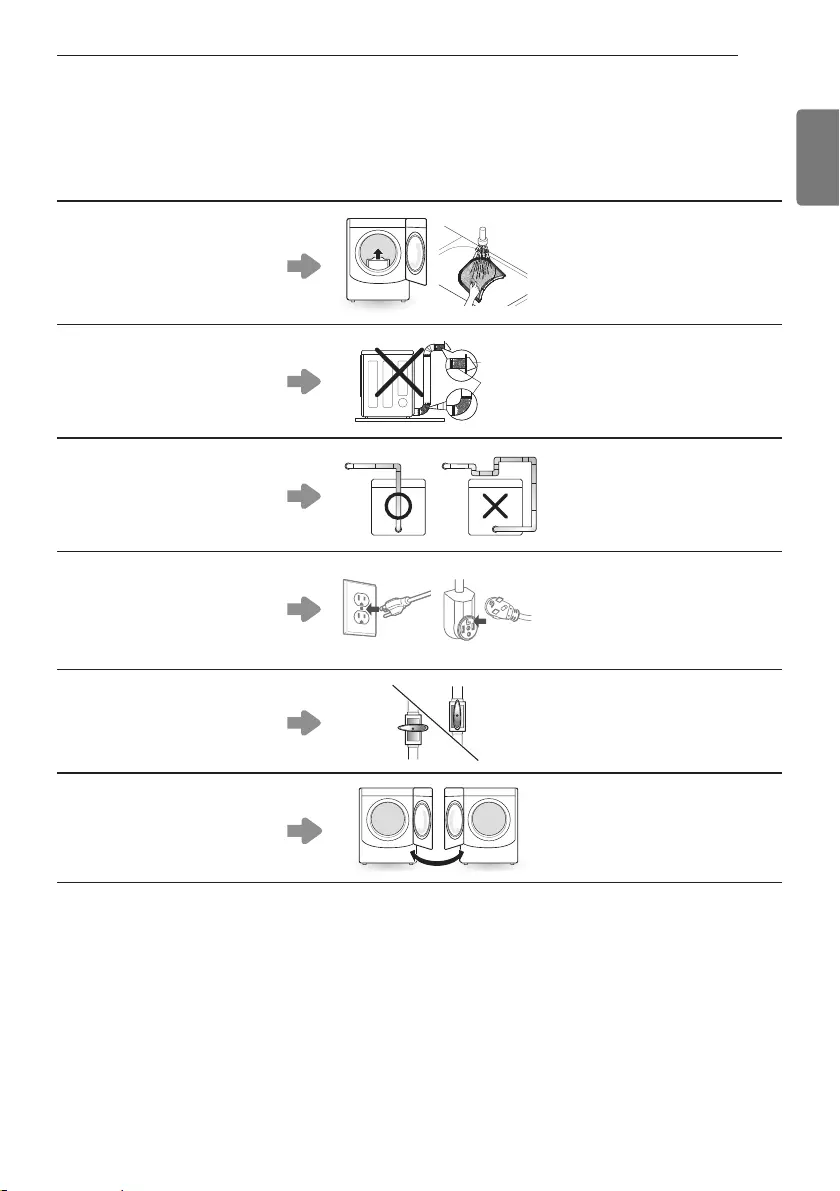
51
ENGLISH
WARRANTY
Repairs when your Product is used in other than normal and usual household use (e.g. commercial use, in offices
•
and recreational facilities) or contrary to the instructions outlined in the Product’s owner’s manual.
Costs associated with removal of your Product from your home for repairs.
•
The removal and reinstallation of the Product if it is installed in an inaccessible location or is not installed in
•
accordance with published installation instructions, including LG’s owner’s and installation manuals.
Damage resulting from misuse, abuse, improper installation, repair, or maintenance. Improper repair includes use
•
of parts not approved or specified by LG.
Filter is clogged.
Not heating, long dry time
•
Clean the lint filter.
•
Duct is clogged.
Not heating, long dry time
•
Clean the hood and duct.
•
Excessive duct length and/
or multiple elbows
Not heating, long dry time
•
Keep exhaust ducts as short as
•
possible, using as few elbows
and bends as possible.
Improperly connected power
cord or electrical outlet
issue.
No Power
•
Not Heating
•
Reconnect power cord, replace
•
house fuse or reset breaker. If
outlet is issue, electrician may
be required.
Gas valve is not turned on.
(Gas Dryer)
Not heating
•
Open the gas valve
•
Door Reversal
Instructions for door reversal
•
can be found in the owner’s
manual.
The cost of repair or replacement under these excluded circumstances shall be borne by the consumer.
OBTAIN WARRANTY SERVICE AND ADDITIONAL INFORMATION
If you do not have access to the internet and you need assistance using your product or you would like to schedule
service, you may contact LG Electronics at the number below.
For assistance or service, call 1-800-243-0000.
If you need further assistance, you can write to LG with any questions or concerns at the address below:
LG Electronics, 201 James Record Road, Huntsville, Alabama 35813
For additional product information, visit our website at http://www.lg.com
MFL67731049_en_170714.indd 51 2017.7.14 2:25:10 PM

MFL67731049_en_170714.indd 52 2017.7.14 2:25:12 PM
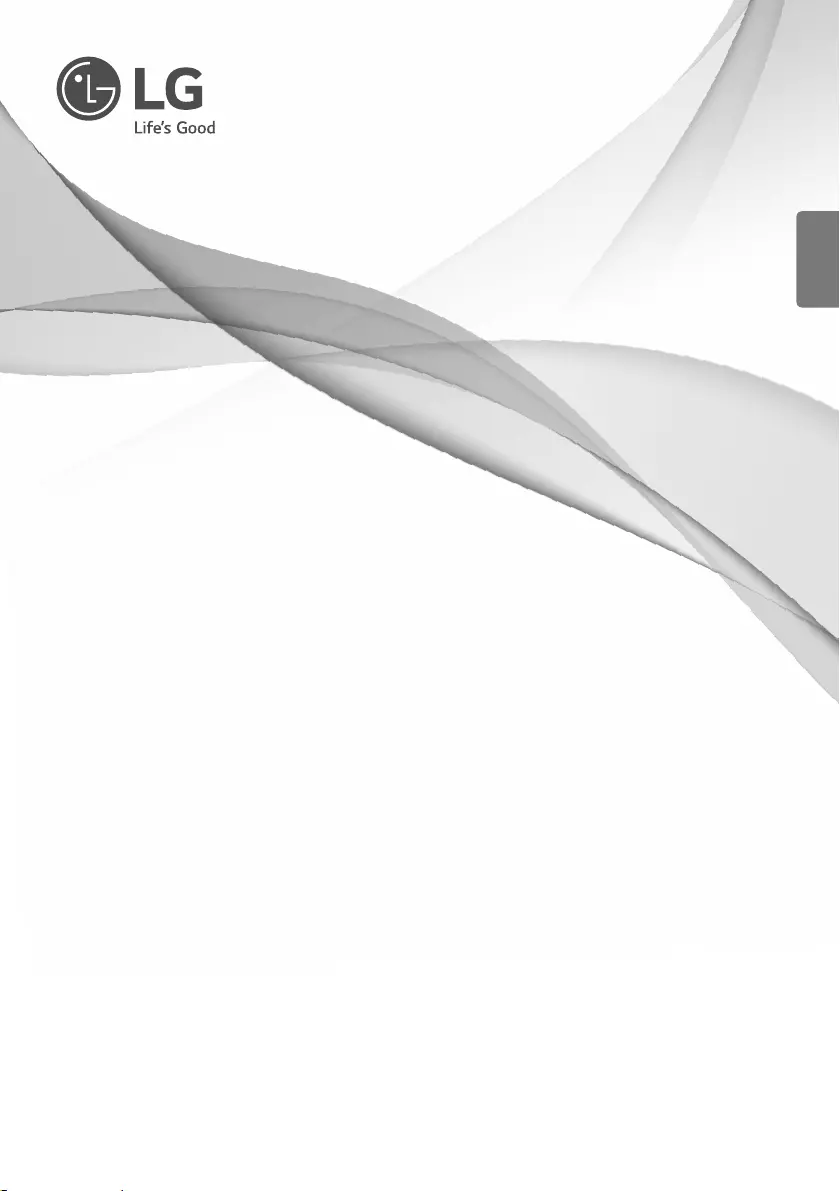
MANUAL DEL USUARIO
SECADORA
Lea atentamente este manual antes de utilizar su secadora y manténgalo
a mano en todo momento para futuras consultas.
ESPAÑOL
DLEX5000* DLGX5001*
www.lg.com
Copyright © 2017 LG Electronics Inc. Todos los Derechos Reservados.
MFL67731049_sp_170714.indd 1 2017.7.14 2:20:54 PM

2
TABLA DE CONTENIDOS
3 INSTRUCCIONES IMPORTANTES
DE SEGURIDAD
3 QUÉ HACER SI HUELE GAS
4 PRECAUCIONES BÁSICAS DE SEGURIDAD
4 LEY EJECUTIVA PARA LA SEGURIDAD
DEL AGUA POTABLE Y LOS TÓXICOS DE
CALIFORNIA (CALIFORNIA SAFE DRINKING
WATER AND TOXIC ENFORCEMENT ACT)
5 INSTRUCCIONES DE CONEXIÓN A TIERRA
5 INSTRUCCIONES IMPORTANTES PARA LA
INSTALACIÓN
6 INSTRUCCIONES DE SEGURIDAD PARA
FUNCIONES DE VAPOR
7 INSTRUCCIONES IMPORTANTES PARA
CONECTAR LA ELECTRICIDAD
8 INFORMACIÓN TRANSMISOR
MÓDULO
9 CARACTERÍSTICAS ESPECIALES
10 DESCRIPCIÓN DEL PRODUCTO
10 Partes
10 Accesorios
11 Características del panel de control
12 Pantalla
13 INSTALACIÓN
13 Descripción de la instalación
14 Requisitos Del Lugar De Instalación
14 Espacios de instalación
15 Separaciones con base pedestal opcional
16 Nivelación de la secadora
17 Inversión de la puerta
19 Instalación del kit de ventilación lateral
20 Cónexión del conducto de ventilación de la
secadora
22 Manguera de entrada
23 Conexión de secadoras a gas
25 Cómo conectar las secadoras eléctricas
30 Requisitos especiales para viviendas móviles o
prefabricadas
30 Revisión de instalación final
31 Prueba de instalación
(Comprobación del sistema de evacuación)
33 CÓMO USAR
33 Funcionamiento de la secadora
34 Guía de ciclos
35 Clasificación de cargas
35 Cómo cargar la secadora
35 Revise el filtro de pelusa antes de cada uso
35 Almacenamiento bajo placa superior
36 Uso de la tapa
37 Botones modificadores de ciclo
38 Funciones especiales
39 Programa personalizado
40 Funciones de vapor
40 Guía de ciclo de vapor
41 CONECTIVIDAD CON
DISPOSITIVOS INTELIGENTES
41 Información general de conectividad
41 Configuración de la conectividad
42 Smart ThinQ™
44 UTILIZACIÓN DEL
SMARTDIAGNOSIS™
45 MANTENIMIENTO
45 Limpieza regular
46 RESOLUCIÓN DE PROBLEMAS
46 Antes de llamar a mantenimiento
49 ESPECIFICACIONES
50 GARANTÍA
TABLA DE CONTENIDOS
MFL67731049_sp_170714.indd 2 2017.7.14 2:20:54 PM

3
ESPAÑOL
INSTRUCCIONES IMPORTANTES DE SEGURIDAD
LEA TODAS LA INSTRUCCIONES ANTES DE USAR
wADVERTENCIA
Por su seguridad, debe seguir la información indicada en este manual para minimizar el riesgo de incendio o
explosión, descarga eléctrica, o para prevenir daños a la propiedad, lesiones personales o muerte.
Su Seguridad y la de los demás son de suma importancia.
En este manual y en su electrodoméstico figuran muchos mensajes importantes de seguridad. Lea y cumpla
siempre con todos los mensajes de seguridad.
Éste es el símbolo de alerta de seguridad.
El mismo alerta sobre potenciales riesgos de muerte o heridas tanto para usted como para otras personas.
Todos los mensajes de seguridad estarán a continuación del símbolo de alerta de seguridad y con la palabra
PELIGRO, ADVERTENCIA o PRECAUCIÓN.
Estas palabras significan:
wPELIGRO
Corre riesgo de muerte o de sufrir heridas serias si no sigue las instrucciones inmediatamente.
wADVERTENCIA
Corre riesgo de muerte o de sufrir heridas serias si no sigue las instrucciones.
wPRECAUCIÓN
De no seguir las instrucciones podría sufrir daños leves o causar daños en el producto.
Todos los mensajes de seguridad le indicarán cuál es el riesgo potencial, le dirán cómo reducir las posibilidades de
sufrir heridas y qué puede suceder si no se siguen las instrucciones.
de la secadora y aumentarán el riesgo de incendio.
wADVERTENCIA
Si no se observan estrictamente las advertencias de seguridad, pueden producirse daños materiales, lesiones
graves o la muerte.
- No almacene ni use gasolina u otros líquidos o vapores inflamables cerca de este artefacto ni de ningún otro.
- QUÉ HACER SI HUELE GAS
• No intente encender ningún aparato.
• No toque ningún interruptor eléctrico ni use ningún teléfono de su edificio.
• Evacue a todos los ocupantes de la habitación, el edificio o el área.
• Llame a su compañía de gas inmediatamente desde el teléfono de un vecino.
Siga las instrucciones de la compañía de gas.
• Si no puede comunicarse con su compañía de gas, llame al departamento de bomberos.
- La instalación y el mantenimiento deben ser realizados por un instalador, una agencia de servicio o una compañía
de gas calificados.
w
INSTRUCCIONES IMPORTANTES DE SEGURIDAD
MFL67731049_sp_170714.indd 3 2017.7.14 2:20:55 PM

4
INSTRUCCIONES IMPORTANTES DE SEGURIDAD
LEA TODAS LA INSTRUCCIONES ANTES DE USAR
wADVERTENCIA
Por su seguridad, debe seguir la información indicada en este manual para minimizar el riesgo de incendio o
explosión, descarga eléctrica, o para prevenir daños a la propiedad, lesiones personales o muerte.
wADVERTENCIA
Para minimizar el riesgo de incendio o explosión, descarga eléctrica, o para prevenir lesiones personales cuando use
electrodomésticos, se deben seguir precauciones básicas de seguridad, incluyendo las siguientes:
Esta ley requiere que el gobernador de California publique un listado de sustancias conocidas en el estado que
causan cáncer, defectos congénitos u otras lesiones reproductivas, y obliga a los negocios a alertar a los clientes
sobre la posible exposición a tales sustancias. Los electrodomésticos a gas pueden causar exposición leve a cuatro de
estas sustancias, principalmente benceno, monóxido de carbono, formaldehído y hollín, generado principalmente
por la combustión parcial del gas natural o los combustibles LP (petróleo líquido). Las secadoras calibradas
adecuadamente minimizarán la combustión parcial. Para minimizar incluso más la exposición a estas sustancias, se
puede dotar a la secadora de la ventilación adecuada al exterior.
wADVERTENCIA: Este producto contiene químicos conocidos por el Estado de California como causantes de
cáncer y defectos de nacimiento u otros daños reproductivos.
Lávese las manos después de usarlo.
• Lea todas las instrucciones antes de usar la secadora.
• Antes de usar, la secadora debe estar correctamente
instalada como se describe en este manual.
•
incendie.
• No seque artículos que hayan sido limpiados, lavados,
remojados o salpicados previamente con gasolina,
disolventes de limpieza en seco u otras substancias
inflamables o explosivas, ya que emanan vapores que
podrían encenderse o explotar, incluso después del lavado.
•
• No repare o reemplace ninguna parte de la secadora ni
intente reparar la misma a menos que esto se recomiende
en forma específica en esta Guía de Uso y Cuidado o
en instrucciones de reparación publicadas las cuales
comprende y sabe aplicar.
•
• Antes de poner la secadora fuera de servicio o de tirarla,
quite la puerta para prevenir que los niños se metan dentro.
• No deje que los niños jueguen en la secadora ni dentro
de ella. Cuando se usa la secadora cerca de los niños, se
necesita una supervisión estricta.
• Use suavizadores de tela o productos para eliminar estática
únicamente del modo recomendado por el fabricante.
•
• Evite la acumulación de pelusa, polvo o tierra alrededor del
área de la apertura de ventilación y áreas adyacentes.
• La parte interior de la secadora y el conducto de ventilación
se deberán limpiar periódicamente, y la misma deberá ser
realizada por personal calificado del servicio.
• No instale ni coloque esta secadora en lugares donde
pueda estar expuesta a variables climáticas.
• Antes de cargar la secadora, siempre revise que no haya
objetos extraños en su interior.
• Retire la pelusa del filtro antes de cada carga.
•
INSTRUCCIONES IMPORTANTES DE SEGURIDAD
MFL67731049_sp_170714.indd 4 2017.7.14 2:20:55 PM

5
ESPAÑOL
INSTRUCCIONES IMPORTANTES DE SEGURIDAD
INSTRUCCIONES IMPORTANTES DE SEGURIDAD
LEA TODAS LA INSTRUCCIONES ANTES DE USAR
wADVERTENCIA
Por su seguridad, debe seguir la información indicada en este manual para minimizar el riesgo de incendio o
explosión, descarga eléctrica, o para prevenir daños a la propiedad, lesiones personales o muerte.
Este electrodoméstico deberá estar conectado a tierra. En caso de avería o mal funcionamiento, la conexión a tierra
reducirá el riesgo de descargas eléctricas al brindar un camino con una resistencia menor para la corriente eléctrica.
Este electrodoméstico debe estar equipado con un cable con un conductor para la conexión a tierra del equipo y
un enchufe con conexión a tierra. El enchufe deberá estar conectado a una toma de corriente instalada en forma
adecuada y con conexión a tierra de acuerdo con todos los códigos y ordenanzas locales.
wADVERTENCIA
Para reducir el riesgo de incendio, descargas eléctricas o heridas al usar su electrodoméstico, siga las precauciones
básicas, incluyendo lo siguiente:
•
Siga
los detalles en las instrucciones de instalación. Si la
secadora no se encuentra adecuadamente conectada
a tierra se pueden producir descargas eléctricas.
•
Si la
secadora no se encuentra adecuadamente conectada
a tierra se pueden producir descargas eléctricas.
•
•
Si no se cumple con
esta advertencia se podrán producir heridas graves,
incendios, descargas eléctricas o muerte.
•
Si no se cumple con esta advertencia se
podrán producir heridas graves, incendios, descargas
eléctricas o muerte.
•
Un
circuito eléctrico inadecuado se puede fundir, creando
descargas eléctricas y/o riesgo de incendio.
•
niños. Los materiales de los envoltorios pueden resultar
peligrosos para los niños. Existe riesgo de asfixia.
•
Si no
se cumple con esto se podrá producir una explosión,
incendio, quemaduras o muerte.
•
Si no se cumple con esto se podrá producir
una explosión, incendio, quemaduras o muerte.
•
Si no lo hace puede
ocasionar daños en el equipo, humos o un incendio.
• Si
no lo hace puede ocasionar daños en el equipo, humos
o un incendio.
•
Si no lo hace puede ocasionar daños en el equipo,
humos o un incendio.
MFL67731049_sp_170714.indd 5 2017.7.14 2:20:55 PM

6
INSTRUCCIONES IMPORTANTES DE SEGURIDAD
LEA TODAS LA INSTRUCCIONES ANTES DE USAR
wADVERTENCIA
Por su seguridad, debe seguir la información indicada en este manual para minimizar el riesgo de incendio o
explosión, descarga eléctrica, o para prevenir daños a la propiedad, lesiones personales o muerte.
wADVERTENCIA
Para reducir el riesgo de lesiones personales, cumpla con todos los procedimientos de seguridad recomendados
por la industria, incluyendo el uso de use guantes con mangas largas y gafas de seguridad. En caso de no cumplir
con todas las advertencias de seguridad de este manual se podrán producir daños sobre la propiedad, lesiones
personales o la muerte.
Conducto de escape/Tubería:
wADVERTENCIA
Para reducir el riesgo de incendio, descarga eléctrica o lesiones personales al usar este electrodoméstico deben
seguirse precauciones básicas de seguridad, incluyendo las siguientes:
•
Si no se siguen estas instrucciones se
podrá producir incendio o muerte.
•
La acumulación de pelusa en cualquier parte de la
casa puede crear riesgos de salud e incendio.
•
incendios. Los sistemas de ventilación agujereados pueden
causar incendios si se colapsan o bloquean durante el uso o la
instalación.
•
el retorno de descarga cuando no se usa la secadora. Si no se
siguen estas instrucciones se podrá producir incendio o muerte.
•
Si no se siguen estas instrucciones se podrá
producir incendio o muerte.
•
Si no se siguen
estas instrucciones se podrá producir incendio o muerte.
•
de escape. Asegure todas las uniones con cinta adhesiva
impermeable. Para más detalles, siga las Instrucciones de
Instalación. Si no se siguen estas instrucciones se podrá producir
incendio o muerte.
wADVERTENCIA
Riesgo de incendio
Si no se observan estrictamente las advertencias de
seguridad, pueden producirse daños materiales, lesiones
graves o la muerte.
No instale un ventilador auxiliar en el tubo de salida.
Instale todas las secadoras de ropa conforme a las
instrucciones de instalación del fabricante de la secadora.
INSTRUCCIONES IMPORTANTES DE SEGURIDAD
•
No seguir estas instrucciones puede provocar un
peligro de quemaduras.
•
No seguir estas instrucciones
puede provocar un incendio o la muerte.
•
No seguir estas instrucciones puede provocar
un incendio o la muerte.
•
No seguir estas instrucciones
puede provocar un peligro de quemaduras.
•
No seguir estas instrucciones puede
provocar un peligro de quemaduras.
MFL67731049_sp_170714.indd 6 2017.7.14 2:20:55 PM

7
ESPAÑOL
INSTRUCCIONES IMPORTANTES DE SEGURIDAD
LEA TODAS LA INSTRUCCIONES ANTES DE USAR
wADVERTENCIA
Por su seguridad, debe seguir la información indicada en este manual para minimizar el riesgo de incendio o
explosión, descarga eléctrica, o para prevenir daños a la propiedad, lesiones personales o muerte.
wADVERTENCIA
Para reducir el riesgo de incendio, descargas eléctricas o heridas al usar su electrodoméstico, siga las precauciones
básicas, incluyendo lo siguiente:
•
Para evitar
heridas a nivel personal o daños sobre la secadora, el
cable de corriente eléctrica debe estar conectado en
una conexión a tierra en condiciones adecuadas.
•
adecuadamente. Si esto no se cumple se podrán
producir descargas eléctricas o heridas.
•
Si estas instrucciones no se
cumplen se podrán producir descargas eléctricas y/o
riesgo de incendio.
•
tomacorriente conectado a tierra adecuadamente.
Si la secadora no se encuentra adecuadamente
conectada a tierra se pueden producir descargas
conectado a tierra. Si estas instrucciones no se
cumplen se podrán producir descargas eléctricas y/o
riesgo de incendio.
•
Esto proporciona el mejor desempeño
y previene a la vez sobrecarga de los circuitos de
cableado del hogar, lo que podría producir un incendio
debido a los cables sobrecalentados.
•
El
cable de corriente se puede cortar debido a cualquier
movimiento de su parte central, resultando en una
descarga eléctrica.
•
Este cable de corriente se
puede fundir, creando descargas eléctricas y/o riesgo
de incendio.
•
corriente. Esto evitará heridas o daños debido a
incendios o descargas eléctricas sobre la secadora.
INSTRUCCIONES IMPORTANTES DE SEGURIDAD
MFL67731049_sp_170714.indd 7 2017.7.14 2:20:56 PM
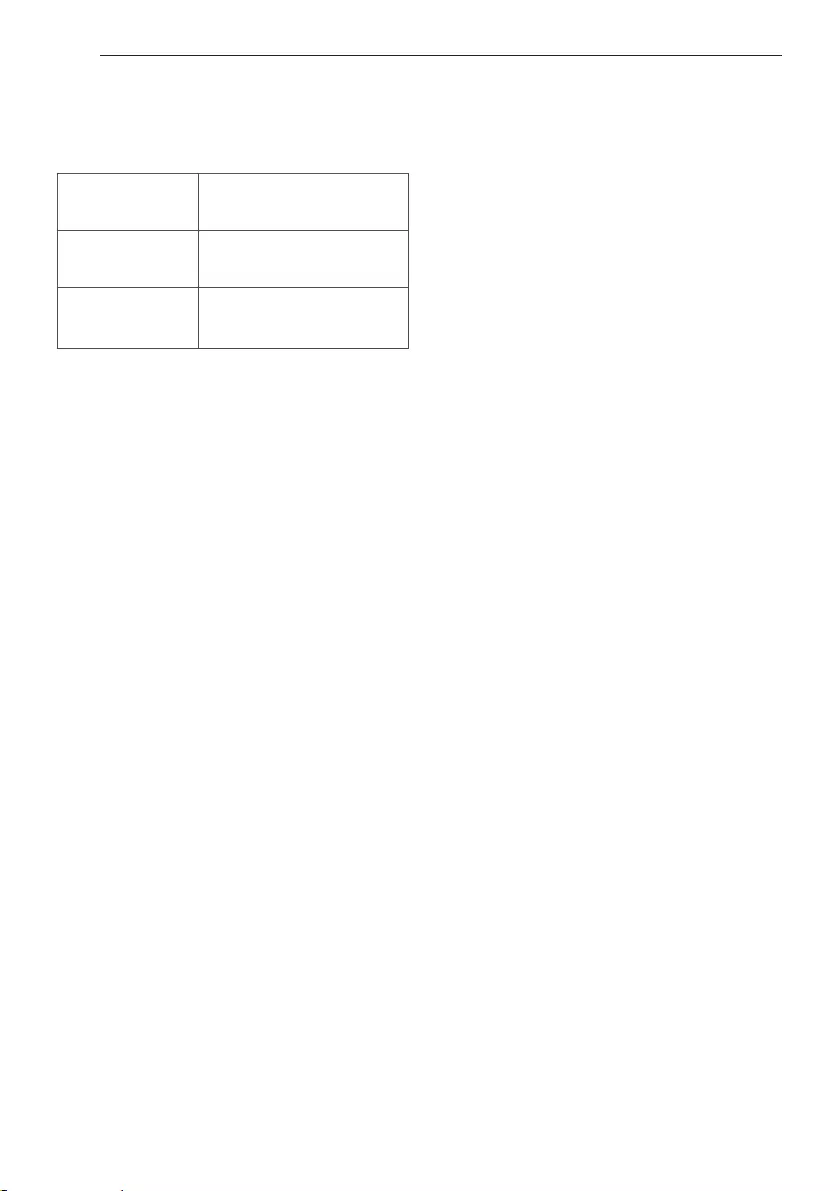
8
INFORMACIÓN TRANSMISOR MÓDULO
INFORMACIÓN TRANSMISOR MÓDULO
Modelo LCW-003
Rango de
frecuencia 2412~2462 MHz
Rango de
frecuencia
(max.)
IEEE 802.11 b : 17.56 dBm
IEEE 802.11 g : 25.53 dBm
IEEE 802.11 n : 25.29 dBm
Este equipo fue probado y se determinó que cumple
con los límites para los dispositivos digitales de Clase
B, en conformidad con la parte 15 de las normas de
la FCC. Estos límites están diseñados para ofrecer una
protección razonable contra interferencias dañinas en
una instalación residencial.
Este equipo genera, usa y puede emitir energía de
radiofrecuencia y, si no se instala y utiliza de acuerdo
con las instrucciones, podría causar interferencias
dañinas a las comunicaciones por radio. Sin embargo,
no se garantiza que dicha interferencia no pueda ocurrir
en instalaciones particulares. Si este equipo causa
interferencia dañina a la recepción de radio o televisión,
que se puede determinar encendiendo y apagando
el equipo, se aconseja al usuario intentar corregir
la interferencia realizando alguna de las siguientes
acciones:
• Reorientar o reubicar la antena receptora.
• Aumentar la separación entre el equipo y el receptor.
• Conectar el equipo a una toma de corriente en un
circuito diferente del utilizado por el receptor.
• Consultar al vendedor o a un técnico de radio/TV con
experiencia para solicitar ayuda.
Este dispositivo cumple con la parte 15 de las normas
de la FCC. La operación está sujeta a las dos siguientes
condiciones:
1) Este dispositivo no debe causar interferencia dañina,
y
2) Este dispositivo debe aceptar cualquier interferencia
recibida, incluso aquellas que pudieran causar un
funcionamiento no deseado del dispositivo.
Cualquier cambio o modificación en la construcción
de este dispositivo que no cuente con la aprobación
expresa de la parte responsable del cumplimiento,
puede anular la autorización del usuario para operar
este equipo.
Este equipo cumple con los límites de exposición a
la radiación de la FCC establecidos para entornos no
controlados. Este transmisor no se debe ubicar ni operar
junto con ninguna otra antena ni transmisor.
El equipo se debe instalar y operar con una distancia
mínima de 20 cm (7,8 pulg.) entre la antena y su cuerpo.
Los usuarios deben seguir las instrucciones de operación
específicas de manera tal de cumplir con las normas de
exposición a la RF.
Para obtener el código fuente bajo GPL, LGPL, MPL y
otras licencias de código abierto que contiene este
producto, visite http://opensource.lge.com. Además del
código fuente, se pueden descargar los términos de la
licencia, las anulaciones de la garantía y los avisos de
derechos de autor.
LG Electronics también le proporcionará el código
fuente abierto en un CD-ROM con un cargo que cubra
el costo de realizar tal distribución (como el costo de los
medios, el envío y el manejo) con una previa solicitud
por correo electrónico a opensource@lge. com. Esta
oferta es válida durante tres (3) años a partir de la fecha
de adquisición del producto.
MFL67731049_sp_170714.indd 8 2017.7.14 2:20:56 PM

9
ESPAÑOL
CARACTERÍSTICAS ESPECIALES
PANEL DE CONTROL FÁCIL PARA USAR
Gire la perilla selectora de ciclos al ciclo de secado deseado. Añada los ajustes de ciclo o programe las opciones
con el toque de un botón.
PUERTA REVERSIBLE DE FÁCIL ACCESO
La amplia puerta provee acceso para carga y descarga. Se puede invertir el sentido de la puerta para adaptarlo al
lugar de la instalación.
TAMBOR DE ACERO INOXIDABLE DE CAPACIDAD SUPERIOR ILUMINADO
El tambor de acero inoxidable de gran capacidad ofrece durabilidad superior. El tambor está equipado con una
luz amarilla que se ilumina al abrir la puerta de la secadora y se apaga cuando se cierra.
FUNCIONES DE VAPOR ÚTILES
La nueva tecnología de vapor de LG le permite inyectar las telas con un chorro giratorio de vapor caliente para
refrescar las prendas. Simplemente seleccione el ciclo steam fresh™ o agregue la opción Steam (vapor) a los ciclos
seleccionados.
INDICADOR DEL SISTEMA DE SENSOR DE BLOQUEO DE CONDUCTO FLOW SENSE™
El sistema de detección de bloqueo de conductos FLOW SENSE™ detecta y alerta sobre la existencia de
obstrucciones en el sistema de ventilación doméstico instalado que reducen el flujo de ventilación de la secadora.
Si aparece el mensaje de alerta: Limpie o repare los conductos para eliminar las obstrucciones. Mantenga
sus conductos limpios para aumentar la eficiencia y reducir largos ciclos de secado causados por conductos
bloqueados.
SMART THINQ™
use un teléfono inteligente para controlar su electrodoméstico en forma remota. También es
posible monitorear el funcionamiento del ciclo para saber cuánto tiempo le queda al ciclo.
cuando el ciclo esté completo o el electrodoméstico tenga problemas, tiene la opción de
recibir notificaciones automáticas en su teléfono inteligente.
los dispositivos inteligentes se pueden comunicar con las empresas locales proveedoras de
servicios que cuentan con equipos de redes inteligentes. (Consulte la página 33).
descargue ciclos nuevos y especiales que no estén incluidos en la máquina.
si llegase a experimentar dificultades técnicas, su dispositivo tiene la capacidad de transmitir
los datos por teléfono al Centro del Información al Cliente para que se pueda diagnosticar el
problema.
esta función configura automáticamente los parámetros del ciclo en función de sus
necesidades de lavado.
Esta función permite la temporización de la limpieza de la cuba Limpieza de tambor y el
historial del uso de ciclos de la máquina.
el consumo energético de su secadora se ve afectado por el ciclo y las configuraciones,
por lo que se pueden observar algunos cambios en el consumo energético de un ciclo
a otro.
CARACTERÍSTICAS ESPECIALES
Protocolo P154
Ejecución de saneamiento de
secadoras residenciales
C
E
R
T
I
F
I
E
D
D
E
S
I
G
N
MFL67731049_sp_170714.indd 9 2017.7.14 2:20:58 PM
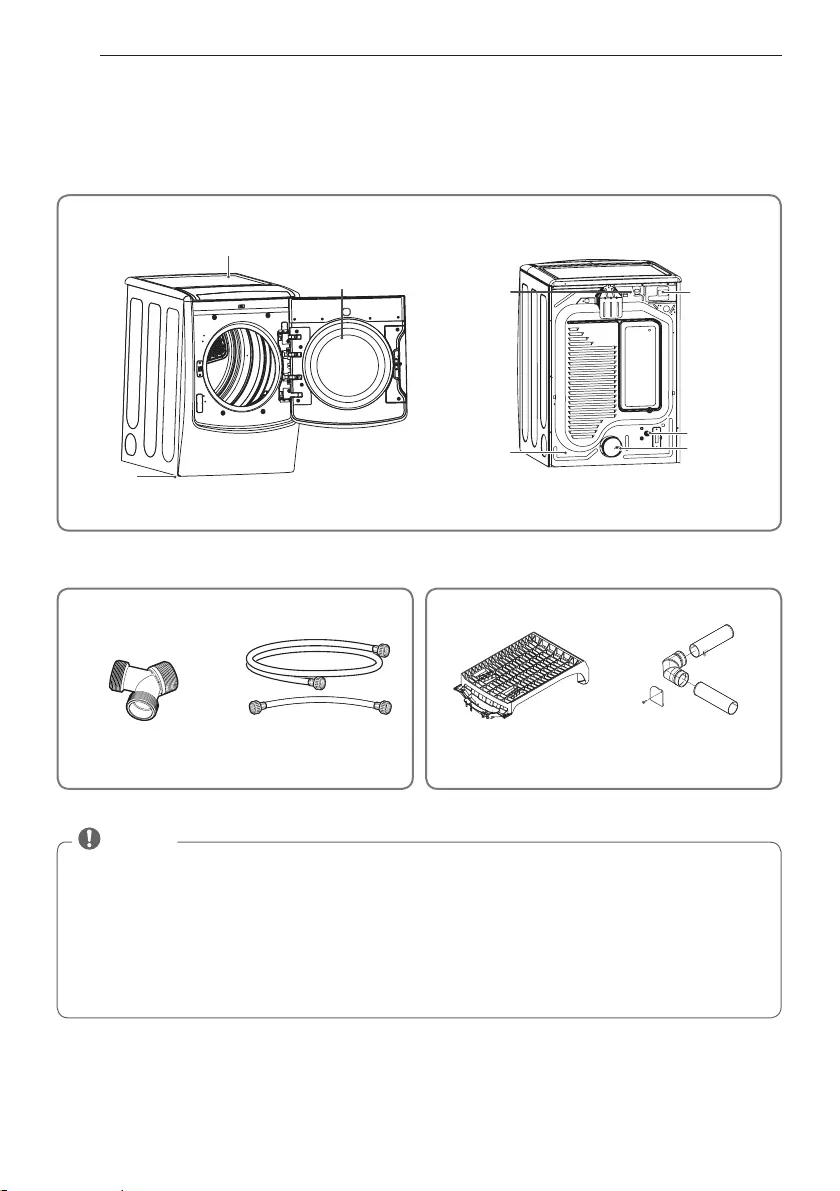
10
DESCRIPCIÓN DEL PRODUCTO
PIEZAS Y ACESORIOS
Partes
NOTA
• Visita www.lg.com por comprar si falta alguno de los accesorios.
• Póngase en contacto con el Departamento de atención al cliente de LG, en el número 1-800-243-0000 (1-888-
542-2623 en Canadá) si falta alguno de los accesorios.
• Para su seguridad, y con el fin de ampliar la vida útil de su lavadora, utilice sólo componentes autorizados. El
fabricante no se hace responsable de los fallos del producto o accidentes causados por la utilización de piezas o
componentes no autorizados.
• Las imágenes de esta manual pueden no coincidir con los componentes y accesorios reales, y están sujetas a
cambios sin previo aviso para mejoras en el producto.
DESCRIPCIÓN DEL PRODUCTO
Patas
niveladoras
Puerta
reversible
Placa
superior Ubicación
del
cable
eléctrico
(Modelos a
gas)
Ubicación de
la toma de
gas
(Modelos a
gas)
Panel de
acceso
del bloque
terminal
(Modelos
eléctricos)
Salida del
conducto
de escape
Válvula de
entrada
Accesorios
MangueraY conector
Side vent kit
(sold separately)
N.º de kit 383EEL9001B
Secado en parrilla
(3750EL1001F)
MFL67731049_sp_170714.indd 10 2017.7.14 2:21:4 PM
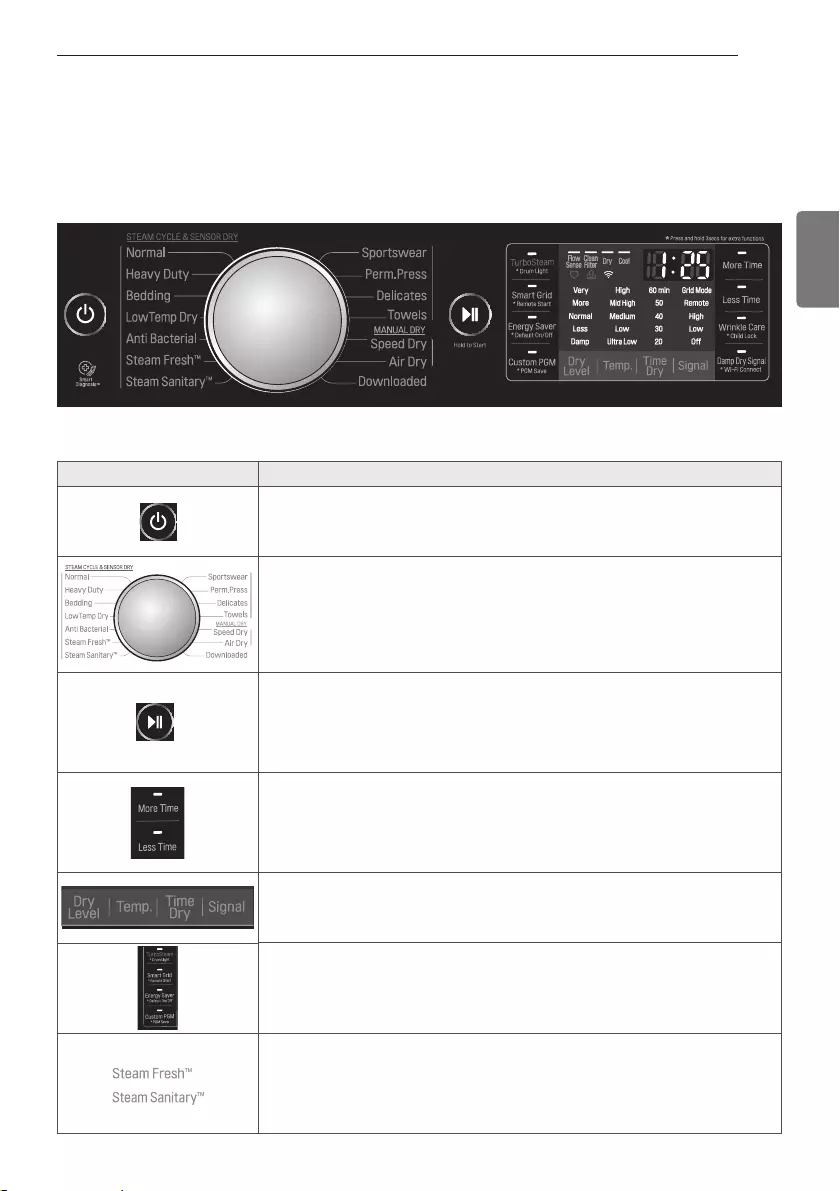
11
ESPAÑOL
Características del panel de control
A continuación encontrará instrucciones para comenzar a usar su secadora nueva. Para más información
por favor consulte las secciones específicas de este manual.
wADVERTENCIA: Para reducir el riesgo de incendios, descargas eléctricas o heridas, lea este
manual en su totalidad, incluyendo las Instrucciones Importantes de Seguridad, antes de operar la
secadora.
- Apriete el botón para encender la secadora. Apriete nuevamente para apagar la secadora.
Apretar el botón de ENCENDIDO/APAGADO (ON/OFF) durante un ciclo cancelará
ese ciclo y borrará cualquier ajuste de carga.
- Gire esta perilla para seleccionar el ciclo deseado. Una vez que se haya seleccionado
el ciclo deseado, los preajustes estándar se mostrarán en la pantalla. En los ciclos de
SECADO MANUAL (MANUAL DRY) se pueden programar estos ajustes usando los
botones de ajuste de ciclos en cualquier momento antes de iniciar el ciclo.
- Mantenga pulsado este botón más de 0,5 segundos para iniciar el ciclo
seleccionado. Si la secadora está funcionando, utilice este botón para hacer una
Pausa en el ciclo, sin perder los ajustes actuales.
Si no aprieta el botón Inicio/Pausa (Start /Pause) para detener un ciclo en 4
minutos, la secadora se apagará automáticamente.
- Use estos botones con los ciclos de secado manual (MANUAL DRY), de SECADO
TEMPORIZADO (TIME DRY), y de STEAM FRESH™ programar el tiempo de secado.
Apriete el botón MÁS TIEMPO (MORE TIME) para aumentar el tiempo del ciclo manual
seleccionado en intervalos de un minuto; apriete MENOS TIEMPO (LESS TIME) para
disminuir el tiempo del ciclo en intervalos de un minuto.
- Utilice estos botones para seleccionar los ajustes de ciclo deseados para el ciclo
seleccionado. Los ajustes actuales se muestran en la pantalla. Apriete el botón para
ver esa opción y seleccionar otros ajustes.
- Los botones de opciones le permiten seleccionar opciones de ciclo adicionales. No
todos los ajustes pueden usarse en todos los programas. Consulte la seccion GUIA DE
CICLOS de este manual.
- La nueva tecnología con vapor de LG le permite inyectar a la ropa un chorro de vapor
caliente en forma de remolino, el cual permite refrescar la misma, reducir la estática
y facilitar el planchado. Simplemente seleccione el ciclo STEAM FRESH™, STEAM
SANITARY™ o puede agregar la opción VAPOR a ciclos seleccionados. Para obtener
información detallada sobre opciones individuales, lea las siguientes páginas.
Operación
DESCRIPCIÓN DEL PRODUCTO
MFL67731049_sp_170714.indd 11 2017.7.14 2:21:32 PM
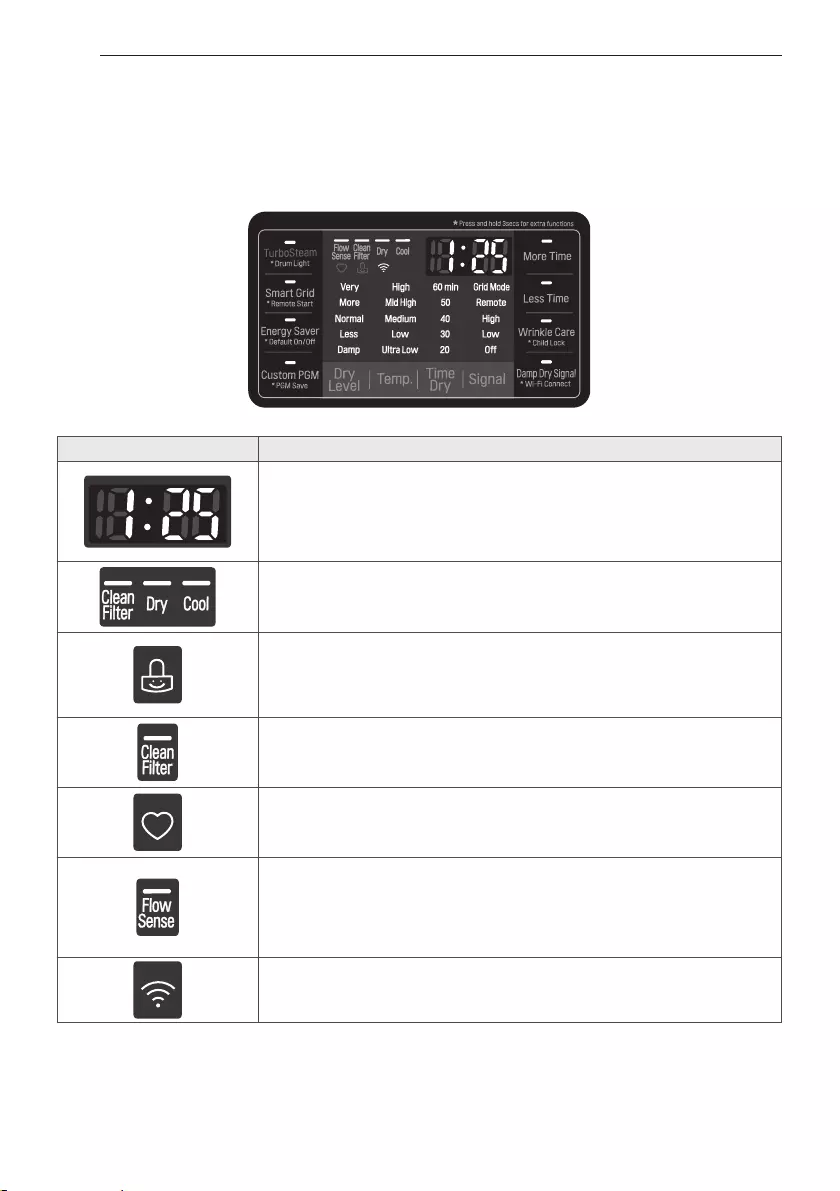
12
Pantalla
La pantalla muestra los ajustes, el tiempo restante estimado, las opciones y los mensajes de estado
correspondientes a su secadora. Cuando se gira el secador, la luz en la exhibición iluminará.
wADVERTENCIA: Para reducir el riesgo de incendios, descargas eléctricas o heridas, lea este manual
en su totalidad, incluyendo las Instrucciones Importantes de Seguridad, antes de operar la secadora.
- Cuando se presiona el boton INICIO/PAUSA (START/PAUSE), la pantalla indicara el
tiempo restante estimado para el ciclo de secado seleccionado.
El tiempo de ciclo en los ciclos SECADO CON SENSOR (SENSOR DRY)
podrian fluctuar a medida que la secadora vuelve a calcular el tiempo de
secado para obtener resultados óptimos.
- Esta opción de la pantalla muestra qué etapa del ciclo de secado se está llevando
a cabo: REVISION DE FILTRO (CHECK FILTER), SECADO(DRY), FRIAMIENTO (COOL).
- Cuando se ha fijado el seguro infantil, aparecerá el indicador de seguro infantil y
se desactivarán todos los botones excepto el botón de ENCENDIDO/APAGADO
(ON/OF). Esto previene que los niños cambien los ajustes mientras la secadora se
encuentra en funcionamiento.
- La pantalla mostrará REVISION DE FILTRO (CLEAN FILTER) cuando se ha
encendido la secadora como un recordatorio para revisar el filtro. Se apaga
cuando se aprieta el botón INICIO/PAUSA (START/PAUSE)
- Si usted tiene una combinación especial de configuraciones que utiliza con
frecuencia, puede guardarlas como PRO GRAMA PERSONALIZADO (CUSTOM
PROGRAM)
- El sistema de sensor de bloqueo de conducto FLOW SENSE™ detecta y lo alerta
sobre bloqueos y la tubería, lo cual reduce el flujo de escape de la secadora. Esto
puede mejorar el funcionamiento y ayudar a minimizar el número de llamadas al
servicio técnico, ahorrándole dinero.
- Cuando el electrodomestico este conectado a Internet a traves de la red Wi-Fi de
su hogar, aparecera este indicador.
DESCRIPCIÓN DEL PRODUCTO
MFL67731049_sp_170714.indd 12 2017.7.14 2:21:38 PM
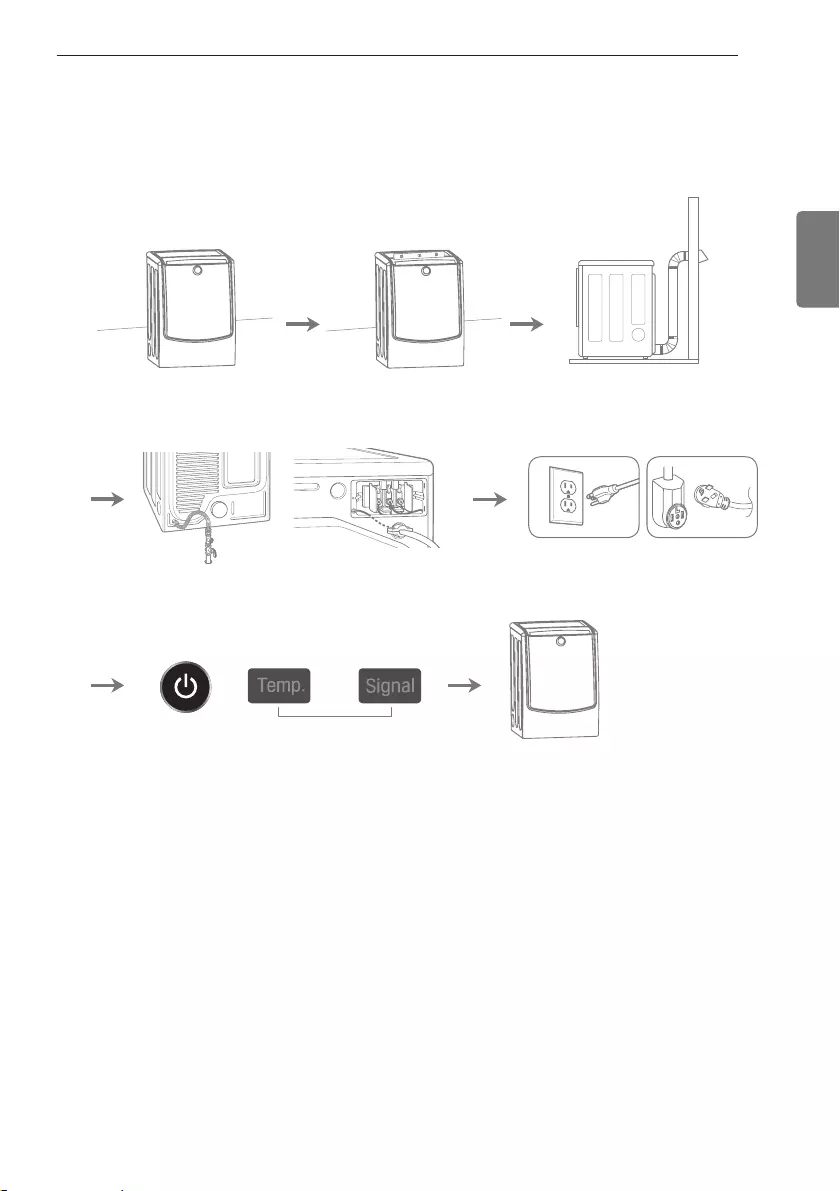
13
ESPAÑOL
INSTALACIÓN
Descripción de la instalación
Comprobación
y elección de la
ubicación adecuada
Nivelación de la
secadora
ventilación de la
secadora
Prueba de instalación
Conexión de secadoras
a gas (Tipo de secadoras
gas)
Cómo conectar las
secadoras eléctricas (Tipo
secadoras eléctricas)
Conexión del enchufe y la
toma de tierra
Prueba de
funcionamiento
Pulse y mantenga
120V
240V(USA)
230V(CANADA)
INSTALACIÓN
(Gas) (Eléctricas)
MFL67731049_sp_170714.indd 13 2017.7.14 2:21:39 PM
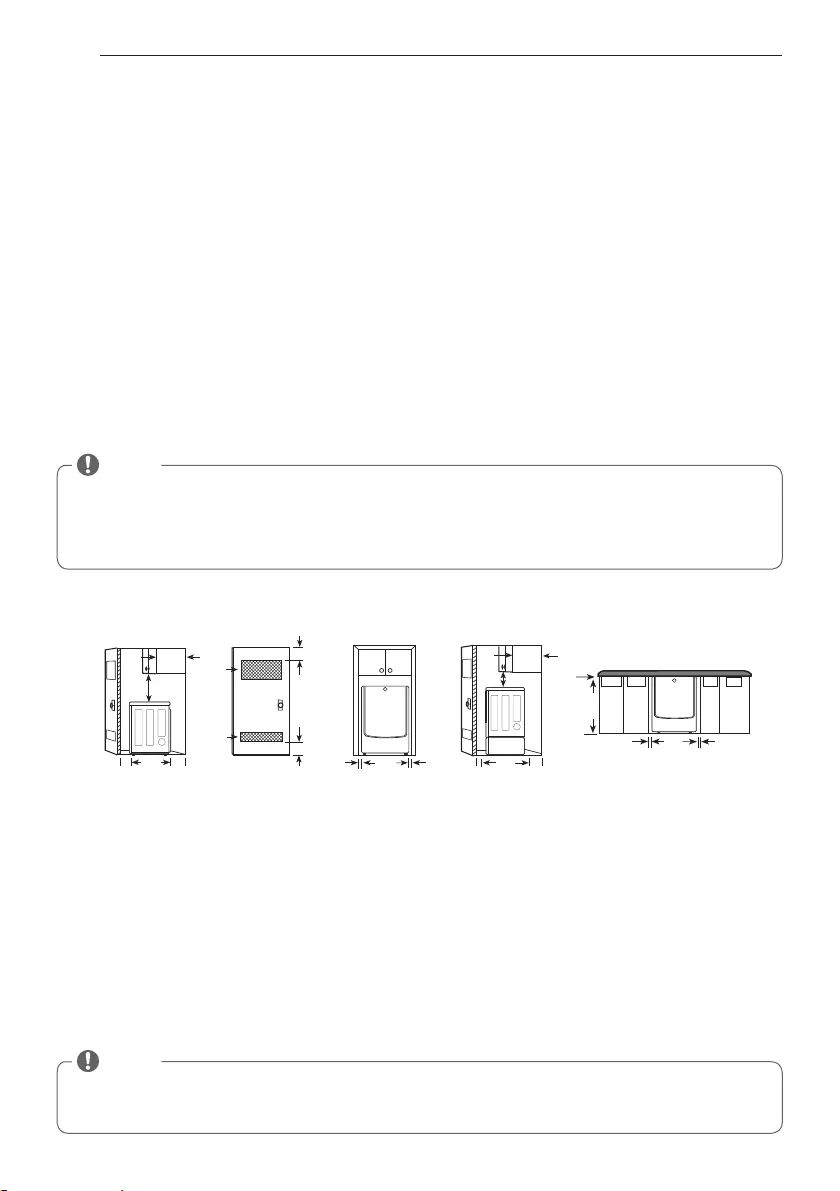
14
Requisitos del lugar de instalación
w ADVERTENCIA
Es importante que revise todo este manual antes de instalar y usar su
secadora. Se proporcionan instrucciones detalladas pertinentes a las conexiones eléctricas, de gas y los requisitos de
escape en las siguientes páginas.
No utilice la secadora a temperaturas inferiores a 7°C (45°F). A temperaturas bajas, la secadora puede no apagarse al
final de un ciclo automático. Esto puede conllevar a tiempos de secado más largos. La secadora no se debe instalar ni
almacenar en una zona donde pueda estar expuesta al agua o a inclemencias meteorológicas. Compruebe los requi-
sitos del código. Algunos códigos limitan, o no permiten, la instalación de la secadora en garajes, muebles cerrados,
caravanas o dormitorios. Contacte con la persona encargada de la inspección de su edificio.
Espacios de instalación
SEPARACIÓN AL REALIZAR LA INSTALACIÓN EN ÁREAS CERRADAS O EMPOTRADAS
Para esta secadora, se recomienda dejar las siguientes separaciones. Esta secadora se ha evaluado dejando una
separación de 2,5 cm (1 pulg.) a ambos lados y en la parte posterior. Se recomienda dejar el espacio recomendado,
por las razones siguientes:
•
Un lugar que permita la instalación correcta del sistema
de escape. El secador de gas debe tener una salida
de escape hacia el exterior. Consulte
.
• La salida eléctrica de toma a tierra debe estar a 61 cm
(2 pies) de ambos lados de la secadora.Consulte
.
• El suelo debe ser firme para soportar el peso total de la
secadora, siendo éste de 90,7 kg (200 lbs). Igualmente,
se tendrá en cuenta el peso combinado de un posible
electrodoméstico acoplado.
• No se puede instalar ningún aparato de combustión
en el mismo compartimento que la secadora.
• Se debe dejar un espacio adicional para facilitar las
tareas de instalación y mantenimiento.
• Las separaciones adicionales pueden ser necesarias
para las molduras del techo, el suelo o la pared.
• Igualmente se deben considerar las separaciones a
ambos lados de la secadora para reducir la transmisión
de ruido. Al realizar la instalación en un armario o
habitáculo cerrado, debe haber salidas de ventilación
mínimas en la parte superior e inferior del lugar.
También se permiten las puertas apersianadas con
salidas de ventilación equivalentes.
• Además debe tenerse en cuenta el espacio requerido
por cualquier otro aparato que se acompañe.
24 in.
2*
(155 cm
2
)
18" min.*
(45.7 cm)
1"*
(2.5 cm)
5"**
(12.7 cm)
48 in.
2*
(310 cm
2
)
14" max.*
(35.6 cm)
3"
*
(7.6 cm)
3"
*
(7.6 cm)
1"
(2.5 cm)
27’’
(68.6cm)
1"
(2.5 cm)
1"*
(2.5 cm)
5"**
(12.7 cm)
14" max.*
(35.6 cm)
18" min.*
(45.7 cm)
0"
(0 cm)
38
11/16
"
(98.3cm)
1"*
(2.5 cm)
27’’
(68.6cm)
27’’
(68,6cm)
1"*
(2.5 cm)
7"* (17.8 cm)
9"*
(22.9 cm)
7"* (17.8 cm)
1"**
(2.5 cm)
27"
(68.6cm)
5"**
(12.7 cm) (2.5 cm)
(2.5 cm)
48 in.
2
*
(310 cm
2
)
3"* (7.6 cm)
3"* (7.6 cm)
1"* (2.5 cm)
24 in.
2
*
(155 cm
2
)
6"* (15.2 cm)
81.6
"
(207.2 cm)
29"
(73.7 cm)
1"
(2.5 cm)
1"
(2.5 cm)
5 "**
(14 cm)
2/4
24 in.
2*
(155 cm
2
)
18" min.*
(45,7 cm)
1"*
(2,5 cm)
5"**
(12,7 cm)
48 in.
2*
(310 cm
2
)
14" max.*
(35,6 cm)
3"
*
(7,6 cm)
3"
*
(7,6 cm)
1"
(2,5 cm)
27’’
(68,6cm)
1"
(2,5 cm)
1"*
(2,5 cm)
5"**
(12,7 cm)
14" max.*
(35,6 cm)
18" min.*
(45,7 cm)
0"
(0 cm)
38
11/16
"
(98,3cm)
1"*
(2,5 cm)
1"*
(2,5 cm)
7"* (17,8 cm)
9"*
(22,9 cm)
7"* (17,8 cm)
27"
(68,6cm) (2,5 cm)
(2,5 cm)
48 in.
2
*
(310 cm
2
)
3"* (7,6 cm)
3"* (7,6 cm)
1"* (2,5 cm)
24 in.
2
*
(155 cm
2
)
6"* (15,2 cm)
81,6
"
(207,2 cm)
29"
(73,7 cm)
1"
(2,5 cm)
1"
(2,5 cm)
5 "**
(14 cm)
2/4
1"**
(2,5 cm)
5"**
(12,7 cm)
31
1
/
8
"
(79.0 cm)
31
1
/
8
"
(79,0 cm)
31 1/8"
(79.0 cm)
31 1/8"
(79,0 cm)
31
1
/
8
"
(79.0 cm)
31
1
/
8
"
(79,0 cm)
NOTA
• El suelo de apoyo de la secadora debe estar nivelado y no tener una inclinación superior a 2,5 cm (1 pulg.). Si
la secadora no está nivelada, las prendas no se centrifugarán correctamente y los ciclos de sensor automático
puede que no funcionen como corresponde.
• Para la instalación en un garaje, necesita colocar la secadora a 46 cm (18 pulg.) como mínimo del suelo. Si utiliza
un pedestal, debe dejar una separación de 46 cm (18 pulg.) respecto a la parte inferior de la secadora.
NOTA
Al menos se debe dejar un espacio alrededor de la secadora (o de cualquier otro equipo) para eliminar la
transferencia de vibración de uno a otro. Si la vibración es importante, podría desencadenar ruidos o fricción
entre ambos, con el consecuente deterioro de la pintura e incluso, más ruido.
INSTALACIÓN
MFL67731049_sp_170714.indd 14 2017.7.14 2:21:40 PM
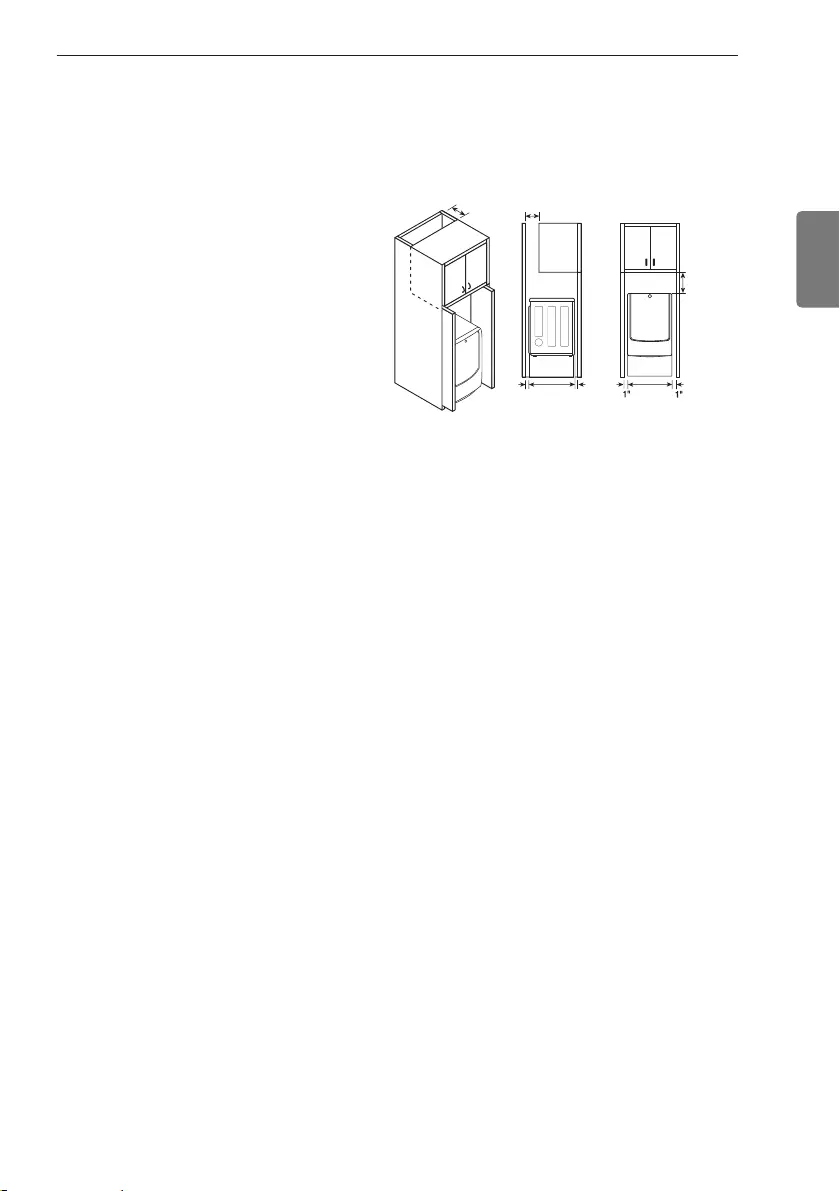
15
ESPAÑOL
Separaciones con base pedestal opcional
SEPARACIÓN RECOMENDADA PARA LA INSTALACIÓN EN UN HABITÁCULO CERRADO
• Al realizar la instalación en un habitáculo cerrado debe haber salidas de ventilación mínimas en la parte superior e
inferior del lugar.
*Espacio requerido
** Para la ventilación lateral e inferior,
se permite una separación de 5,1 cm
(2 pulg.)
24 in.
2*
(155 cm
2
)
18" min.*
(45.7 cm)
1"*
(2.5 cm)
5"**
(12.7 cm)
48 in.
2*
(310 cm
2
)
14" max.*
(35.6 cm)
3"
*
(7.6 cm)
3"
*
(7.6 cm)
1"
(2.5 cm)
27’’
(68.6cm)
1"
(2.5 cm)
1"*
(2.5 cm)
5"**
(12.7 cm)
14" max.*
(35.6 cm)
18" min.*
(45.7 cm)
0"
(0 cm)
38
11/16
"
(98.3cm)
1"*
(2.5 cm)
27’’
(68.6cm)
27’’
(68,6cm)
1"*
(2.5 cm)
7"* (17.8 cm)
9"*
(22.9 cm)
7"* (17.8 cm)
1"**
(2.5 cm)
27
"
(68.6cm)
5"**
(12.7 cm) (2.5 cm)
(2.5 cm)
48 in.
2
*
(310 cm
2
)
3"* (7.6 cm)
3"* (7.6 cm)
1"* (2.5 cm)
24 in.
2
*
(155 cm
2
)
6"* (15.2 cm)
81.6"
(207.2 cm)
29"
(73.7 cm)
1"
(2.5 cm)
1"
(2.5 cm)
5 "**
(14 cm)
2/4
24 in.
2*
(155 cm
2
)
18" min.*
(45,7 cm)
1"*
(2,5 cm)
5"**
(12,7 cm)
48 in.
2*
(310 cm
2
)
14" max.*
(35,6 cm)
3"
*
(7,6 cm)
3"
*
(7,6 cm)
1"
(2,5 cm)
27’’
(68,6cm)
1"
(2,5 cm)
1"*
(2,5 cm)
5"**
(12,7 cm)
14" max.*
(35,6 cm)
18" min.*
(45,7 cm)
0"
(0 cm)
38
11/16
"
(98,3cm)
1"*
(2,5 cm)
1"*
(2,5 cm)
7"* (17,8 cm)
9"*
(22,9 cm)
7"* (17,8 cm)
27
"
(68,6cm)
(2,5 cm)
(2,5 cm)
48 in.
2
*
(310 cm
2
)
3"* (7,6 cm)
3"* (7,6 cm)
1"* (2,5 cm)
24 in.
2
*
(155 cm
2
)
6"* (15,2 cm)
81,6"
(207,2 cm)
29"
(73,7 cm)
1"
(2,5 cm)
1"
(2,5 cm)
5 "**
(14 cm)
2/4
1"**
(2,5 cm)
5"**
(12,7 cm)
31
1
/
8
"
(79.0 cm)
31
1
/
8
"
(79,0 cm)
31
1
/
8
"
(79.0 cm)
31
1
/
8
"
(79,0 cm)
31
1
/
8
"
(79.0 cm)
31
1
/
8
"
(79,0 cm)
INSTALACIÓN
MFL67731049_sp_170714.indd 15 2017.7.14 2:21:41 PM
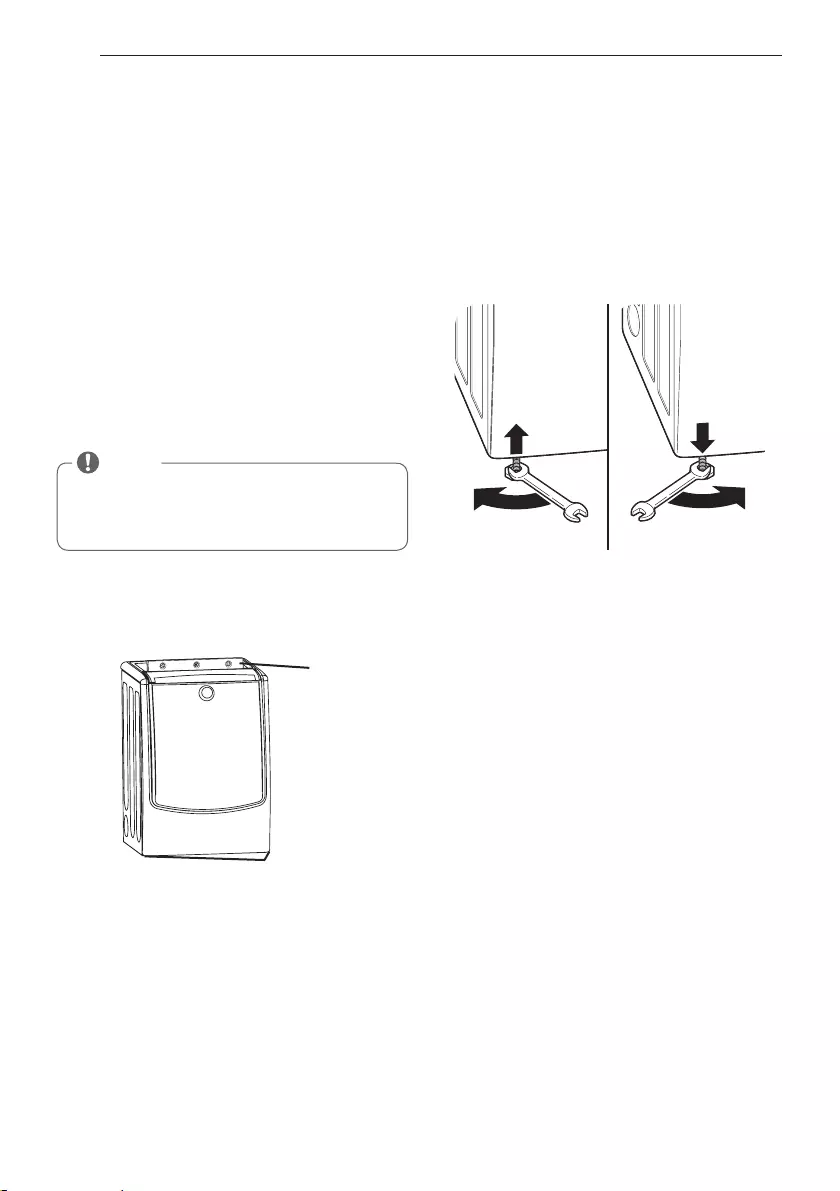
16
Nivelación de la secadora
wADVERTENCIA
•
cumpla con todos los procedimientos de seguridad
seguridad. Si no se cumple con esta advertencia se
podrán producir heridas graves o muerte.
•
Si no
se cumple con esta advertencia se podrán producir
heridas graves o muerte.
Para asegurar que la secadora brinde un desempeño
óptimo de secado, debe estar nivelada. Para minimizar
la vibración, el ruido y movimiento no deseados, el piso
deberá ser una superficie perfectamente nivelada y
sólida.
1. Coloque la secadora en la posición final. Coloque un
nivelador sobre la secadora.
• Las 4 patas niveladoras deberán apoyarse firmemente
en el piso. Empuje suavemente las esquinas superiores
de la secadora para asegurarse de que su secadora no
se mece de esquina a esquina.
Si está instalando la secadora sobre el accesorio de
pedestal opcional, deberá usar las patas niveladoras
del pedestal para nivelarla. Las patas niveladoras de la
secadora deberán estar completamente retraídas.
2. Use una llave de tuercas ajustable para girar las patas
niveladoras. Gire en la dirección de las manecillas del
reloj para levantar la secadora o en dirección contraria
para bajarla. Suba o baje las patas niveladoras hasta
que la secadora esté nivelada de lado a lado y de
adelante hacia atrás.
Asegúrese de que las 4 patas niveladoras se
encuentran haciendo contacto firme con el piso.
Nivelador
Patas niveladoras
NOTA
Fije las patas niveladoras sólo en la medida necesaria
para nivelar la secadora. La extensión de las patas
niveladoras más de lo necesario puede causar
vibración de la secadora.
INSTALACIÓN
MFL67731049_sp_170714.indd 16 2017.7.14 2:21:42 PM
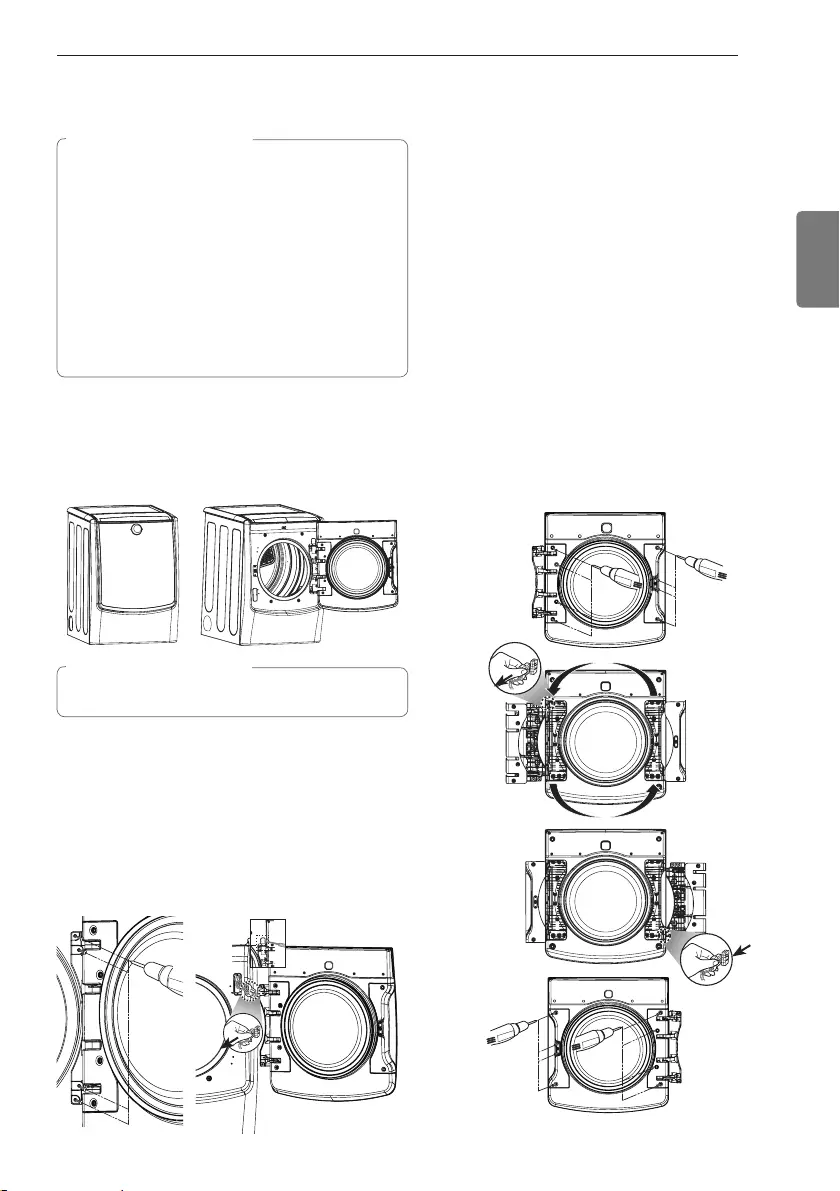
17
ESPAÑOL
destornillador plano,
destornillador Phillips
1. Desconecte la máquina o apague la fuente de
alimentación desde el circuito principal antes de
invertir la puerta. Abra la puerta de la secadora
wADVERTENCIA
Asegúrese de sostener el peso de la puerta antes de
extraer los tornillos de la bisagra.
1. Mientras sostiene la puerta, extraiga los cuatro tornillos de
la bisagra.
2. Cuidadosamente, ponga la puerta a un lado del armazón
para descubrir el arnés de cables que se encuentra detrás
de la bisagra, en la parte superior. Presione la lengüeta de
bloqueo lateral para desconectar el conector del arnés de
cables. La atadura de alambre y la tapa deben evitar que el
arnés de cables se retraiga dentro del armazón.
3. Extraiga la puerta de la cubierta del armazón. Colóquela
mirando hacia abajo en una superficie de trabajo protegida.
Tapa R
(derecha)
Inversion de la puerta
INSTALACIÓN
wADVERTENCIA
LA PUERTA DE LA SECADORA ES MUY GRANDE Y
PESADA. Necesitará contar con dos o más personas
para invertir la puerta. El incumplir las instrucciones
siguientes puede dañar la secadora, ocasionar daños
materiales o lesiones personales.
de un tamaño acorde o o pida a otra persona
procedimiento.
1. Extraiga los cuatro tornillos del marco de la puerta
derecho (manija y pestillo), levántelos hacia afuera
y coloque las partes a un lado. (Los dos tornillos
centrales del pestillo son más largos).
2. Quite los cuatro tornillos del marco izquierdo de la
puerta (ensamble de la bisagra).
3. Con cuidado, levante el ensamble de la bisagra
para descubrir el conector del arnés de cables en la
parte superior de la bisagra. Presione la lengüeta de
bloqueo centrales para desconectar el conector del
arnés de cables.
4. Gire el ensamble de la bisagra 180 grados y conecte
el arnés de cables al conector en la parte inferior
derecha de la puerta.
5. Instale el ensamble de la bisagra en el espacio de la
parte lateral derecha de la puerta, introduciendo el
arnés de cables en la esquina para hacer lugar. Inserte
y apriete los cuatro tornillos.
6. Gire la manija que extrajo en el paso uno 180 grados
e instálela en el lateral izquierdo de la puerta con los
dos tornillos más cortos. Use los tornillos más largos
para ajustar el pestillo de la puerta en el centro.
Marco L
(izquierdo)
Marco R
(derecho)
MFL67731049_sp_170714.indd 17 2017.7.14 2:21:56 PM
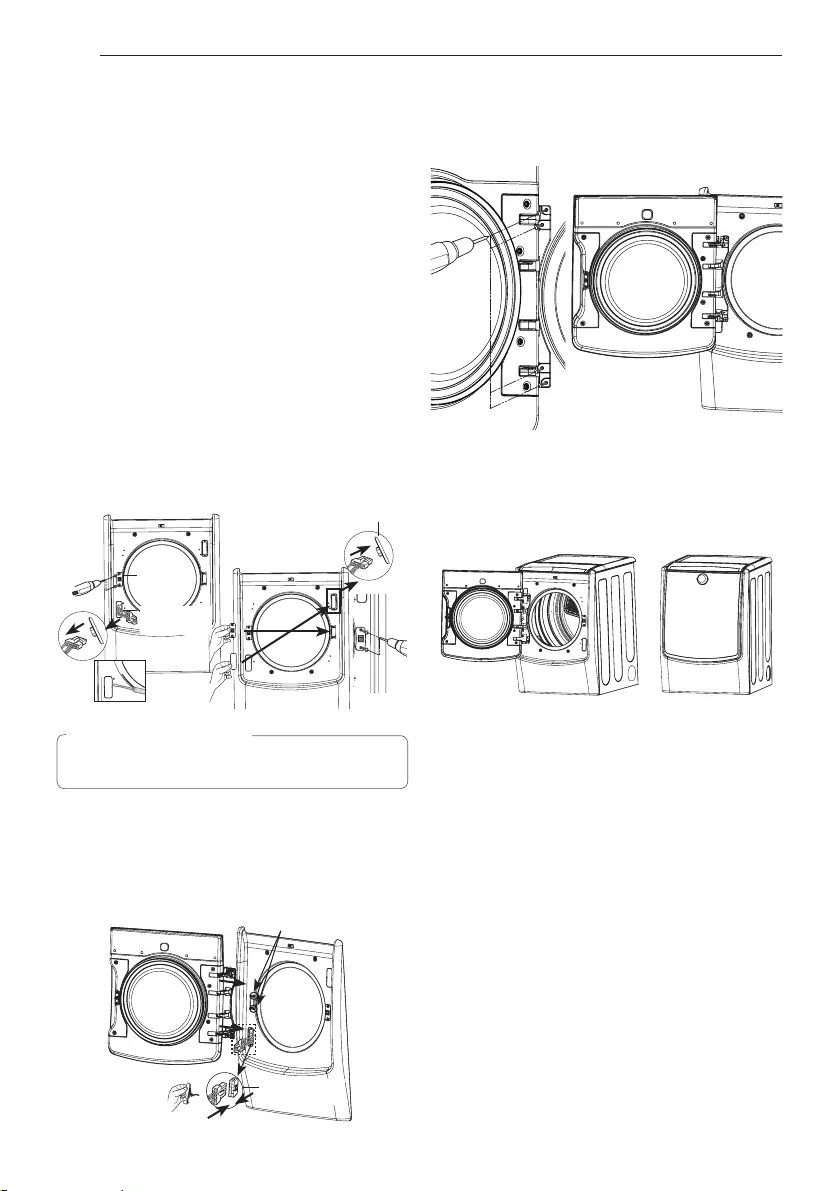
18 INSTALACIÓN
1. Quite los dos tornillos y el ensamble del cerrojo del
lateral izquierdo de la abertura.
2. Gire el ensamble del cerrojo y colóquelo en el lado
derecho de la abertura con los dos tornillos.
3. Intercambie las dos tapas. Desate la atadura de
alambre y quite la pequeña tapa del lateral del arnés
de cables en la parte superior derecha del armazón.
Asegúrese de que el arnés de cables no se deslice
hacia adentro del armazón.
4. Quite la tapa izquierda haciendo palanca suavemente
con un destornillador plano, con cuidado de no
marcar la pintura. Desconecte el arnés de cables unido
a la tapa presionando las lengüetas en cualquiera de
los lados.
5. Ajuste la tapa izquierda al arnés de cables en la parte
superior izquierda del armazón. Presione la tapa hasta
que se trabe en su lugar.
6. Ajuste la atadura de alambre y la tapa pequeña que
extrajo en el paso 1 al lateral del arnés de cables, en
la parte inferior izquierda del armazón. El arnés de
cables se sujetará al arnés de la puerta.
7. Desatornille los cuatro tornillos decorativos de la parte
izquierda del armazón e insértelos en los orificios
correspondientes de la parte derecha.
Pestillo
Tapa L
(izquierda)
Tapa L (izquierda)
wADVERTENCIA
Asegúrese de sostener el peso de la puerta mientras
inserta los tornillos de bisagra.
1. Mientras sostiene la puerta, colóquela en posición con
la bisagra en el lado izquierdo.
2. Conecte el arnés de cables de la bisagra al conector
en la parte inferior izquierda del armazón.
Conector de
arnés
Orificio de bisagra
1. Alinee la bisagra con los orificios de montaje.
2. Mientras sostiene la puerta, ajuste los cuatro tornillos
de la bisagra.
1. Compruebe que la puerta se cierre y se trabe de
manera adecuada.
MFL67731049_sp_170714.indd 18 2017.7.14 2:22:0 PM
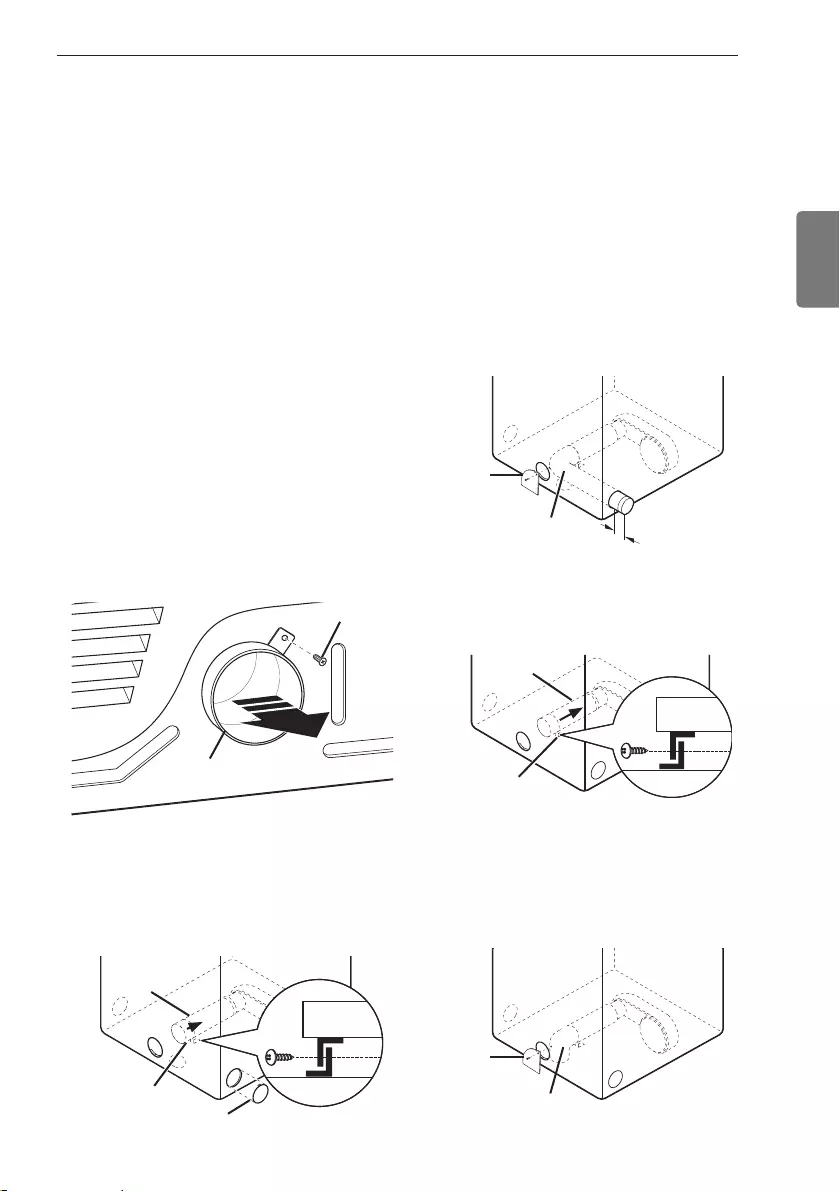
19
ESPAÑOL
wADVERTENCIA
secadora.
cumpla con todos los procedimientos de seguridad
• En caso de no cumplir con todas las advertencias de
seguridad de este manual se podrán producir daños sobre
la propiedad, lesiones personales o la muerte.
Su secadora está equipada de fábrica para ventilar en la
parte trasera. También puede configurarse para ventilar
en la parte inferior o lateralmente (no está disponible la
ventilación del lado derecho en los modelos a gas).
Puede adquirirse el kit adaptador, número de pieza
, de su distribuidor LG. Este kit contiene los
componentes de conducto necesarios para cambiar la
ubicación de la ventilación de la secadora.
1. Retire el tornillo de seguridad del conducto de escape
trasero. Saque el conducto de escape.
OPCIÓN 1: VENTILACIÓN LATERAL
2. Apriete las lengüetas en el dispositivo de expulsión y
retírelo cuidadosamente para obtener la ventilación
adecuada (no está disponible ventilación lateral en los
modelos a gas). Apriete el conducto adaptador en la
carcasa del ventilador y asegure la base de la secadora
como se indica.
Instalación del kit de ventilación lateral
3. Conecte un codo de 4 pulgadas (10,2 cm) a la
siguiente sección de conducto de 4 pulgadas (10,2
cm), y asegure todas las conexiones con cinta
adhesiva impermeable. Asegúrese de que el extremo
macho del codo apunte hacia AFUERA de la secadora.
Inserte el montaje de codo/conducto a través de
la abertura lateral y presiónelo en el conducto
adaptador. Asegúrelo en su lugar con cinta adhesiva
impermeable. Asegúrese de que el extremo macho
del conducto sobresalga 1 1⁄2 pulgadas (3,8 cm) para
conectar el resto del sistema de ventilación. Conecte
la placa de cubierta a la parte trasera de la secadora
con el tornillo provisto.
OPCIÓN 2: VENTILACIÓN INFERIOR
2. Apriete el conducto adaptador en la carcasa del
ventilador y asegure la base de la secadora como se
indica.
3. Inserte el codo de 4 pulgadas (10,2 cm) a través de la
abertura trasera y apriételo en el conducto adaptador.
Asegúrese de que el extremo macho y el codo
apunten hacia abajo por el orificio ubicado en la parte
inferior de la secadora. Asegúrelo en su lugar con cinta
adhesiva impermeable. Conecte la placa de cubierta a
la parte trasera de la secadora con el tornillo provisto.
Parte trasera
Conducto de escape
Tornillo de
seguridad
Codo
Placa de
cubierta
Dispositivo de expulsión
Abrazadera
Conducto
adaptador
Abrazadera
Conducto
adaptador
Elbow
Cover
Plate
12/4”
(3,8 cm)
INSTALACIÓN
MFL67731049_sp_170714.indd 19 2017.7.14 2:22:2 PM

20
Cónexión del conducto de ventilación de la secadora
wADVERTENCIA
Para reducir el riesgo de incendio, descargas eléctricas o heridas al usar su electrodoméstico, siga las precauciones
básicas, incluyendo lo siguiente:
• Si no se
siguen estas instrucciones se podrá producir incendio
o muerte.
•
con los mismos. Si no se siguen estas instrucciones se
podrá producir incendio o muerte.
•
limpio antes de instalar la secadora. Si no se siguen
estas instrucciones se podrá producir incendio o
muerte.
•
Si no se siguen estas instrucciones
se podrá producir incendio o muerte.
•
Si no se siguen estas instrucciones se podrá
producir incendio o muerte.
•
Si no se siguen estas instrucciones se podrá
producir incendio o muerte.
•
el escape de la secadora en un área cerrada o no
Si no se siguen estas instrucciones se podrá producir
incendio o muerte.
•
el escape de la secadora usando conductos de
plástico ni de lámina metálica. Si no se siguen estas
instrucciones se podrá producir incendio o muerte.
•
Si
no se siguen estas instrucciones se podrá producir
incendio o muerte.
•
tiempo de secado. Si no se siguen estas instrucciones
se podrá producir incendio o muerte.
•
del conducto y puedan atrapar pelusa y reducir la
Si no se
siguen estas instrucciones se podrá producir incendio
o muerte.
•
siga las limitaciones de longitud del conducto
Si no se siguen
estas instrucciones se podrá producir incendio o
muerte.
•
cuando no se usa la secadora. Si no se siguen estas
instrucciones se podrá producir incendio o muerte.
•
•
En EE.UU., sólo se
deberán usar conductos flexibles de lámina de metal,
si se precisasen, específicamente identificados por el
fabricante para su uso con el electrodoméstico y que
cumplan la “Outline for Clothes Dryer Transition Duct”
(Directriz para conductos de transición de secadoras),
Sujeto 2158A.
INSTALACIÓN
MFL67731049_sp_170714.indd 20 2017.7.14 2:22:2 PM
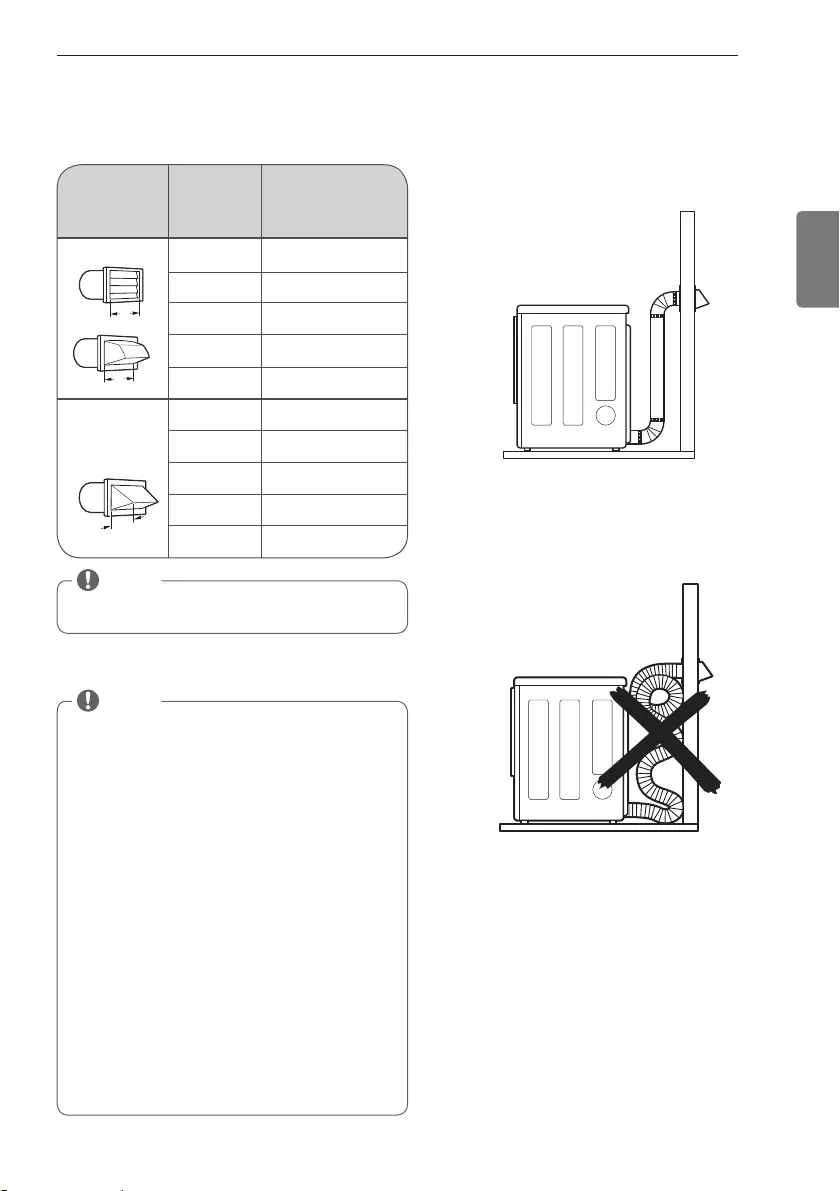
21
ESPAÑOL
Conexión del conducto de ventilación de la secadora (cont.)
DIRECCIONAMIENTO Y CONEXIÓN DEL SISTEMA DE
CONDUCTO DE ESCAPE
NOTA
Reste 6 pies (1,8 m) por cada codo adicional. No se
recomienda usar más de cuatro codos de 90°.
NOTA
Siga las pautas indicadas más abajo para maximizar
el desempeño de secado y reducir la acumulación de
pelusa en el sistema de conducto.
El sistema de conducto y las conexiones NO están
incluidas y deben adquirirse por separado.
• Use un sistema de conducto metálico rígido o
semirígido de 10,2 cm (4 pulg.).
• El conducto de escape deberá tenderse lo más corto
posible.
• Use la menor cantidad de conexiones de codo que
sea posible.
• El extremo macho de cada sección del conducto de
escape deberá apuntar hacia afuera de la secadora.
• Use cinta adhesiva impermeable en todas las
conexiones de conducto.
• Aísle el sistema de conducto que se tiende a través
de áreas sin calefacción para reducir la condensación
y acumulación de pelusa en las superficies del
conducto.
• Si no se instala correctamente la ventilación de
escape de la secadora, se anulará la garantía.
Sistema de conducto
0
1
2
3
4
0
1
2
3
4
65 ft. (19,8 m)
55 ft. (16,8 m)
47 ft. (14,3 m)
36 ft. (11,0 m)
28 ft. (8,5 m)
55 ft. (16,8 m)
47 ft. (14,3 m )
41 ft. (12,5 m)
30 ft. (9,1 m)
22 ft. (6,7 m)
Recomendado
Solamente para
el uso en los
instalaciones de
conducto cortos
4”
(10,2 cm)
4”
(10,2 cm)
22/4”
(6,35 cm)
INSTALACIÓN
MFL67731049_sp_170714.indd 21 2017.7.14 2:22:4 PM
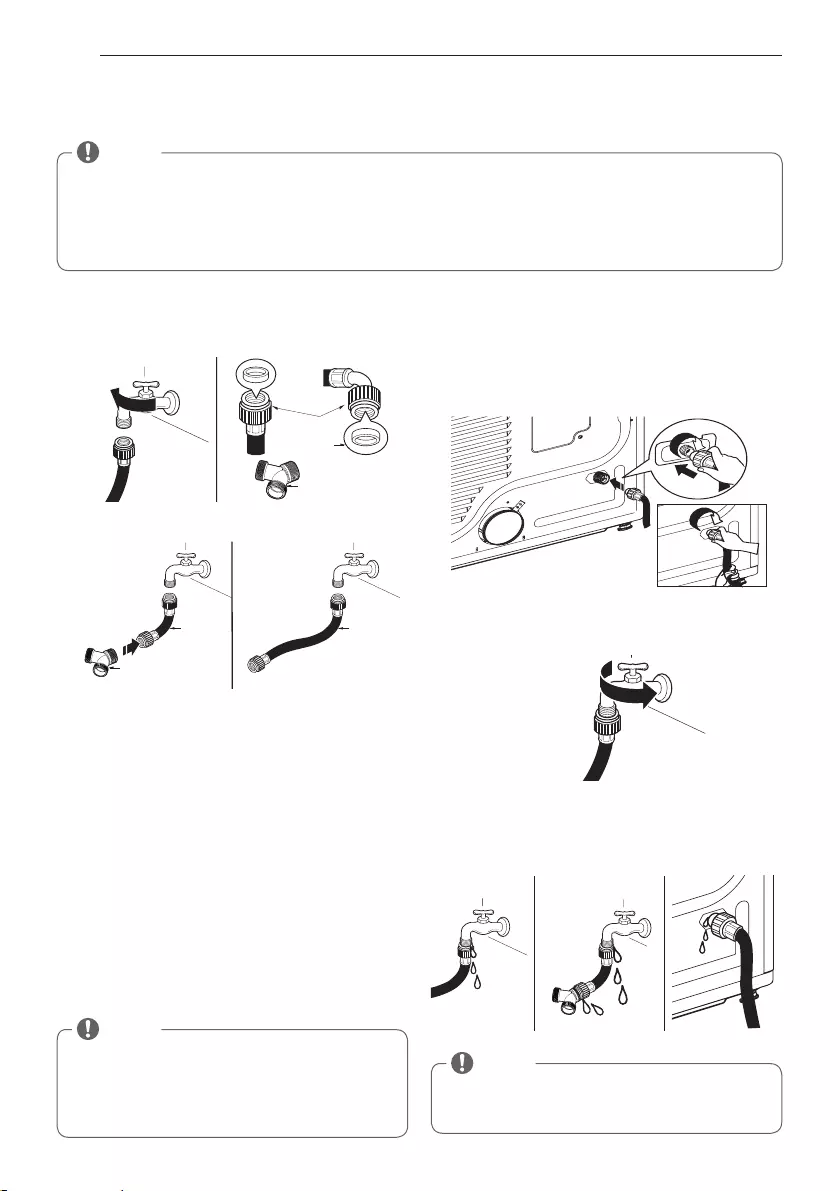
22 INSTALACIÓN
1.
Compruebe la junta de goma en la manguera de entrada.
Dos juntas de goma se suministran con cada manguera de
entrada. Se utilizan para evitar fugas de agua. Asegúrese
que la conexión al grifo de agua fría está apretada.
2. Compruebe el tipo de instalación.
a.
Cierre el grifo del agua fría y retire la manguera de la lavadora.
b. Conecte la manguera corta al conector Y mediante una
de las mangueras de la lavadora.
c. Conecte la otra extremidad de la manguera corta al grifo
de agua fría.
d.
Conecte la manguera larga de la secadora a un lateral del
conector Y y conecte la manguera de la lavadora al otro lateral.
a. Conecte la extremidad recta de la manguera larga al
grifo de agua fría.
Manguera de entrada
La secadora debe estar conectada al grifo de agua fría usando la manguera de suministro de agua nueva. No utilice la manguera de edad.
3. Conecte la manguera a la secadora.
• Conecte la manguera de suministro de agua a la
válvula de entrada de la secadora firmemente a mano
y después apriete de otras 2/3 vueltas con un alicate.
Asegúrese que la mangueras no están retorcidas y que
no están aplastadas.
4. Abra el grifo de agua fría.
5. Compruebe si hay fugas en el conector Y (si se utiliza)
y todas las mangueras.
NOTA
• Si se encuentra alguna fuga, cierre el grifo del agua,
retire la manguera y compruebe el estado de la
manguera de la arandela de la manguera.
NOTA
•
Antes de conectar la línea de agua a la secadora, enjuage
con varios galones de agua dentro del desague o cubo.
Esto ayudará a evitar que partículas extrañas como la arena
o el sarro atasquen la válvula de entrada de la secadora.
•
No apriete demasiado. El acoplamiento podría resultar dañado.
NOTA
• La presión del agua de suministro debe estar entre 138 kPa y 827 kPa (1,4 a 8,5 kgf / cm2).
• No pele o cross-thread la manguera de entrada a la válvula.
• SiInm la presión de suministro de agua es más de 827 kPa, un dispositivo de descompresión debe ser instalado.
• Si Controlar periódicamente el estado de la manguera y vuelva a colocar la manguera si es necesario.
• Sustituya las mangueras de entrada tras 5 años de uso an de reducir el riesgo de fallo de la manguera.
• Anote las fechas de instalación o sustitución de la manguera en las mangueras para referencias futuras.
Conector
de la
manguera
Conector Y
Junta de
goma
Manguera
larga
CON LAVADORA SIN LAVADORA
Manguera
corta
Conector Y
MFL67731049_sp_170714.indd 22 2017.7.14 2:22:6 PM

23
ESPAÑOL
Conexión de secadoras a gas
wADVERTENCIA
Para reducir el riesgo de incendio, descargas eléctricas o heridas al usar su electrodoméstico, siga las precauciones
básicas, incluyendo lo siguiente:
Requisitos eléctricos para modelos a gas únicamente
wADVERTENCIA
Para reducir el riesgo de incendio, descargas eléctricas o heridas al usar su electrodoméstico, siga las precauciones
básicas, incluyendo lo siguiente:
•
Si no se
cumple con esto se podrá producir una explosión,
incendio o muerte.
•
Si no
se cumple con esto se podrá producir una explosión,
incendio o muerte.
•
Si no se cumple
con esto se podrá producir una explosión, incendio o
muerte.
•
conectado a tierra adecuadamente. Si no se cumple con
esto se podrá producir una explosión, incendio o muerte
•
•
Si no
se cumple con esto se podrá producir una explosión, incendio o
muerte.
•
Si no se cumple
con esto se podrá producir una explosión, incendio o muerte.
•
Si no se
cumple con esto se podrá producir una explosión, incendio o
muerte.
•
Si no se cumple
con esto se podrá producir una explosión, incendio o muerte.
•
Si no se cumple con esto se podrá producir una
explosión, incendio o muerte.
•
el aire y sedimento del suministro de gas antes de conectar
Si no se cumple con esto
se podrá producir una explosión, incendio o muerte.
•
Si no se
cumple con esto se podrá producir una explosión, incendio o
muerte.
•
Si no se cumple con esto se podrá producir una
explosión, incendio o muerte.
•
Si no se cumple con esto se podrá producir una explosión,
incendio o muerte.
•
Si no se cumple con esto se podrá
producir una explosión, incendio o muerte.
•
Si no se cumple con esto se podra producir una explosion,
incendio o muerte.
INSTALACIÓN
wADVERTENCIA
Si no se observan las advertencias de seguridad, pueden
producirse lesiones graves o la muerte.
Esta secadora está equipada con un enchufe de tres clavijas
con conexión a tierra a fin de brindar protección contra
descargas eléctricas y debe conectarse directamente a un
receptáculo de tres terminales con una conexión a tierra
adecuada. No corte ni quite la clavija de conexión a tierra
de este enchufe.
MFL67731049_sp_170714.indd 23 2017.7.14 2:22:7 PM
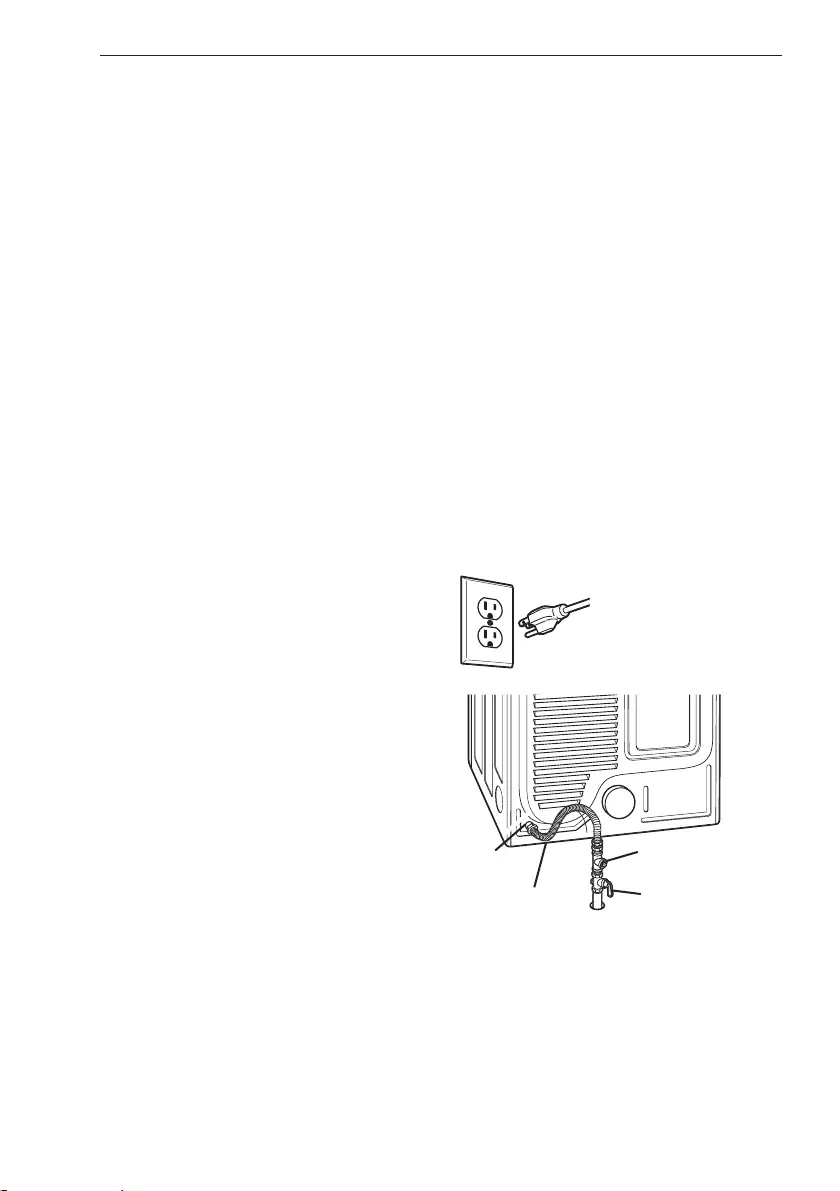
24
Conexión de secadoras a gas (cont.)
wADVERTENCIA
Para reducir el riesgo de incendio, descargas eléctricas
o heridas al usar su electrodoméstico, siga las
precauciones básicas, incluyendo lo siguiente:
•
Si no se cumple
con esto se podrá producir una explosión, incendio o
muerte.
•
Si no se cumple con esto se podrá producir una
explosión, incendio o muerte.
•
Si no se cumple con esto se podrá producir una
explosión, incendio o muerte.
•
Si no se cumple
con esto se podrá producir una explosión, incendio o
muerte.
•
Si no
se cumple con esto se podrá producir una explosión,
incendio o muerte.
•
Si no se cumple
con esto se podrá producir una explosión, incendio o
muerte.
•
Si no se cumple con esto se podrá producir
una explosión, incendio o muerte.
Conexión del suministro de gas
1. Asegúrese de que el suministro de gas al cuarto de
lavado se encuentre APAGADO.Confirme que el
tipo de gas disponible en su cuarto de lavado sea el
adecuado para la secadora. La secadora está lista para
la conexión de gas natural de 3⁄ pulgadas NPT.
2. Quite la tapa de envío de la conexión de gas localizada
de la parte trasera de la secadora.Asegúrese de no
dañar la rosca del conector de gas al quitar la tapa de
envío.
3. Conecte la secadora al suministro de gas de su cuarto
de lavado usando un conector de acero inoxidable
flexible nuevo con una conexión de 3/8 pulgadas NPT.
4. Ajuste bien todas las conexiones entre la secadora y
el suministro de gas de su cuarto de lavado. Abra el
suministro de gas de su cuarto de lavado y verifique
que no haya fugas en todas las conexiones de tubería
(tanto interiores como exteriores) usando un fluido
anticorrosivo para detección de fugas.
Conexión eléctrica
Instalaciones en lugares de gran altitud
La clasificación BTU para esta secadora es certificación
AGA para elevaciones por debajo de los 10,000 pies.
Si va a instalar su secadora a más de 10,000 pies, debe
ser desclasificada por un técnico calificado o compañía
de gas.
Enchufe la secadora en un
tomacorriente de
de tres patas
conectado a tierra.
Válvula de corte
de suministro
de gas
Conexión de
gas 3/8” NPT
Tapón de tubería
de 1/8” NPT
Conector flexible
de acero inoxidable
certificado por AGA/CSA
INSTALACIÓN
MFL67731049_sp_170714.indd 24 2017.7.14 2:22:7 PM

25
ESPAÑOL
Cómo conectar las secadoras eléctricas
wADVERTENCIA
Para ayudar a evitar incendios, descargas eléctricas, heridas
graves o muerte, el cableado e instalación a tierra deben
cumplir con la última edición del Código Eléctrico Nacional,
ANSI/NFPA 70 y todas las regulaciones locales aplicables.
Por favor comuníquese con un electricista calificado para
que controle el cableado y los fusibles y así asegurar que
su casa posee energía eléctrica adecuada para operar la
secadora.
Requisitos eléctricos únicamente para modelos eléctricos
wADVERTENCIA
Para reducir el riesgo de incendio, descargas eléctricas o
heridas al usar su electrodoméstico, siga las precauciones
básicas, incluyendo lo siguiente:
•
la secadora. Si no se cumple con esto se podrá producir
una explosión, incendio o muerte.
•
Si no se cumple con esto se podrá producir una
explosión, incendio o muerte.
•
Si no se cumple
con esto se podrá producir una explosión, incendio o
muerte.
•
y las instrucciones indicadas en las siguientes páginas.
Si no se cumple con esto se podrá producir una explosión,
incendio o muerte.
•
Si no se cumple con
esto se podrá producir una explosión, incendio o muerte.
wADVERTENCIA
Para reducir el riesgo de incendio, descargas eléctricas o
heridas al usar su electrodoméstico, siga las precauciones
básicas, incluyendo lo siguiente:
una adecuada.
Requisitos eléctricos especiales para viviendas móviles
o prefabricadas
wADVERTENCIA
Para reducir el riesgo de incendio, descargas eléctricas o
heridas al usar su electrodoméstico, siga las precauciones
básicas, incluyendo lo siguiente:
locales.
Si no se cumple
con esto se podrá producir una explosión, incendio o
muerte.
INSTALACIÓN
MFL67731049_sp_170714.indd 25 2017.7.14 2:22:7 PM
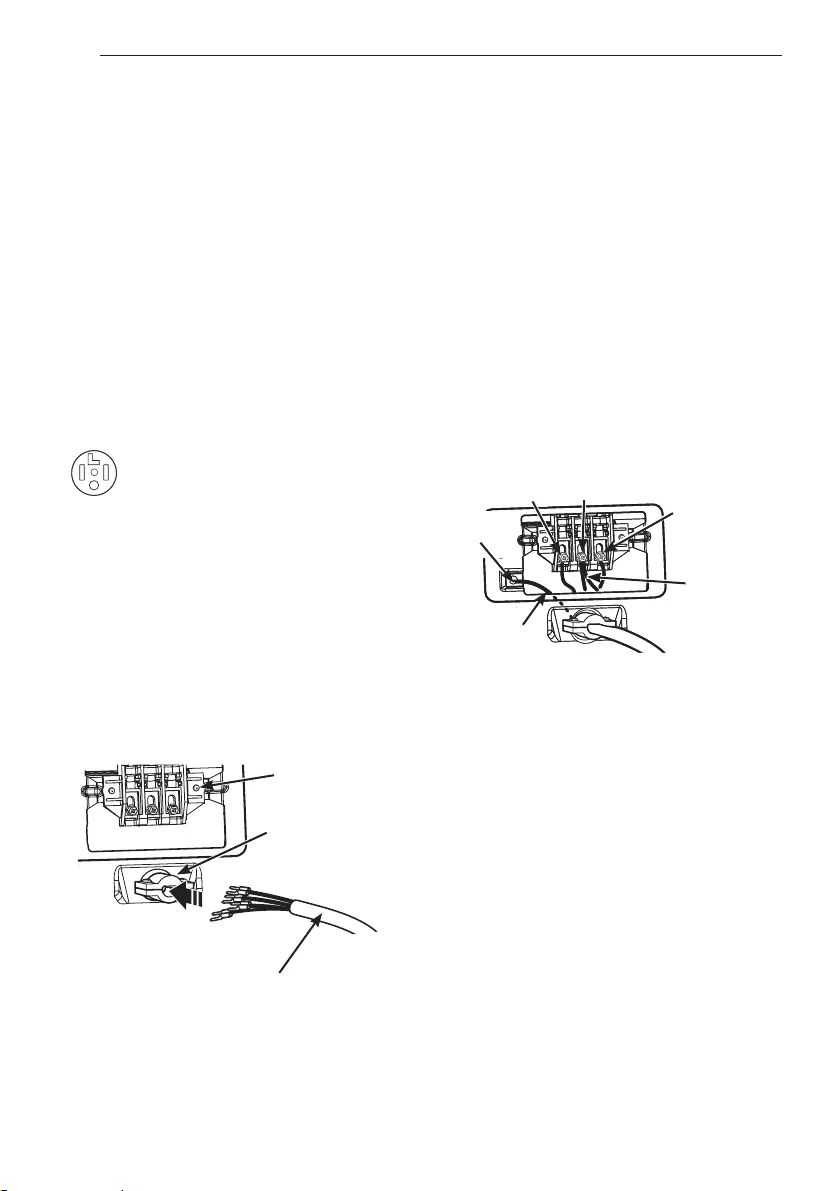
26
Cómo conectar las secadoras eléctricas (cont.)
SÓLO EE.UU.
wADVERTENCIA
•
•
tierra por el conductor neutro.
Conexión de cuatro hilos para secadoras
eléctricas: Cable eléctrico con enchufe
• Se requiere una conexión de 4 hilos en todas las
instalaciones de viviendas móviles y prefabricadas, así
como en todas las construcciones nuevas posteriores
al 1 de enero de 1996.
• Se requiere un protector de tensión listado por UL.
1. Quite la cubierta de acceso al bloque terminal
localizado en la parte superior trasera de la secadora.
Instale un protector de tensión listado por UL en el
orificio de pase del cable eléctrico; luego pase un
cable eléctrico conductor de cobre Núm.
por UL por
el protector de tensión.
• Instale un cable eléctrico de
como
mínimo y terminales de bucle cerrado o de horquilla
con extremos doblados hacia arriba.
2. Transfiera el alambre de conexión a tierra de la
secadora detrás del tornillo de conexión a tierra de
color verde al tornillo central del bloque terminal.
Conecte los dos conductores calientes del cable
eléctrico a los tornillos del bloque terminal exterior.
Conecte el cable neutro de color blanco al tornillo
del bloque terminal central. Conecte el alambre de
conexión a tierra del cable eléctrico al tornillo de
conexión a tierra de color verde.
. Reinstale la
cubierta de acceso del bloque terminal.
Caliente
(negro)
Alambre de
conexión
a tierra del
cable eléctrico
Tornillo de
conexión a
tierra
Cable blanco
movido de
tornillo de
conexión a
tierra
Neutro
(blanco) Caliente
(rojo)
Protector de tensión
listado por UL
Cable eléctrico
de cuatro hilos
listado por UL
Bloque
terminal
INSTALACIÓN
MFL67731049_sp_170714.indd 26 2017.7.14 2:22:9 PM
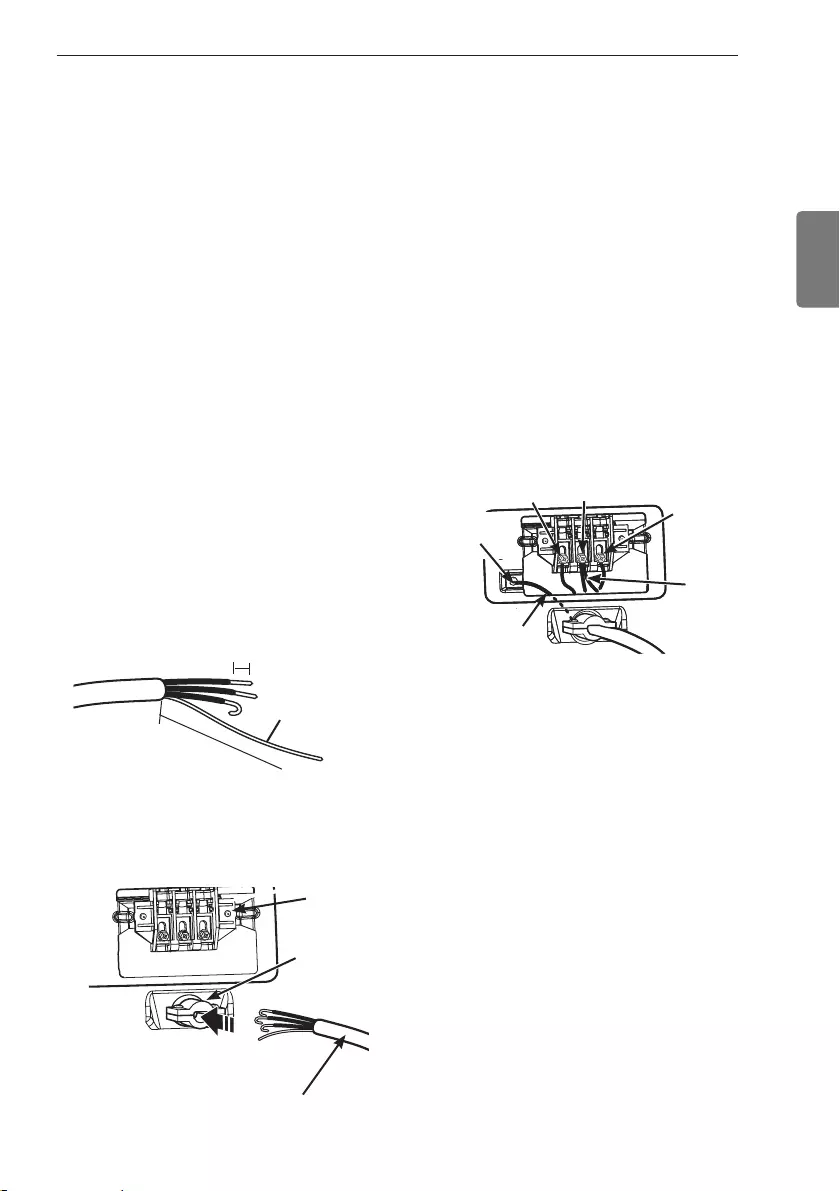
27
ESPAÑOL
wADVERTENCIA
a tierra por el conductor neutro.
Conexión de cuatro hilos para secadoras eléctricas:
Conexión directa
• Se requiere una conexión de 4 hilos en todas las
instalaciones de viviendas móviles y prefabricadas, así
como en todas las construcciones nuevas posteriores
al 1 de enero de 1996.
• Se requiere un protector de tensión listado por UL.
1. Despegue 5 pulg (12,7 cm) de la cubierta del cable
del final. Descubra 5 pulg. de aislamiento del cable de
conexión a tierra. Corte aproximadamente 11⁄2 pulg.
(3,8 cm) de los otros 3 cables y despegue 1 pulg. (2,5
cm) del aislamiento del cado uno. Haga los finales de
los 3 cables en forma de gancho.
2. Quite la cubierta de acceso al bloque terminal
localizado en la parte superior trasera de la secadora.
Instale un protector de tensión listado por UL en el
orificio de pase del cable eléctrico; luego pase el cable
eléctrico fabricado en el Paso 1 por el protector de
tensión.
Alambre de
conexión a tierra
5"
(12,7 cm)
1" (2,5 cm)
Cómo conectar las secadoras eléctricas (cont.)
SÓLO EE.UU.
• Instale un cable eléctrico listado por UL con
.
• Prepare un mínimo de 5 pies (1,5 m) de longitud para
poder quitar y reemplazar la secadora.
3. Transfiera el alambre de conexión a tierra de la
secadora detrás del tornillo de conexión a tierra de
color verde al tornillo central del bloque terminal.
Conecte los dos conductores calientes del cable
eléctrico a los tornillos del bloque terminal exterior.
Conecte el cable neutro de color blanco al tornillo
del bloque terminal central. Conecte el alambre
de conexión a tierra del cable eléctrico al tornillo
de conexión a tierra de color verde.
. Reinstale la cubierta de
acceso del bloque terminal.
Protector de
tensión listado
por UL
Cable eléctrico de cuatro
hilos listado por UL
Bloque
terminal
Caliente
(negro)
Alambre de
conexión
a tierra del
cable eléctrico
Tornillo de
conexión a
tierra
Cable blanco
movido de
tornillo de
conexión a
tierra
Neutro
(blanco) Caliente
(rojo)
INSTALACIÓN
MFL67731049_sp_170714.indd 27 2017.7.14 2:22:10 PM
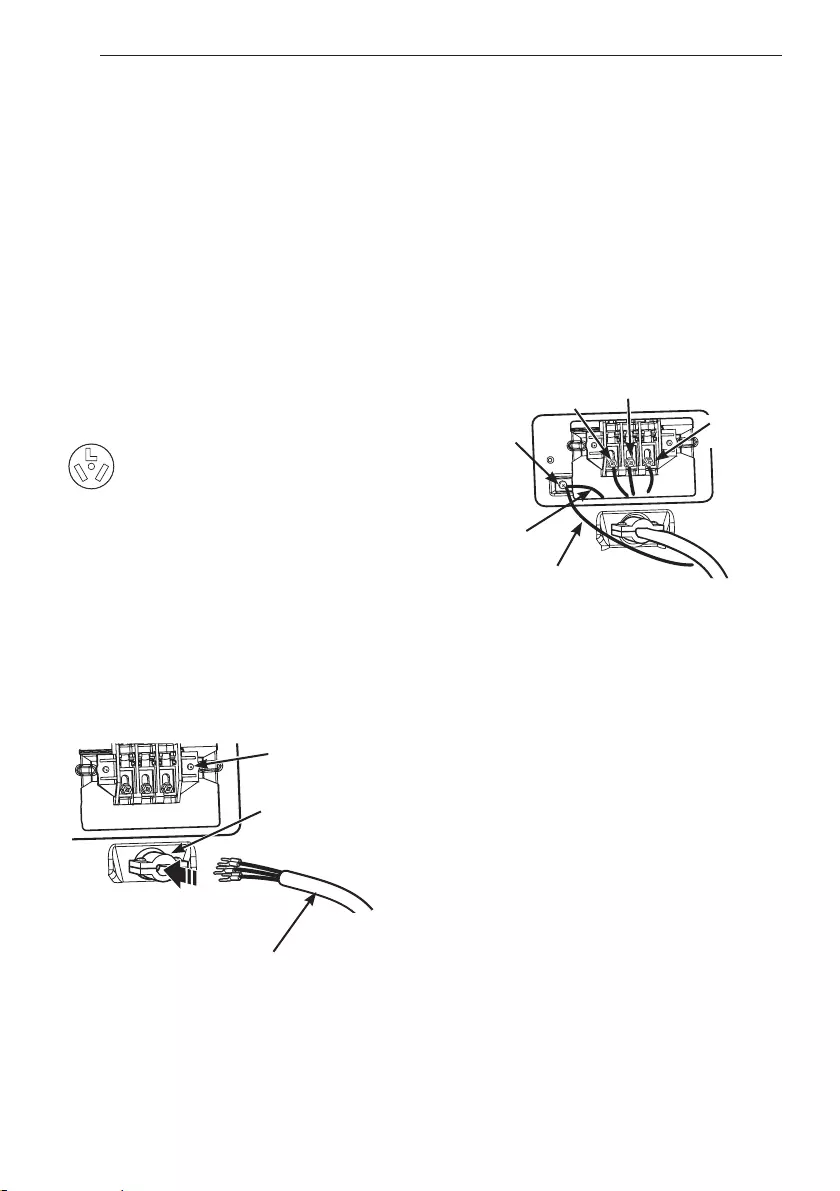
28
Cómo conectar las secadoras eléctricas (cont.)
SÓLO EE.UU.
wADVERTENCIA
incendio o muerte.
Conexión de tres hilos para secadoras
eléctricas: Cable eléctrico con enchufe
• NO se permite una conexión de 3 hilos en
construcciones nuevas después del 1 de enero de
1996.
• Se requiere un protector de tensión listado por UL.
1. Quite la cubierta de acceso al bloque terminal
localizado en la parte superior trasera de la secadora.
Instale un protector de tensión listado por UL en el
orificio de pase del cable eléctrico; luego pase un
cable eléctrico conductor de cobre Núm.
por UL
por el protector de tensión.
• Instale un cable eléctrico de
y terminales de bucle cerrado o de horquilla
con extremos doblados hacia arriba.
2. Conecte los dos conductores calientes del cable
eléctrico a los tornillos del bloque terminal exterior.
Conecte el cable neutro al tornillo del bloque terminal
central. Conecte la conexión a tierra exterior (de
ser requerido por los códigos locales) al tornillo de
color verde. .
Reinstale la cubierta de acceso del bloque terminal.
Protector de tensión
listado por UL
Cable eléctrico
de tres hilos
listado por UL
Bloque
terminal
Tornillo de
conexión
a tierra
Neutro
(blanco)
Caliente
(negro)
Caliente
(rojo)
Conexión a tierra
exterior (de ser
requerido por los
códigos locales)
Hilo
blanco de
estructura
de secadora
INSTALACIÓN
MFL67731049_sp_170714.indd 28 2017.7.14 2:22:11 PM
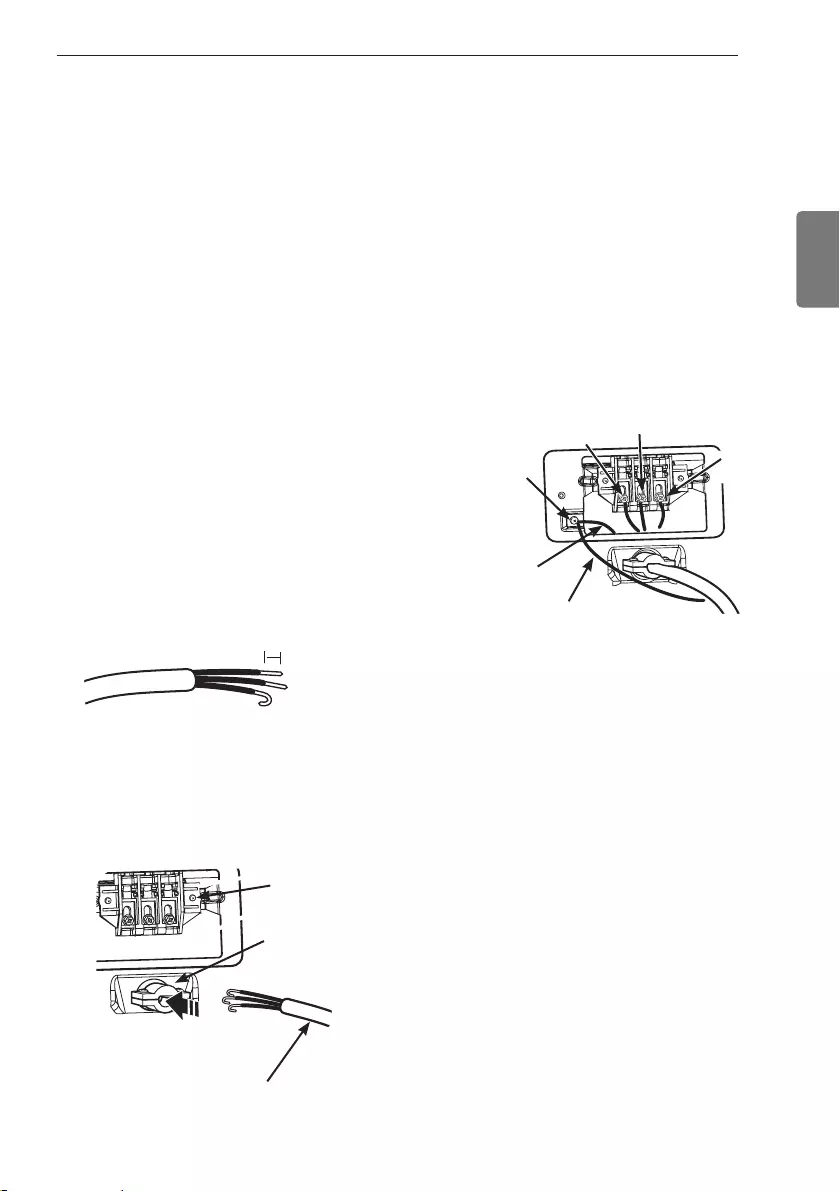
29
ESPAÑOL
Cómo conectar las secadoras eléctricas (cont.)
SÓLO EE.UU.
wADVERTENCIA
a tierra por el conductor neutro.
Conexión de tres hilos para secadoras eléctricas:
Conexión directa
• NO se permite una conexión de 3 hilos en
construcciones nuevas después del 1 de enero de
1996.
• Se requiere un protector de tensión listado por UL.
1. Despegue 31⁄ pulg. (8,9 cm) de la cubierta del cable
del final. Despegue 1 pulg. (2,5 cm) del aislamiento
decada alambre. Haga los finales de los 3 cables en
forma de gancho.
2. Quite la cubierta de acceso al bloque terminal
localizado en la parte superior trasera de la secadora.
Instale un protector de tensión listado por UL en el
orificio de pase del cable eléctrico; luego pase el cable
eléctrico fabricado en el Paso 1 por el protector de
tensión.
• Instale un cable eléctrico listado por UL con
.
• Prepare un mínimo de 5 pies (1,5 m) de longitud para
poder quitar y reemplazar la secadora.
3. Conecte los dos conductores calientes del cable
eléctrico a los tornillos del bloque terminal exterior.
Conecte el cable neutro al tornillo del bloque terminal
central. Conecte la conexión a tierra exterior (de
ser requerido por los códigos locales) al tornillo de
color verde. .
Reinstale la cubierta de acceso del bloque terminal.
1" (2,5 cm)
Protector de tensión
listado por UL
Cable eléctrico de tres
hilos listado por UL
Bloque
terminal
Tornillo de
conexión
a tierra
Neutro
(blanco)
Caliente
(negro)
Caliente
(rojo)
Conexión a tierra
exterior (de ser
requerido por los
códigos locales)
Hilo
blanco de
estructura
de secadora
INSTALACIÓN
MFL67731049_sp_170714.indd 29 2017.7.14 2:22:12 PM
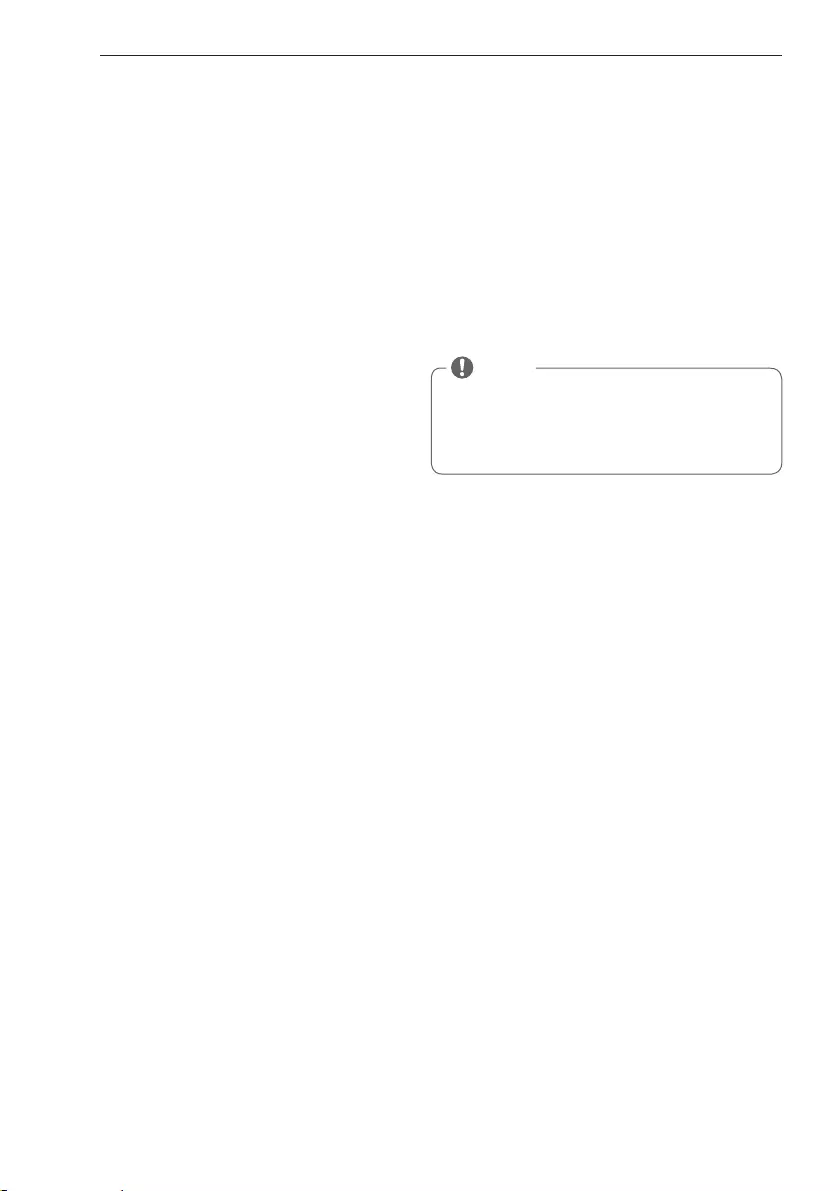
30
Requisitos especiales para viviendas
móviles o prefabricadas
Cualquier instalación en una vivienda móvil o
prefabricada debe realizarse de conformidad con los
Estándares de seguridad y construcción de viviendas
prefabricadas, Título 24 CFR, Parte 3280 o estándar CAN/
CSA Z240 MH y con los códigos y regulaciones locales.
Si no está seguro de si la instalación que ha propuesto
cumple con estos estándares, llame a un técnico de
mantenimiento e instalación para obtener ayuda.
• Una secadora de gas debería fijarse permanentemente
sobre el piso.
• La conexión eléctrica de una secadora eléctrica debe
ser una conexión de 4 hilos. Se provee información
más detallada pertinente a la conexión eléctrica en la
sección Cómo conectar las secadoras eléctricas.
• Para reducir el riesgo de combustión e incendio, se
debe ventilar la secadora hacia el exterior.
• NO ventile la secadora debajo de una vivienda móvil o
prefabricada.
• Las secadoras eléctricas deben ventilarse hacia el
exterior usando el panel trasero, izquierdo, derecho o
inferior.
• Las secadoras a gas deben ventilarse al exterior usando
el panel trasero, izquierdo o inferior. Las secadoras a
gas no deben ventilarse hacia el exterior usando el
panel derecho debido a la carcasa del quemador.
• El conducto de escape de la secadora debe estar
bien fijado a la estructura de la vivienda móvil o
prefabricada, y el conducto de escape debe estar
fabricado de un material resistente al fuego y la
combustión. Se recomienda el uso de un conducto de
metal rígido o flexible.
• NO conecte el conducto de escape de la secadora a
ningún otro conducto, respiradero, chimenea ni a
ningún otro tipo de conducto de escape.
• Asegúrese de que la secadora disponga de acceso
adecuado al aire fresco del exterior para garantizar un
funcionamiento adecuado. La abertura para la toma
de aire fresco exterior debe ser de por lo menos 25
pulgadas2 (163 cm2).
• Es importante que el espacio libre del conducto
con respecto a cualquier material combustible de
construcción sea de por lo menos 2 pulgadas (5 cm)
y que, cuando se ventile la secadora al exterior, se
pueda instalar la secadora dejando un espacio libre de
1 pulgada (2,5 cm) a los lados y la parte trasera de la
secadora.
• Tenga en cuenta que los materiales de ventilación
no se proveen con la secadora. Debe obtener los
materiales de ventilación necesarios para una
instalación adecuada.
Revisión de instalación final
Una vez que haya completado la instalación de la
secadora y la misma se encuentre en su ubicación final,
confirme que funcione correctamente realizando las
siguientes pruebas.
Comprobación del calentamiento de la secadora
Cierre la puerta de la secadora, apriete el interruptor
ON/OFF para encender la secadora, e iniciar la secadora
en un ajuste de calor.Cuando inicia la secadora, el
encendedor deberá encender el quemador principal.
Cierre la puerta de la secadora, apriete el interruptor
ON/OFF para encender la secadora, e iniciar la secadora
en un ajuste de calor. El escape de aire deberá estar
caliente después de que la secadora haya funcionado
durante 3 minutos.
Revisión del flujo de aire
El funcionamiento efectivo de la secadora requiere de
un flujo de aire adecuado. La corrección del flujo de aire
puede medirse evaluando la presión estática. La presión
estática del conducto del escape se puede medir con
un manómetro, colocado en el conducto de escape
aproximadamente a 2 pies (60,9 cm) de distancia de la
secadora. La presión estática del conducto de escape
no debería exceder las 0,6 pulgadas (1,5 cm). Se debe
revisar la secadora mientras está funcionando sin carga
Revisión del nivelado
Una vez que la secadora se encuentra en su ubicación
final, vuelva a revisar que la misma se encuentre
nivelada. Asegúrese de que esté nivelada de adelante
hacia atrás y de lado a lado, y de que las cuatro patas
niveladoras se encuentren asentadas en el piso
firmemente.
NOTA
Si no se purga todo el aire de la línea de gas, el
encendedor de gas podría apagarse antes de que se
encienda el quemador. Si esto sucede, el encendedor
volverá a intentar encender el gas después de
aproximadamente dos minutos.
INSTALACIÓN
MFL67731049_sp_170714.indd 30 2017.7.14 2:22:12 PM
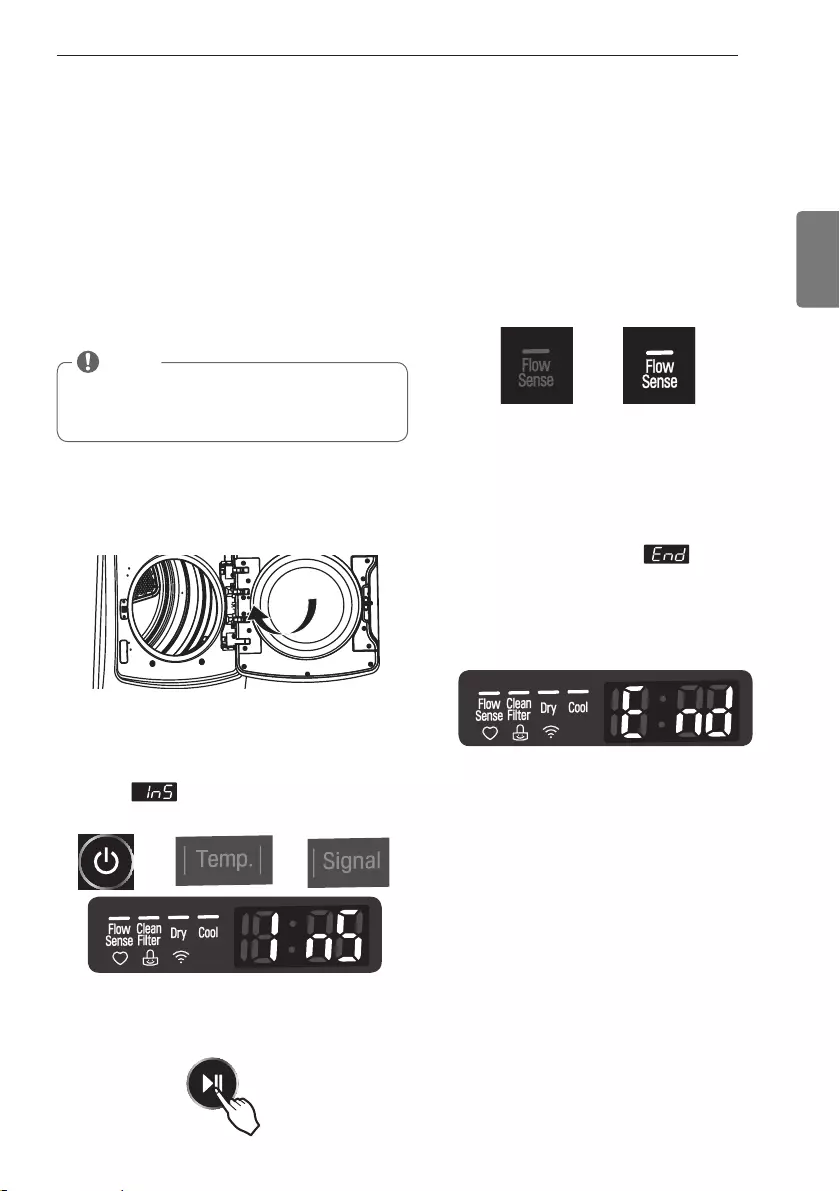
31
ESPAÑOL
Prueba de Instalación
(Comprobación del sistema de
evacuación)
Una vez haya instalado la secadora, haga este prueba
para asegurarse de que las condiciones del sistema de
evacuación son las adecuadas para el funcionamiento
correcto de la secadora. Este prueba tiene como
objetivo mostrarle si existe algún problema importante
en el sistema de evacuación de su vivienda.
• Esta secadora cuenta con el sistema FLOW SENSE™, un
sistema innovador que detecta automáticamente los
bloqueos y restricciones en la tubería de la secadora.
Mantener la tubería sin acumulación de pelusa y libre
de restricciones le permitirá secar la ropa más rápido y
reducir el gasto de energía.
1.
cierre la puerta. No meta nada en el tambor cuando
se disponga a hacer este prueba porque podría influir
en la precisión de los resultados.
2.
segundos
Esta secuencia de botones activa el test de instalación.
El código
aparecerá en la pantalla de visuali-
zación si la activación se ha realizado con éxito.
3.
La secadora iniciará el prueba, que durará alrededor
de dos minutos. Se encenderá el calor y se medirán
las temperaturas en el tambor.
4.
Durante el ciclo de prueba, observe la pantalla de
Flow Sense™ en el panel de control. Si el texto del
indicador de Flow Sense se ilumina, el sistema de
escape está restringido. Si el texto del indicador
permanece apagado, la operación del sistema de
escape es adecuada. Si existen otros problemas, estos
se le indicarán con códigos de error. Consulte en la
página siguiente el listado de códigos de error y sus
soluciones.
Revise el sistema de inmediato, ya que de no hacerlo el
funcionamiento será muy deficiente.
5.
Al finalizar el prueba aparecerá en la pantalla
de visualización. Una vez haya terminado este ciclo,
la secadora se apagará automáticamente después de
unos momentos.
NOTA
La secadora deberá estar fría antes de iniciar el prueba.
Si la unidad se ha calentado durante la instalación,
active el sistema SECADO CON AIRE (AIR DRY) durante
unos minutos para reducir la temperatura interior. APAGADO:
CORRECTO
ILUMINADO
RESTRICCIÓN
INSTALACIÓN
MFL67731049_sp_170714.indd 31 2017.7.14 2:22:27 PM
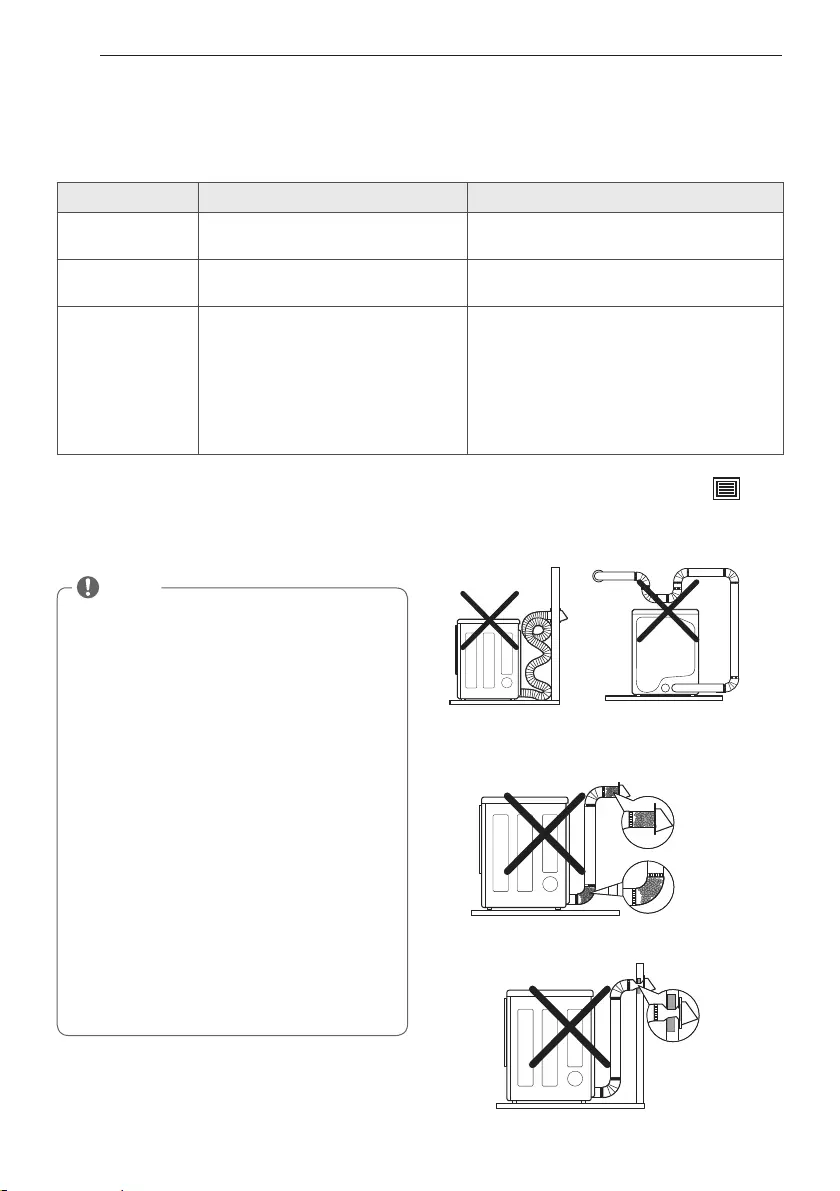
32
Prueba de instalación (Conducto de comprobar) (cont.)
• Compruebe el código de error antes de llamar al servi-
cio técnico
Si el LED de FLOW SENSE se enciende, compruebe que
no haya restricciones o daños en el sistema de vaciado.
Repare o reemplace el sistema de evacuación según
sea necesario.
Código de error Causas posibles Soluciones
o
• Fallo del sensor de temperatura. • Apague la secadora y llame al
servicio técnico.
• Fallo del sensor de humedad. • Apague la secadora y llame al
servicio técnico.
o
o
• El cable de alimentación no está
conectado correctamente o el
suministro eléctrico de la vivienda es
incorrecto.
• Se han fundido los fusibles, ha saltado
el disyuntor o ha habido un apagón.
•
Compruebe el suministro eléctrico o la conexión
del cable de alimentación al enchufe. Consulte la
sección “Cómo conectar las secadoras eléctricas” de
este manual para las instrucciones completas.
•
Reactive el disyuntor o reemplace el fusible. No
incremente la capacidad del fusible. Si el problema
es una sobrecarga del circuito, solicite los servicios
de un electricista calicado.
NOTA
Cuando recién se instala la secadora, debe realizarse
esta prueba para alertarlo sobre cualquier clase de
problemas con el conducto de extracción de su hogar.
Sin embargo, puesto que la prueba realizada durante
un funcionamiento normal ofrece una información
más precisa información más precisa sobre el estado
del conducto de extracción que la prueba de insta-
lación, la cantidad de barras visualizadas durante las
dos pruebas puede no ser la misma.
No interrumpa el prueba, ya que de caso contrario
podría obtener resultados erróneos.
Aunque no se ilumine ninguna barra tras el ciclo de
prueba, es posible que existan algunas restricciones
en el sistema de evacuación. Consulte la sección
“Instalación del conducto de ventilación” en este
manual para conocer todos los requisitos del sistema
de evacuación y de ventilación.
Esta secadora cuenta con el sistema Flow Sense™, un
sistema innovador que detecta automáticamente los
bloqueos y restricciones en la tuberia de la secadora.
Mantener la tuberia sin acumulacion de pelusa y libre
de restricciones le permitirá secar la ropa más rápido y
reducir el gasto de energia.
INSTALACIÓN
Evite funcionamientos prolongados o
funcionamientos con múltiples formaciones de
torceduras o codos.
Conducto demasiado
largo o muy torcido
Tubería demasiado larga
o con demasiados codos
Controle los bloqueos y la acumulación de pelusa.
Asegúrese que la tubería no posea cortes ni restricciones.
Tubería
estrangulada
o bloqueada
Acumulación
de pelusa o
bloqueo
MFL67731049_sp_170714.indd 32 2017.7.14 2:22:31 PM
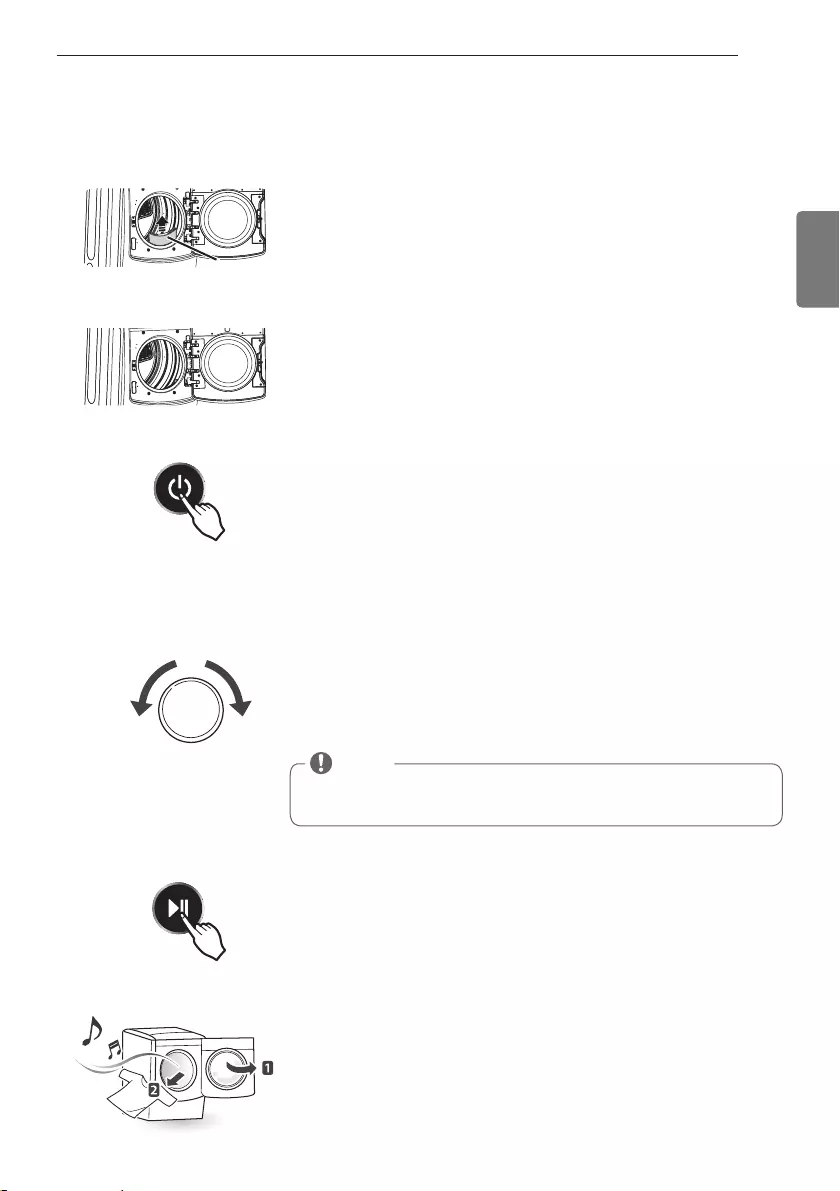
33
ESPAÑOL
CÓMO USAR
Funcionamiento de la secadora
ENCENDER LA SECADORA
Presione el botón ENCENDIDO/APAGADO (POWER) para encender la secadora.
Si se enciende, los LEDs de ciclo se iluminarán y se emitirá un aviso sonoro.
Consulte la página 11.
3
INICIAR EL CICLO
Presione el botón INICIO/PAUSA(START/PAUSE) para que comience el ciclo.
El ciclo puede ser pausado en cualquier momento abriendo la puerta o
presionando el botón INICIO/PAUSA (START/PAUSE). Si no vuelve a iniciarse el
ciclo tras 4 minutos, la secadora se apagará y los ajustes del ciclo se perderán.
5
SELECCIONAR UN CICLO
Gire el mando del selector de ciclo en cualquier sentido hasta que se ilumine
el LED del ciclo que desee. Se mostrarán los ajustes preestablecidos de
temperatura, nivel de secado y opción para este ciclo. Consulte la página 34.
Los ajustes predeterminados para el ciclo seleccionado podrán cambiarse
ahora si lo desea. Esto puede llevarse a cabo utilizando los botones
modificadores de ciclo tal y como se muestra en la página 37. Las opciones de
ciclo pueden añadirse utilizando los botones de opción tal y como se muestra
en la página 37-40.
4
NOTA
No todas las opciones ni modificadores están disponibles para todos los
ciclos. Se escuchará un sonido diferente y la luz LED no se iluminará si la
selección no está permitida.
CARGAR LA SECADORA
Cargue en la secadora la carga húmeda procedente de la lavadora. Si la carga
es muy grande, deberá dividirla en cargas más pequeñas para obtener un buen
rendimiento y proteger los tejidos.
2
LIMPIAR EL FILTRO DE PELUSAS
Si aún no ha limpiado el filtro de pelusas, extráigalo y elimine las pelusas
procedentes de la última carga. Esto le ayudará a asegurar un funcionamiento
más rápido y eficiente de secado.
1
Filtro de
pelusa
CÓMO USAR
FIN DEL CICLO
Al finalizar el ciclo, si lo tiene ajustado, oirá un aviso sonoro. Retire
inmediatamente sus prendas de la secadora para reducir las arrugas. Si tiene
seleccionada la función CUIDADO DE ARRUGAS (WRINKLE CARE), la secadora
volteará brevemente la carga cada pocos minutos para ayudar a prevenir la
aparición de arrugas en sus prendas.
6
MFL67731049_sp_170714.indd 33 2017.7.14 2:35:17 PM
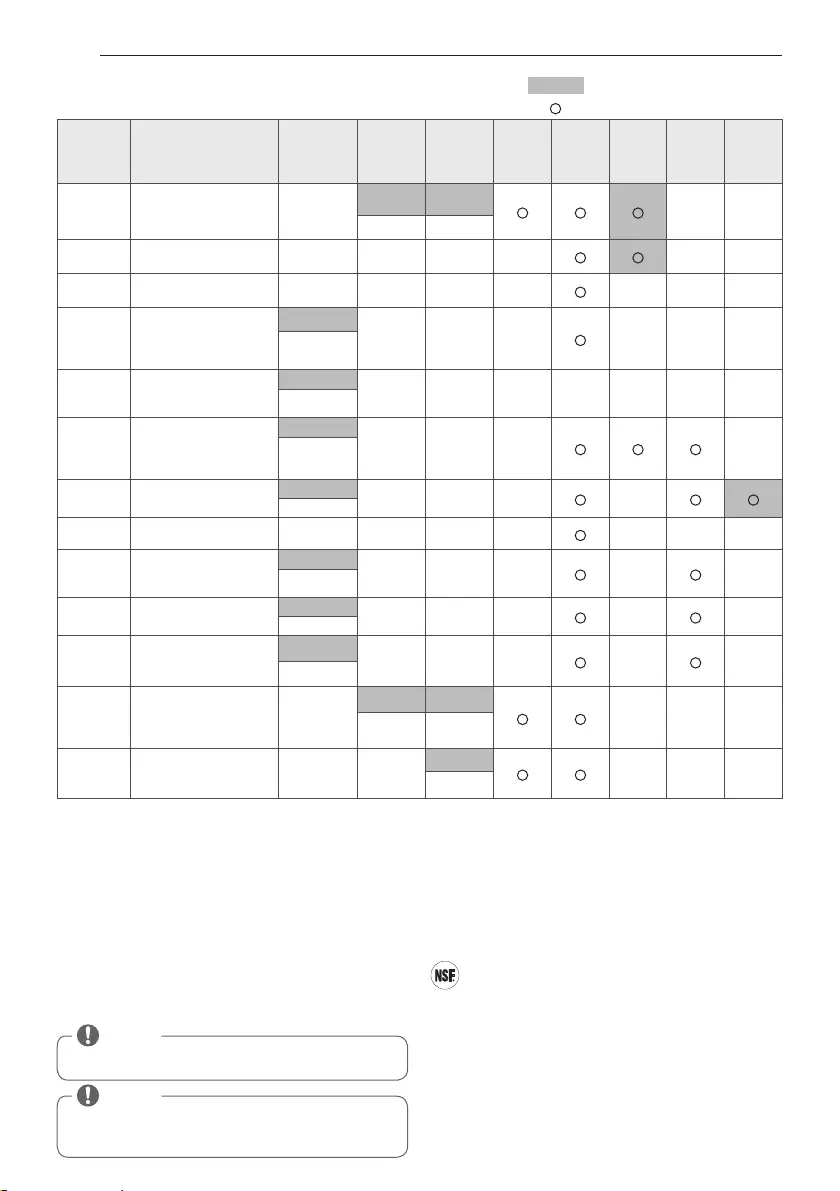
34
Guía de ciclos
CÓMO USAR
Ciclos de SECADO CON SENSOR (SENSOR DRY)
Los ciclos de SECADO CON SENSOR utilizan el sistema exclusivo
de sensor doble de LG para detectar y comparar el nivel de
humedad en las prendas y en el aire, y programar el tiempo
de secado del modo necesario para asegurar resultados
superiores. La secadora ajusta automáticamente el nivel de
sequedad y temperatura del ajuste recomendado para cada
ciclo. El tiempo restante estimado se mostrará en la pantalla.
LowTemp Dry (secado a baja temp.)
Este ciclo puede ahorrar mas energia que el ciclo Normal,
dependiendo del tamano de la carga. Puede ser necesario
ajustar el Nivel de Secado para lograr el nivel de secado deseado.
Ciclos de SECADO MANUAL (MANUAL DRY)
Use los ciclos de SECADO MANUAL para seleccionar una
cantidad especifica de tiempo y temperatura de secado.
Cuando se selecciona el ciclo de SECADO MANUAL, la
pantalla de TIEMPO RESTANTE ESTIMADO (ESTIMATED
TIME REMAINING) muestra el tiempo restante real en su
ciclo. Puede cambiar el tiempo real en el ciclo apretando
MÁS TIEMPO (MORE TIME) o MENOS TIEMPO (LESS TIME).
NSF International (anteriormente, National Sanitation
Foundation, Fundación Nacional de Saneamiento),
certifica que el ciclo de desinfección reduce
el 99,9% de las bacterias presentes en la colada y que no
se transmitirá ninguna bacteria a la siguiente carga.
• Los ajustes predeterminados para el ciclo
son temperatura y secado . Estos ajustes
predeterminados no se pueden cambiar.
• NO utilice este ciclo para prendas o tejidos delicados.
NOTA
Para proteger sus prendas, no todos los niveles, temperatura u opciones
están disponible con cada ciclo. Consulte la guía de ciclos para los detalles.
NOTA
El ahorro de energía es la opción por defecto en el ciclo Normal.
Puede desactivar la opción de ahorro de energía para un ciclo
Normal más rapido que comienza con secado caliente.
secado
tiempo
de
arrugas
Steam
Sonido
de
secado
de
Steam
FreshTM
Acolchados, camisas,
pantalones (excepto
prendas muy delicadas)
Apagado
Media
Alta
10
Regulable Regulable
Steam
SanitaryTM Acolchados, ropa de
cama, ropa de niños. Apagado Alta
31
Anti
Bacterial
No utilizar este ciclo
con prendas delicadas.
Muy Alta
70
Secado a
BajaTemp
(LowTemp
Dry)
Sólo prendas normales
y/tipo toallas
(máx. aprox.1,5 kg)
Normal
Alta
50
Regulable
Ropa de
cama
(Bedding)
Acolchados,
almohadas, camisas.
Normal Media
55
Regulable
Secado
Intenso
(Heavy
Duty)
Vaqueros, prendas
pesadas.
Normal
Alta
54
Regulable
Normal
(Normal) Ropa de trabajo, pana,
etc.
Normal Media
Elec : 57
Gas : 63
*
Regulable
Ropa de-
Portiva Ropa deportiva Apagado - 27
Planchado
Perm.
(Perm.Press)
Prendas sintéticas,
planchado
permanente.
More Baja
32
**
Regulable
Delicado
(Delicates) Lencería, sábanas,
blusas
Normal Baja
28
Regulable
Toallas
(Towels)
Prendas vaqueras,
toallas, algodón
resistente.
Normal Media
Alta
55
Regulable
Secado
Rápido
(Speed
Dry)
Para poca carga con
tiempos de secado
cortos. Apagado
Alta
25
Regulable Regulable
Secado Por
Aire
(Air Dry)
Para prendas que no
precisan calor, por
llevar plástico o goma
Apagado Apagado
30
Regulable
*
La opción TurboSteam se puede seleccionar solamente si el modo de ahorro de energía está desactivado.
**
Solo se puede seleccionar TurboSteam si estan activados los niveles de secado Muy(Very) o Mas(More).
= configuración por defecto
= opción permisible de
MFL67731049_sp_170714.indd 34 2017.7.14 2:22:41 PM
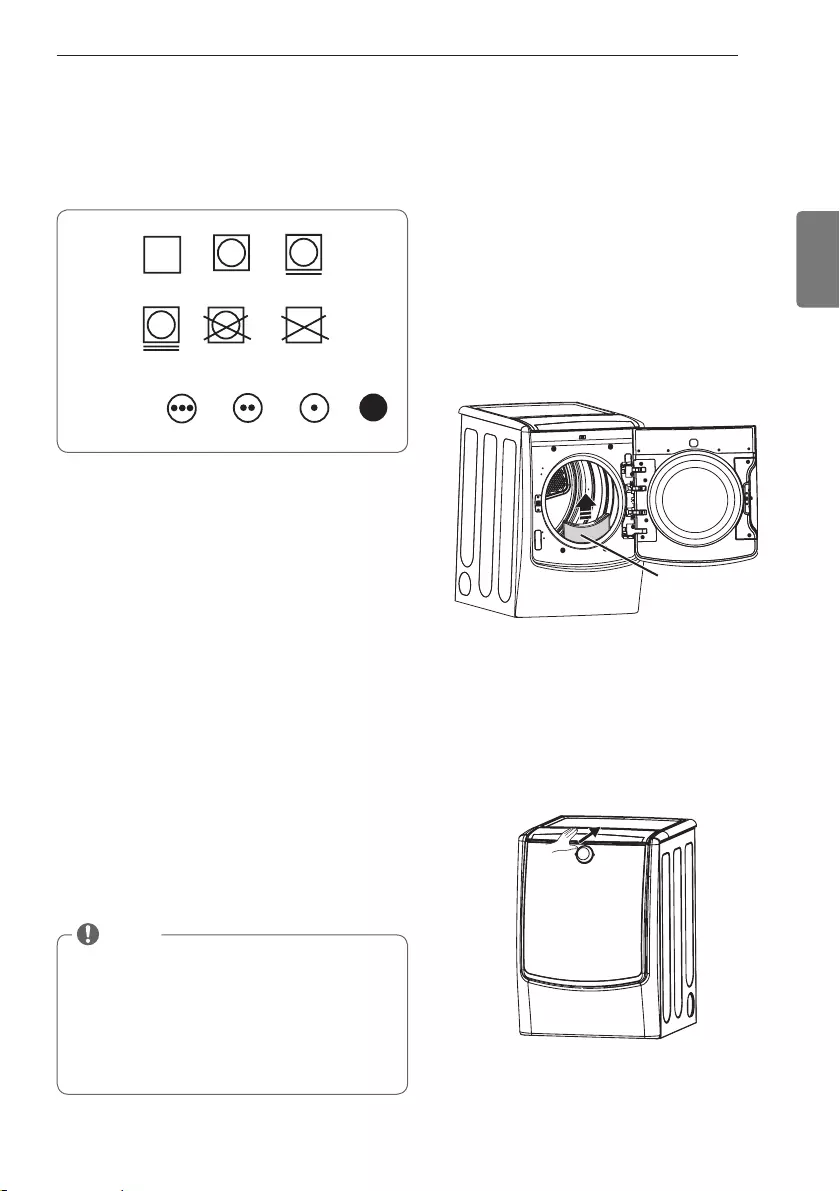
35
ESPAÑOL
Revise el filtro de pelusa antes de
cada uso
Asegúrese siempre de que el filtro de pelusa esté limpio
antes de iniciar una carga nueva; un filtro de pelusa
bloqueado incrementará los tiempos de secado.
Para limpiarlo, tire del filtro de pelusa verticalmente y,
con los dedos, enrolle cualquier pelusa para retirarla del
filtro. No enjuague ni lave el filtro para eliminar la pelusa.
Empuje el filtro de pelusa firmemente en su lugar. Para
informacaión adicional, vea la sección LIMPIEZA REGULAR.
Asegúrese siempre de que el filtro de pelusa esté instalado
adecuadamente antes de poner en funcionamiento la
secadora. Hacer funcionar la secadora sin el filtro o con
un filtro de pelusa suelto podría dañar la secadora y los
artículos en el interior de la misma.
Almacenamiento bajo la Tapa
· Bajo la tapa hay tres pequenos espacios de
almacenamiento.
· Para abrir la tapa, deslicela hacia atras.
wADVERTENCIA
No almacene sustancias inflamables ni adhesivos bajo la
tapa.
Clasificación de cargas
Etiquetas de mantenimiento de las telas
La mayoría de las prendas de vestir tienen etiquetas
de mantenimiento de las telas para lograr un
mantenimiento adecuado.
Agrupamiento de prendas similares
Para obtener los mejores resultados, clasifique las prendas en
cargas que puedan secarse con el mismo ciclo de secado.
Los diferentes tipos de telas tienen diferentes requisitos de
cuidado, y algunas telas se secarán más rápido que otras.
Cómo cargar la secadora
wADVERTENCIA
Para reducir el riesgo de incendio, descargas eléctricas
o heridas al usar su electrodoméstico, siga las
precauciones básicas, incluyendo lo siguiente:
•
Si no se cumple con esto se
podrá producir una explosión, incendio o muerte.
•
residuos de aceite. Si no se cumple con esto se podrá
producir una explosión, incendio o muerte.
NOTA
Consejos útiles de carga
• Combine prendas grandes y pequeñas en una carga.
• Las prendas húmedas se extenderán mientras
se secan. No sobrecargue la secadora; las
prendas necesitan de espacio para girar y secar
adecuadamente.
• Cierre las cremalleras, ganchos y cordones para
prevenir que estos artículos se enganchen o enreden
en otras prendas.
Secado a
máquina
Seco Planchado permanente
/
antiarrugas
Suave/
delicado
No secar
a máquina
No secar
(utilizado junto
a “no lavar”)
Normal
Etiquetas de cuidado de las telas
Ajuste
de calor
Alto Mediano Bajo Sin calor/aire
Secado a
máquina
Seco Planchado permanente
/
antiarrugas
Suave/
delicado
No secar
a máquina
No secar
(utilizado junto
a “no lavar”)
Normal
CÓMO USAR
Filtro de
pelusa
MFL67731049_sp_170714.indd 35 2017.7.14 2:22:42 PM
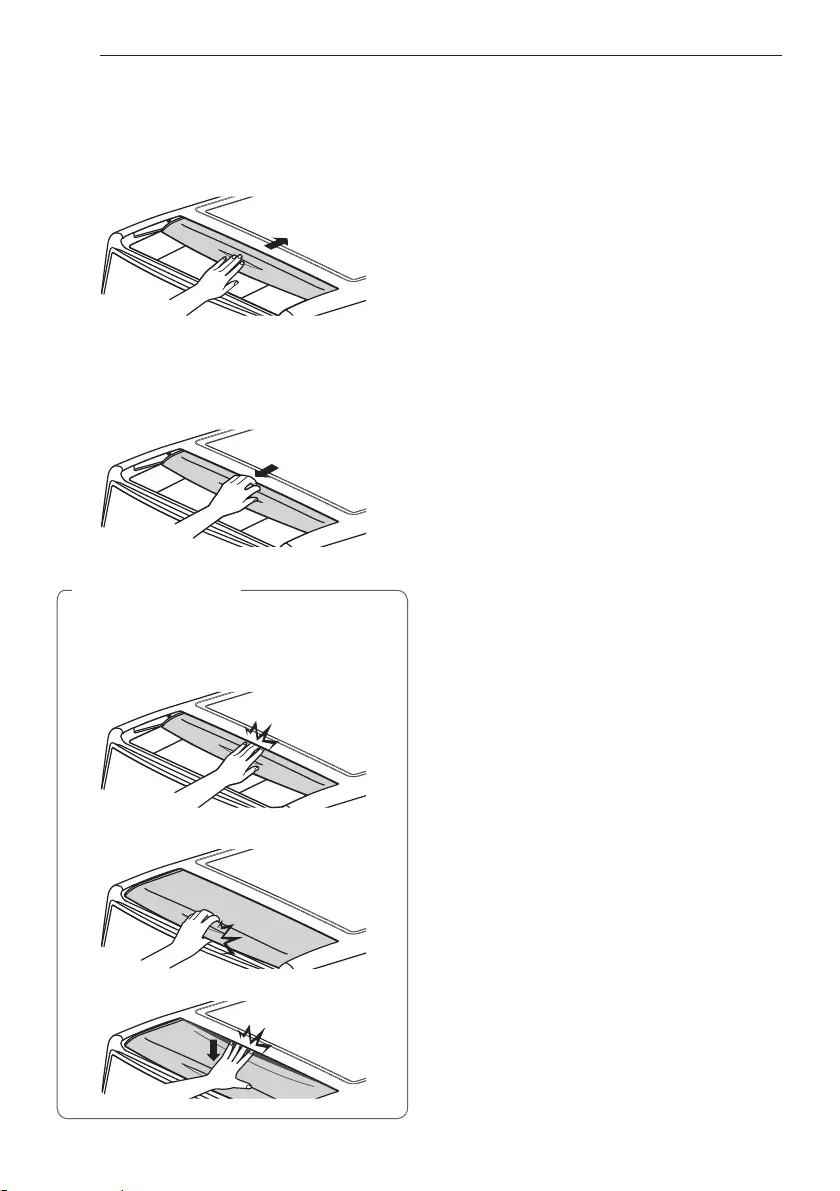
36 CÓMO USAR
w
ADVERTENCIA
• Para evitar lesiones, no ponga los dedos debajo de la
tapa ni entre la tapa y la placa superior cuando haga
presión sobre la tapa del dispensador de detergente
o la deslice para abrirla o cerrarla.
Uso de la Tapa
- Empuje la manija frontal para deslizar y abrir la tapa.
- Tire de la parte superior de la manija para deslizar y
cerrar la tapa.
MFL67731049_sp_170714.indd 36 2017.7.14 2:22:44 PM
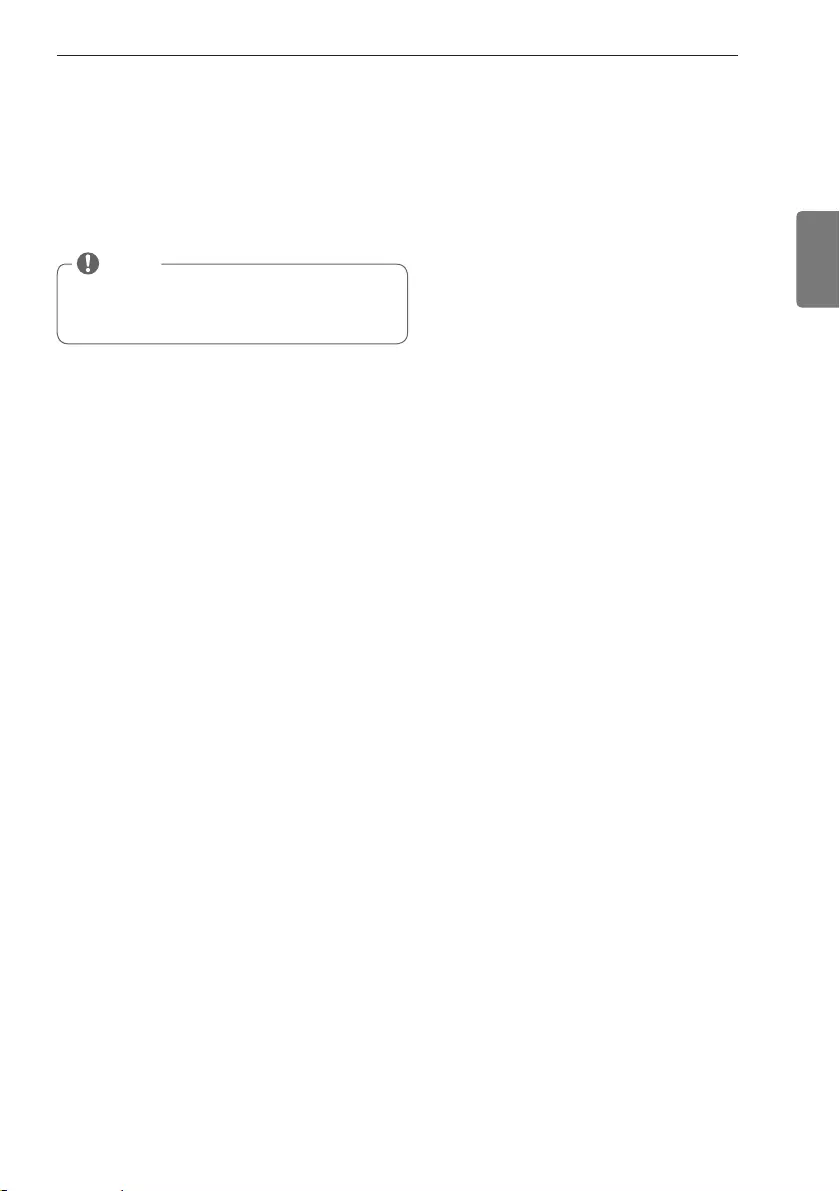
37
ESPAÑOL
Su secadora dispone de varias opciones de ciclo
adicionales, las cuales personalizan los ciclos para
satisfacer sus necesidades individuales.Ciertos botones
de opción también incorporan una función especial (vea
la siguiente página para obtener mayor información)
que puede activarse apretando y manteniendo apretado
ese botón de opción por 3 segundos.
Para añadir opciones de ciclo a un ciclo:
1. Encienda la secadora y gire la perilla selectora de
ciclos para seleccionar el ciclo deseado.
2. Use los botones de programación de ciclo para fijar
los ajustes para ese ciclo.
3. Apriete el(los) botón(es) de opción de ciclo para la
opción que desea añadir. Aparecerá en la pantalla un
mensaje de confirmación.
4. Apriete el botón INICIO/PAUSA (START/PAUSE) para
iniciar el ciclo. La secadora iniciará automáticamente.
SEÑAL (SIGNAL)
Ajuste el volumen del aviso sonoro o apaguelo.
Presione repetidamente el boton hasta que se ilumine el
volumen deseado.
Botones modificadores de ciclo
Los ciclos de SECADO CON SENSOR (SENSOR DRY)
tienen ajustes preprogramados que se seleccionan
automaticamente. Los ciclos de SECADO MANUAL
(MANUAL DRY) tienen ajustes predeterminados, pero
pueden Personalizarse usando los botones de ajustes
de ciclos. Apriete el botón de esa opción para ver y
seleccionar otros ajustes.
NIVEL DE SECADO (DRY LEVEL)
Selecciona el nivel de sequedad para el ciclo. Apriete el
botón de NIVEL DE SECADO (DRY LEVEL) varias veces
para navegar por los ajustes disponibles.
• Esta opción está disponible únicamente en los ciclos
de SECADO CON SENSOR (SENSOR DRY).
• La secadora ajustara el tiempo de ciclo
automaticamente. Al seleccionar MÁS (MORE) o MUY
(VERY) se incrementará el tiempo del ciclo, mientras
que HUMEDO (DAMP) o MENOS (LESS) disminuira el
tiempo del ciclo.
• Use un ajuste HUMEDO (DAMP) o MENOS (LESS) en los
artículos que desee planchar.
TEMPERATURA (TEMP.)
Regula el ajuste de temperatura desde ULTRA BAJO
(ULTRA LOW) a ALTO (HIGH). Esto permite el cuidado
preciso de sus telas y prendas. Apriete el botón
TEMPERATURA (TEMP.) varias veces para navegar por los
ajustes disponibles.
SECADO DE TIEMPO (TIME DRY)
Le permite seleccionar el tiempo de secado
manualmente, de 20 a 60 minutos, en incrementos
de 10 minutos.Use esta opcion en cargas pequenas o
para eliminar arrugas. Use los botones de MÁS TIEMPO/
MENOS TIEMPO (MORE TIME/LESS TIME) para anadir
o reducir el tiempo de secado en incrementos de 1
minuto.
NOTA
Para proteger las prendas, no todos los niveles de
secado, temperatura u opción están disponibles en
todos los ciclos. Vea la Guía de ciclos para obtener más
detalles.
CÓMO USAR
MFL67731049_sp_170714.indd 37 2017.7.14 2:22:44 PM
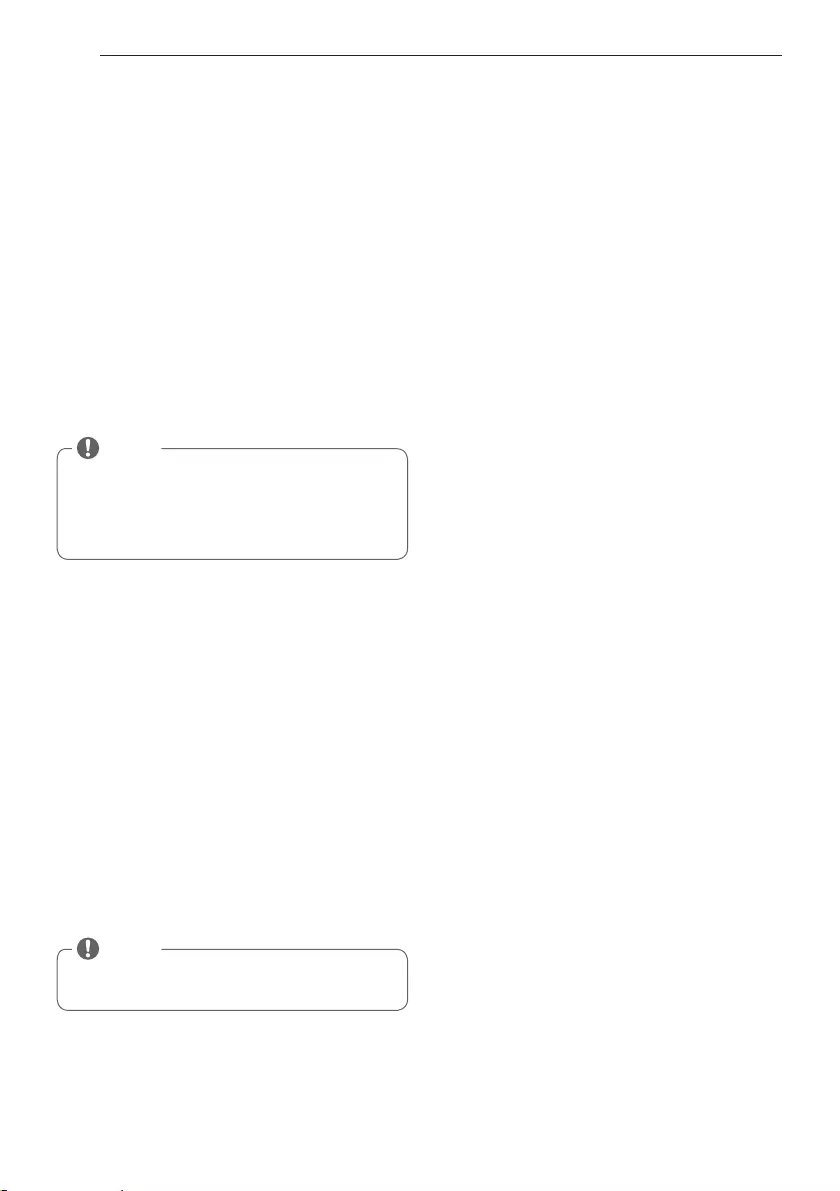
38
Funciones especiales
Los botones de opción también activan las funciones
especiales, incluyendo, SEGURO A PRUEBA DE
NINOS (CHILD LOCK). Seleccione la opción deseada
presionando el botón. Al pulsar y mantener presionado
el botón se activarán las características especiales
marcadas con el asterisco (*), tales como Seguro a
prueba de niños.
* CERRADURA A PRUEBA DE NIÑOS (CHILD LOCK)
Utilice esta opción para evitar usos indeseados
de la secadora o para evitar modificaciones en las
configuraciones de ciclo mientras la secadora esta
funcionando. Presione y sostenga el botón de durante 3
segundos para activar o desactivar la funcion SEGURO A
PRUEBA DE NIÑOS (CHILD LOCK).
Cuando se ha fijado el seguro infantil, aparecerá
el indicador de seguroinfantil en la pantalla y se
desactivarán todos los botones excepto el botón de
ENCENDIDO/APAGADO (POWER).
SEÑAL DE SECADO HÚMEDO (DAMP DRY SIGNAL)
Con esta opción, la secadora hará sonar una alarma
cuando la carga está 80% seca. Esta función le
permite retirar el(los) artículo(s) liviano(s) que seca(n)
rápidamente o que desea planchar o colgar mientras
aún se encuentran húmedos. Presione el botón
SEÑAL DE SECADO HÚMEDO (DAMP DRY SIGNAL).
CUIDADO DE ARRUGAS (WRINKLE CARE)
Al seleccionar esta opción, hará girar la carga
periódicamente por un plazo de hasta 3 horas después
del ciclo seleccionado, o hasta que se abra la puerta.
Esto es de ayuda para prevenir la formación de arrugas
cuando no le sea posible retirar las prendas de la
secadora inmediatamente.
DE AHORRO DE ENERGÍA ENERGY SAVER
Esta opción le permite reducir el consumo de energía en
el ciclo Normal, dependiendo del tamaño de la carga.
Cuando se seleccione el ahorro de energía, el ciclo
comienza con una sección de secado por aire y se
aumenta el tiempo de secado .
* Activado/Desactivado por defecto
Esta opción permite la configuración de Ahorro de
Energía para ser cambiados.
Para desactivar la opción predeterminada de ahorro de
energía, mantenga presionado durante tres segundos el
botón de Ahorro de Energía.
En la pantalla aparece Activado o Desactivado.
RED INTELIGENTE
Reduzca los costos energéticos al secar las prendas
de ropa evitando los tiempos de uso pico. Refiérase a
la sección Conectividad inteligente para obtener más
información.
*INICIO REMOTO
Use un teléfono inteligente para controlar la secadora
en forma remota. Refiérase a la sección Conectividad
inteligente para obtener más información.
NOTA
Una vez seleccionado, el SEGURO A PRUEBA DE
NIÑOS permanece activo hasta que se desactiva
manualmente. El SEGURO A PRUEBA DE NIÑOS
debe estar desactivado para ejecutar otro ciclo. Para
desactivar el SEGURO A PRUEBA DE NIÑOS, mantenga
pulsado el botón por tres segundos.
CÓMO USAR
NOTA
El ahorro de energía es la opción por defecto en el ciclo Normal.
Puede desactivar la opción de ahorro de energía para un ciclo
Normal más rapido que comienza con secado caliente.
MFL67731049_sp_170714.indd 38 2017.7.14 2:22:44 PM
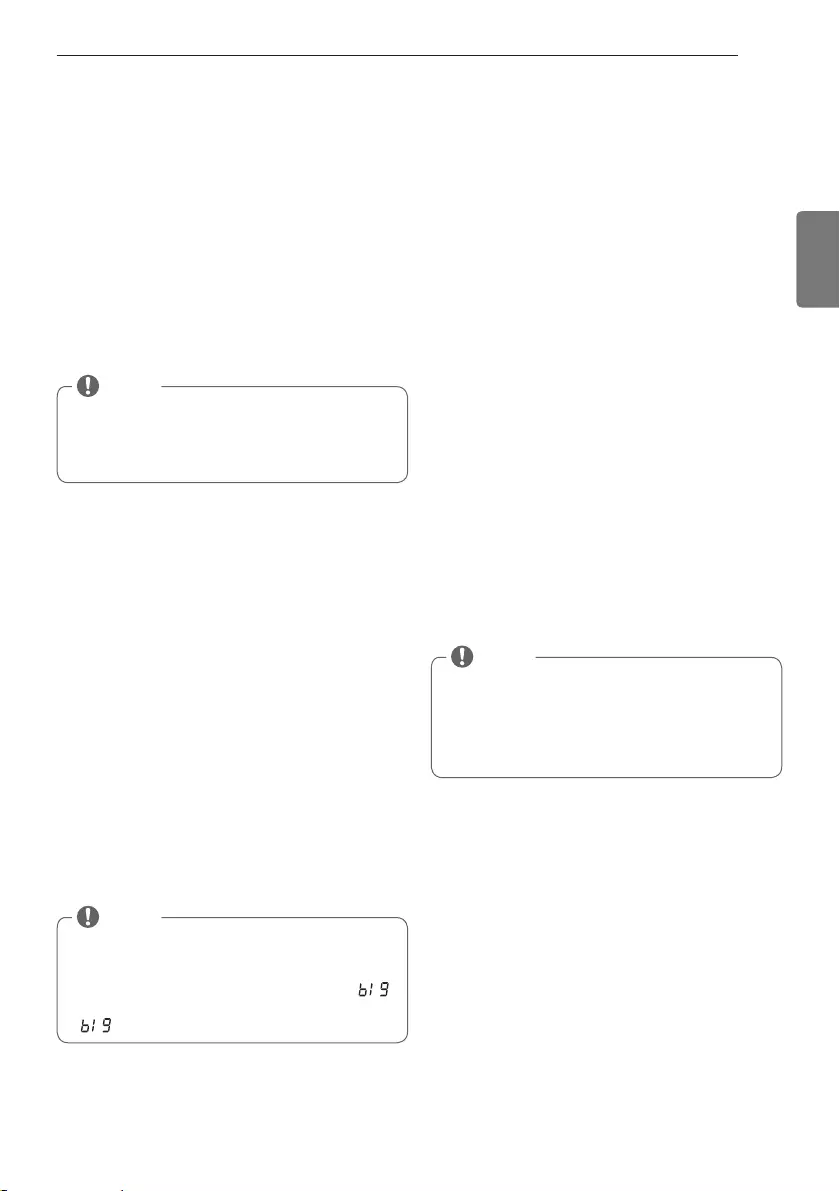
39
ESPAÑOL
Programa personalizado
Si tiene una combinacion especial de ajustes que usa
con frecuencia, puede guardar estos ajustes a manera
de PROGRAMA PERSONALIZADO (CUSTOM PROGRAM).
Para guardar un programa personalizado:
1. Encienda la secadora y gire la perilla selectora de
ciclos para seleccionar el ciclo deseado.
2. Use los botones de programación de ciclo para fijar
los ajustes para ese ciclo.
3. Presione el(los) botón(es) de opción de ciclo para la
opción que desea añadir. Aparecerá en la pantalla un
mensaje de confirmación.
4. Pulse y mantenga presionado el botón PROGRAMA
PERSONALIZADO (PGM Save) por tres segundos.
Para recuperar un programa personalizado:
1. Encienda la secadora.
2. Presione el botón PROGRAMA PERSONALIZADO
(CUSTOM PGM).
3. Apriete el botón INICIO/PAUSA (START/PAUSE) para
iniciar el ciclo.
Funciones de vapor
La nueva tecnologia de vapor de LG le permite inyectar
las telas con un chorro giratorio de vapor caliente para
refrescar las prendas. Simplemente seleccione el ciclo
STEAM FRESH™ o agregue la opción Vapor (Steam) a los
ciclos seleccionados.
Cómo usar el ciclo STEAM FRESH™
STEAM FRESH™ utiliza sólo el poder del vapor para
rápidamente reducir arrugas y olores de las telas. Da nueva
vida a las prendas arrugadas que han estado guardadas por
mucho tiempo y facilita el planchado en ropa muy arrugada.
STEAM FRESH™ también puede usarse para reducir los
olores en las telas.
NOTA
• Dependiendo de la carga (cantidad de prendas),
puede modificarse el tiempo del ciclo presionando los
botones MÁS TIEMPO (MORE TIME) o MENOS TIEMPO
(LESS TIME). En la pantalla podra verse 1, 3, 5, o .
3 significa 3 o menos prendas, 5 es para 4 ó 5 prendas,
y indica una carga grande, como un edredón.
Para usar el ciclo STEAM FRESH™:
1. Encienda la secadora y gire la perilla selectora al ciclo
.
2.
Para agregar una función opcional, seleccione
TURBOSTEAM o CUIDADO DE ARRUGAS (WRINKLE CARE).
3. Dependiendo de la carga (cantidad de prendas), puede
modificarse el tiempo de vapor presionando los botones
MÁS TIEMPO (MORE TIME) o MENOS TIEMPO (LESS TIME)
4. Presione el botón de INICIO/PAUSA (START /PAUSE) para
iniciar el ciclo.
Para agregar VAPOR (STEAM) a un ciclo estándar:
1. Encienda la secadora y gire la perilla selectora al ciclo
deseado.
2. Utilice los botones de configuración de ciclo para ajustar
las configuraciones para ese ciclo.
3. Presione el botón Vapor (Steam) para la opción que
le gustaría agregar. Luego ajuste el tamaño de carga
utilizando los botones MAS TIEMPO (MORE TIME) o
MENOS TIEMPO (LESS TIME).
4. Presione el botón de INICIO/PAUSA (START /PAUSE) para
iniciar el ciclo.
Cómo usar el ciclo STEAM SANITARY™
El nuevo ciclo STEAM SANITARY™ es idóneo para la
higienización rápida y sencilla de elementos que no pueden
lavarse, utilizando sólo el poder del vapor. Recomendamos
utilizar este ciclo para tejidos de algodón y poliéster. (NO
use para espuma de uretano, plumas o prendas delicadas).
NOTA
• La opcion TurboSteam se puede seleccionar
solamente si el modo de ahorro de energia esta
desactivado.
• Solo se puede seleccionar TurboSteam si estan
activados los niveles de secado Muy(Very) o
Mas(More).
NOTA
Puede guardar sólo un programa personalizado
a la vez. Al pulsar y mantener presionado el
botón PROGRAMA PERSONALIZADO (PGM Save),
reemplazará cualquier programa personalizado que
haya guardado anteriormente.
CÓMO USAR
MFL67731049_sp_170714.indd 39 2017.7.14 2:22:45 PM
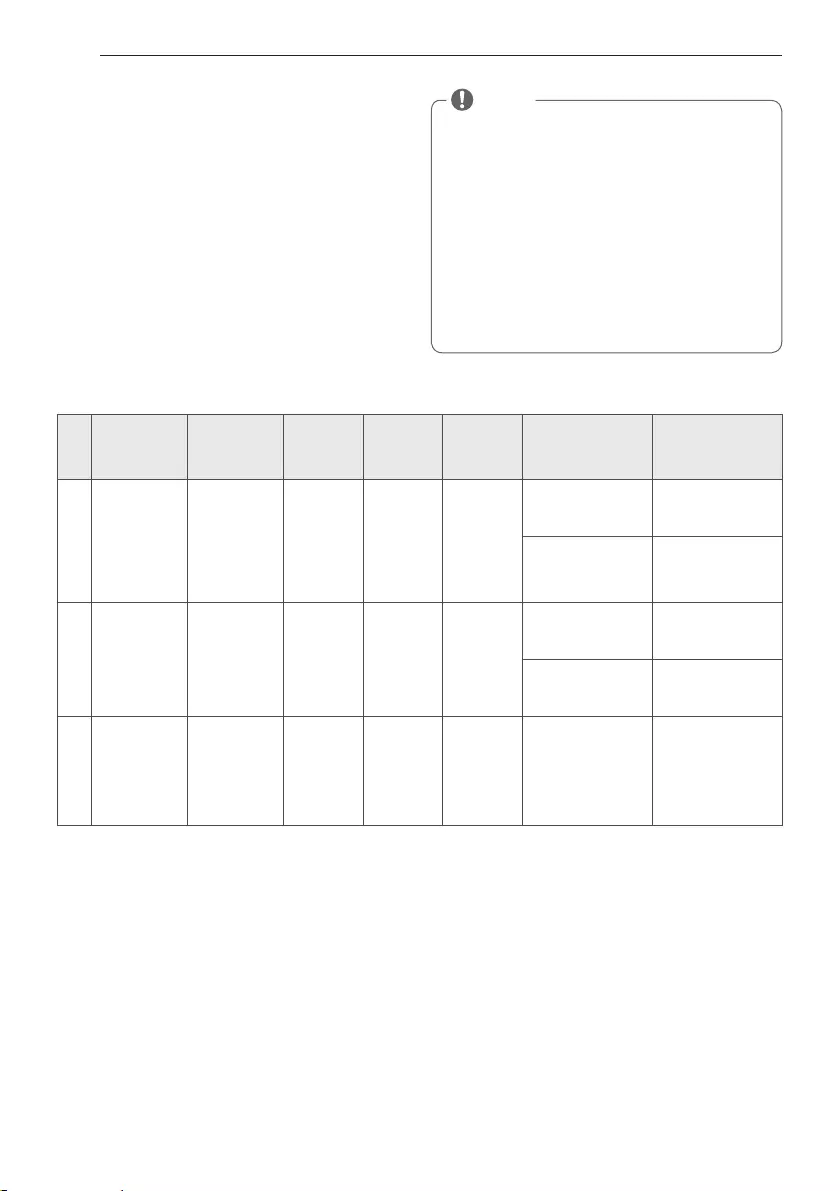
40
Funciones de vapor (cont.)
wADVERTENCIA
•
Si no se cumple con esto se podrá producir una
explosión, incendio, quemaduras o muerte.
•
Si no se cumple con
esta advertencia se podrán producir heridas graves o
muerte.
NOTA
• Puede que el vapor no sea claramente visible
durante los ciclos de vapor. Esto es normal.
• No use el ciclo STEAM FRESH™ con elementos como
lana, manta de lana, camperas de cuero, seda, ropa
húmeda, lencería, productos de espuma o mantas
eléctricas.
• Para mejores resultados, las prendas deben ser de
tamaños y de tipos de tela similares. No sobrecargue
la secadora.
• Cuando se tapa el filtro/conducto, la opción vapor
(steam) puede no tener resultados óptimos.
• Cuando la función vapor (steam) está siendo
utilizada, el tambor se detendrá para permitir que el
vapor permanezca en el tambor.
CÓMO USAR
Guía de ciclo de vapor
programado
temp.
Secado
de tela
Steam Sanitary
31 Min. Seca
Camisas, Ropa de
cama Camisas (1 cada)
Ropa de niños 3 Ibs.
10 Min. Seca
Edredón Camisas (1 cada)
Camisas* 5 cada
+
Siga el ciclo
Seleccionado
Mojada Varía según el
ciclo seleccionado
8 Ibs.
(18 ARTíCULOS)
* Camisa: mezcla de 70% algodón:30% poliéster. Excepto telas especialmente delicadas
• Cuando se tapan el filtro de pelusas o el conducto de salida, las opciones de vapor no darán los resultados
adecuados.
• Para mejores resultados, las prendas deben ser de tamaños y de tipos de tela similares. No sobrecargue la secadora.
MFL67731049_sp_170714.indd 40 2017.7.14 2:22:45 PM

41
ESPAÑOL
CONECTIVIDAD DEL ELECTRODOMÉSTICO INTELIGENTE
CONECTIVIDAD DEL ELECTRODOMÉSTICO INTELIGENTE
Información general de conectividad
Su electrodoméstico ahora hace algo más que solo lavar la ropa. Una vez conectado a Internet a través de la red Wi-Fi
de su hogar, puede comprobar el avance de un ciclo y controlar el aparato en forma remota con la aplicación Smart
Laundry de LG para su teléfono inteligente.
La aplicación puede configurarse para enviar notificaciones automáticas cuando el ciclo ha finalizado o cuando el
aparato tiene problemas. También proporciona una lista de ciclos adicionales disponibles para su descarga, y ayuda
a solucionar problemas mediante el registro y el análisis de datos del aparato. El aparato tiene la capacidad Smart
Grid para las áreas donde la compañía eléctrica ha instalado equipos Smart Grid. Esta función ajusta los tiempos de
funcionamiento del aparato cuando los precios de la electricidad son más bajos o retrasa el funcionamiento cuando
la demanda de electricidad es alta.
Configuración de la conectividad
1. Ejecute Google Play Store en su teléfono inteligente
con Android.
2. Busque LG Smart Laundry.
3. Pulse LG Smart Laundry en la lista de resultados.
4. Presione el INSTALAR y ACEPTAR para instalar
automáticamente la aplicación. También puede
comprobar el avance a través del teléfono inteligente.
5. Cuando la instalación esté completa, toque el ícono
de acceso a la aplicación.
• Más adelante admitirá la aplicación LG Smart Laundry
para dispositivos iOS.
Puede omitir los siguientes pasos si ya tiene una cuenta
LG en http://us.smartthinQ.com
1. Ejecute la aplicación LG Smart Laundry en su teléfono
inteligente.
2. Seleccione el Login (inicio de sesión) en la pantalla.
3. Seleccione el botón Create an account (crear una
cuenta) en la parte inferior de la pantalla.
4. En la siguiente pantalla, debe aceptar los términos y
condiciones, la política de privacidad y los términos
y condiciones de la cuenta de LG. Después de
seleccionar I agree (acepto), pulse el botón Confirm
(confirmar).
5. A continuación, en el buzón del correo electrónico,
introduzca su dirección de correo electrónico.
Esta será su ID de usuario. Recibirá un correo de
confirmación para activar la cuenta en su dirección de
correo electrónico.
6. Introduzca una contraseña. Las contraseñas detectan
mayúsculas y minúsculas. La contraseña debe
tener entre 6 y 12 caracteres. Recuerde su ID y su
contraseña. Las usará con la aplicación LG Smart
Laundry para acceder a las funciones de conectividad
del electrodoméstico inteligente.
7. Introduzca su nombre.
8. Introduzca su número de teléfono celular.
9. Pulse el botón Subscribe (suscribirse). El sistema le
enviará un correo electrónico con un enlace para
confirmar su identidad para la cuenta.
10. Pulse el botón CONFIRM (confirmar) en el correo
electrónico de confirmación y el sitio web desplegará
la página de confirmación. Su cuenta ya está
configurada.
1. Ejecute la aplicación LG Smart Laundry en su teléfono
inteligente.
2. Seleccione Smart Appliance (electrodoméstico
inteligente)
3. Seleccione Dryer (Secadora)
- Si aparece un mensaje emergente sobre NFC,
presione el botón Cancel.
4. Pulse el botón Wi-Fi model (modelo con Wi-Fi) en la
parte inferior de la pantalla.
5. Introduzca el correo de ID y la contraseña que utilizó
para registrarse. Si no tiene una cuenta en http://
us.smartthinQ. com, pulse el botón Create an account
(crear una cuenta) para crear la ID de usuario y
contraseña.
6. Seleccione el botón Login (inicio de sesión).
7. En la siguiente página, la aplicación muestra la lista
de redes Wi-Fi. Seleccione la red de su hogar. Si su
red necesita una clave, introduzca la contraseña y
seleccione el botón the Connect (conectar).
8. Si la aplicación se conecta correctamente a la red
doméstica, encienda la secadora y luego mantenga
presionado el botón Wi-Fi Connect de la secadora
durante tres segundos. Después de encender la
secadora, no presione ningún otro botón antes de
mantener presionado el botón Wi-Fi Connect. El
indicador de conexión Wi-Fi de la secadora parpadea
para indicar que la máquina se está conectando.
MFL67731049_sp_170714.indd 41 2017.7.14 2:22:45 PM
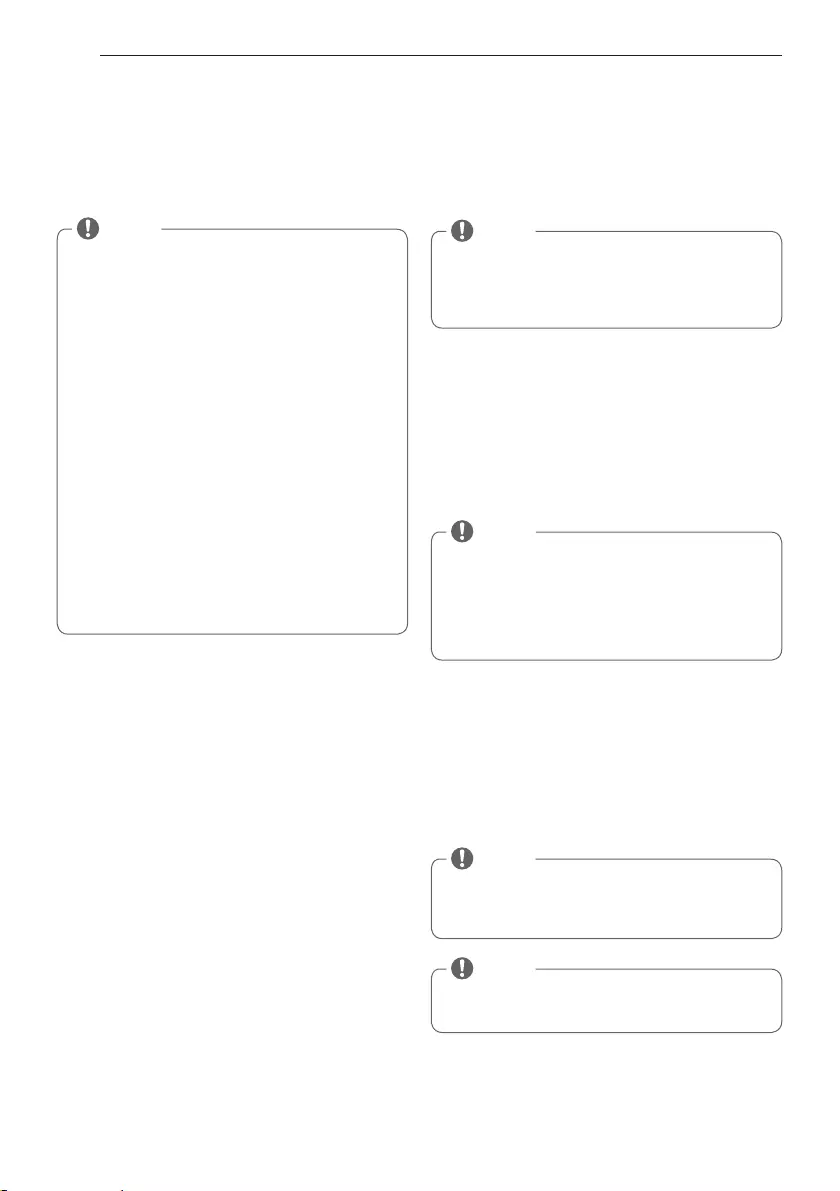
42 CONECTIVIDAD DEL ELECTRODOMÉSTICO INTELIGENTE
9. La aplicación ahora trabaja para conectar el aparato y
registrarlo como un producto Wi-Fi.
Aparece una notificación cuando la secadora se ha
configurado con éxito y cuando se ha completado el
registro del producto y la configuración de Wi-Fi. El
indicador de conexión Wi-Fi se enciende cuando la
máquina se conecta a la red doméstica.
NOTA
• La máquina solo admite una red de WiFi de 2,4 GHz.
• Utilice el menú Settings de la aplicación para registrar
o cambiar la máquina. Seleccione Settings > Change
Product > Add Product y luego siga los pasos 2–10 que
figuran aquí arriba.
• Si el router o la contraseña del router se ha cambiado,
seleccione Settings > Change Product > Add Product y
luego siga los pasos 2–10 que figuran aquí arriba.
• Si el aparato tiene problemas para conectarse a la red
Wi-Fi, es posible que se encuentre demasiado lejos
del router. Adquiera un repetidor Wi-Fi (extensor de
alcance) para mejorar la intensidad de la señal Wi-Fi.
• Es posible que la conexión Wi-Fi no se conecte o se
interrumpa debido al entorno de la red doméstica.
• Es posible que la conexión de red no funcione bien por
cuestiones relacionadas con su proveedor de servicios
de Internet.
• El entorno inalámbrico circundante puede hacer que
el servicio de red inalámbrica funcione lentamente.
• Esta información está actualizada en el momento de
su publicación. La aplicación está sujeta a cambios
con fines de mejorar el producto sin previo aviso a los
usuarios.
Smart ThinQ™
Use un teléfono inteligente para controlar su
electrodoméstico de manera remota. También es posible
monitorear el funcionamiento del ciclo para saber
cuánto tiempo le queda al ciclo.
NOTA
• En primer lugar, debe conectarse a una puerta de
enlace y registrar su electrodoméstico para usar la
función de inicio remoto.
• El LED remoto en el panel de control debe estar
iluminado.
1. Presione y sostenga el botón de inicio remoto. El LED
remoto en el panel de control debe estar iluminado si
su electrodoméstico está conectado a una red Wi-Fi.
2. Inicie un ciclo desde la aplicación de su teléfono
inteligente. Si no se inicia el ciclo, la máquina esperará
para comenzar el ciclo hasta que se apague de forma
remota desde la aplicación o hasta que se desactive el
modo Remote Start.
NOTA
• Cuando la máquina se encuentra en el modo Remote
Start, no se pueden seleccionar los ciclos y las
opciones desde el artefacto.
• Mantenga presionado el botón Remote Start
nuevamente para activar el modo Remote Start
cuando el artefacto esté apagado o el modo Remote
Start esté desactivado.
Red inteligente
Reduzca los costos energéticos que implica el secado
de ropa evitando usar el equipo en períodos de uso
máximo, con la información suministrada por su
compañía eléctrica local.
Si la compañía de servicios ha equipado su hogar con la
tecnología Smart Grid, deberá contactarse con ellos para
obtener información sobre las características de esta
red.
NOTA
• Cuando está activado Smart Grid, puede
experimentar demoras o períodos de ciclo
extendidos durante los momentos de mayor
consumo.
NOTA
• En primer lugar, debe conectarse a un portal de
enlaces y registrar su electrodoméstico para poder
utilizar la función Smart Grid.
MFL67731049_sp_170714.indd 42 2017.7.14 2:22:45 PM
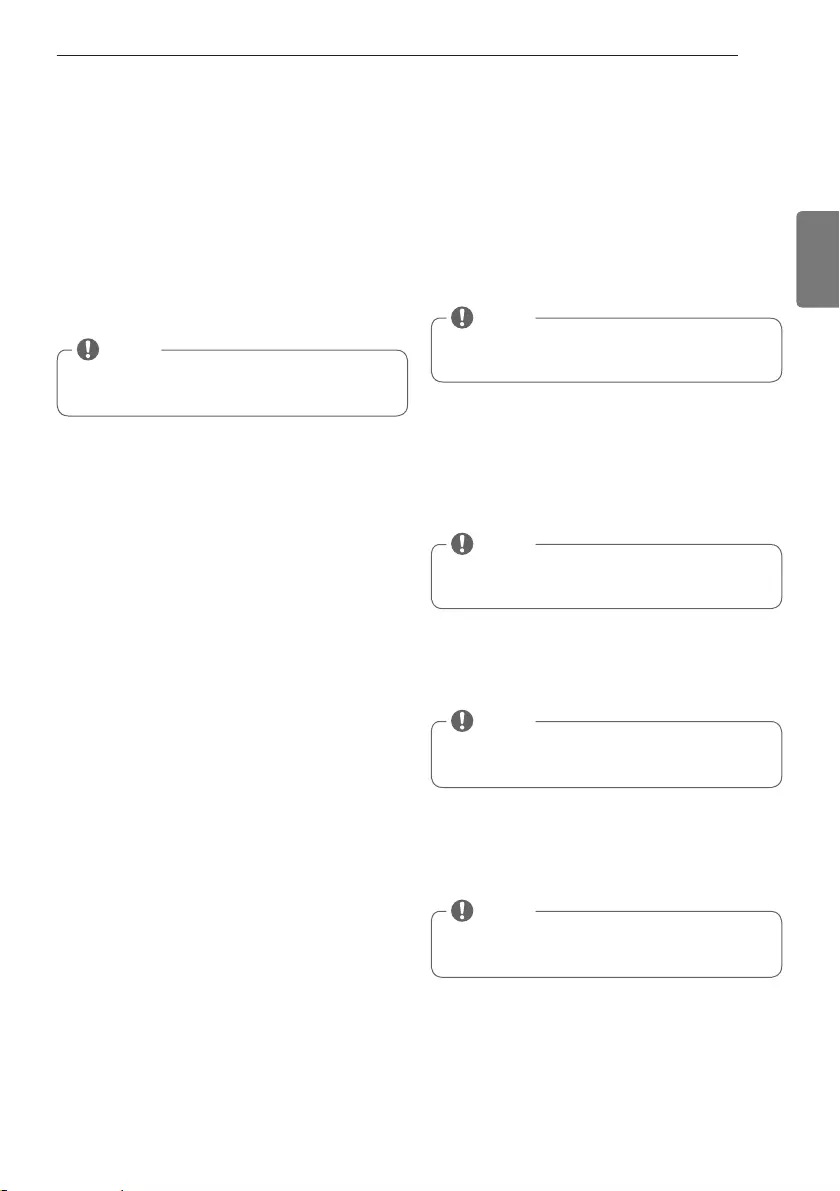
43
ESPAÑOL
Las funciones de descarga de ciclo que posee este
electrodoméstico permiten descargar ciclos nuevos y
especiales que no están incluidos en los ciclos básicos
del aparato.
Los aparatos que se han registrado con éxito pueden
descargar una serie de ciclos especiales y específicos
para el electrodoméstico.
Se puede almacenar solo un ciclo por vez en el
electrodoméstico.
Una vez que la descarga del ciclo está completa en
secadora, el producto mantiene el ciclo descargado
hasta que se cambie por una nueva descarga de ciclo.
NOTA
• En primer lugar se debe conectar a un portal de
enlace y registrar el electrodoméstico para poder
usar la función de descarga del ciclo.
Use su teléfono para guardar la señal Smart Diagnosis™
si tiene problemas con su electrodoméstico. La
aplicación puede analizar la señal y ayudarle a resolver
el problema sin necesidad de esperar a un técnico.
La configuración del ciclo le ayuda a elegir el mejor ciclo
y ajustes en función de sus necesidades de lavado.
Una vez seleccionado el ciclo según la guía de
configuración del ciclo, el ciclo y los ajustes quedan
automáticamente programados.
NOTA
• Se puede activar la función Cycle Set (configuración
del ciclo) cuando el botón de inicio remoto está
activado.
Las estadísticas de lavado indicarán las estadísticas
básicas de su electrodoméstico, es decir, el historial de
ciclos y el cronograma de mantenimiento básico.
Seleccione Laundry Stats en la aplicación para obtener
las estadísticas y conocer el estado de ventilación de la
secadora.
NOTA
• En primer lugar debe conectarse a un portal de
enlace y registrar el electrodoméstico para poder
usar la función de estadísticas de lavado.
Cuando el ciclo esté completo o el electrodoméstico
tenga problemas, tiene la opción de recibir
notificaciones automáticas en su teléfono inteligente.
NOTA
• En primer lugar debe conectarse a un portal de
enlace y registrar el electrodoméstico para poder
usar la función de mensajes inteligentes.
El consumo energético de la secadora se ve afectado
por el ciclo y las opciones, de modo que es posible que
se observen algunos cambios en el consumo energético
de un ciclo al otro.
NOTA
• En primer lugar debe conectarse a un portal de
enlace y registrar el electrodoméstico para poder
usar la función de monitoreo de energía.
CONECTIVIDAD DEL ELECTRODOMÉSTICO INTELIGENTE
MFL67731049_sp_170714.indd 43 2017.7.14 2:22:45 PM
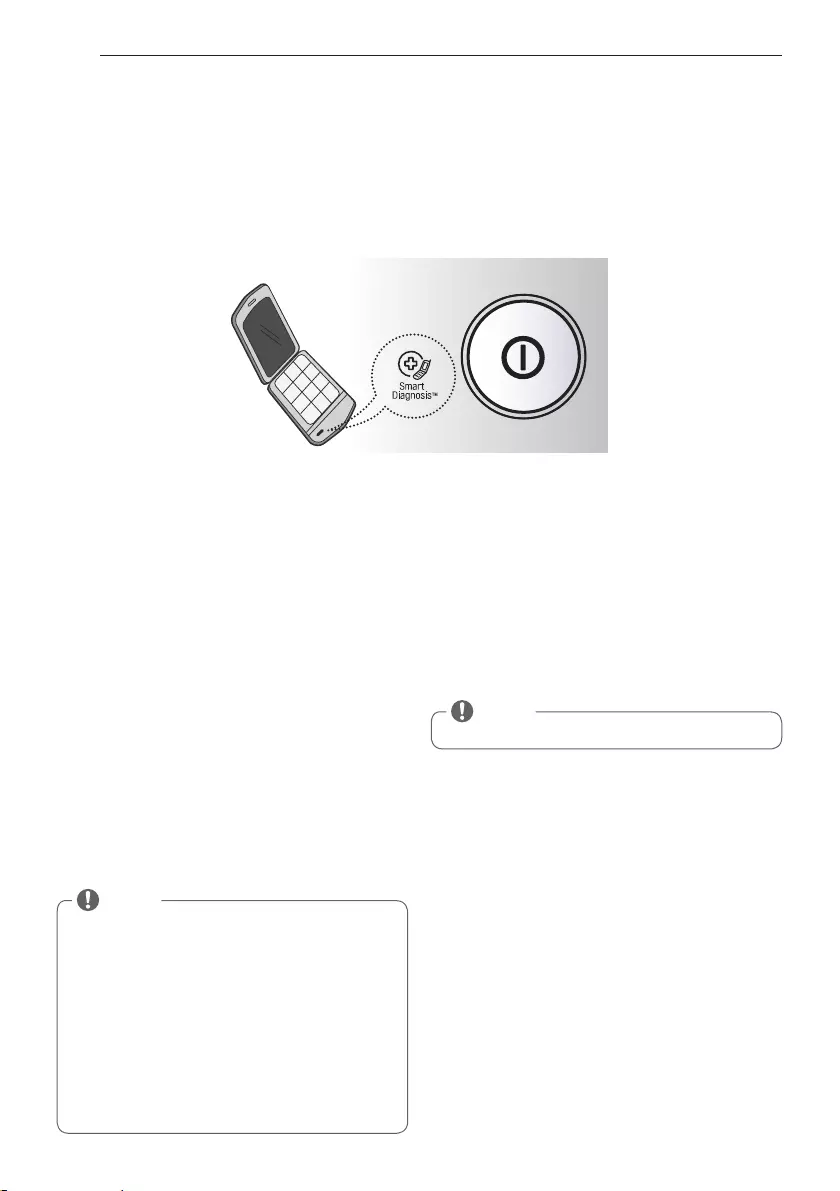
44 UTILIZACIÓN DEL SMARTDIAGNOSIS™
UTILIZACIÓN DEL Smart Diagnosis™
Diagnóstico sonoro
Si tuviera algún problema con su secadora, la misma posee la capacidad de transmitir datos a un teléfono inteligente
utilizando la aplicación Smart Laundry de LG o mediante el teléfono al Centro de atención telefónica de LG.
Smart Diagnosis™ no puede ser activado a menos que su secadora esté encendida pulsando el botón de
Alimentación(Power). Si su secadora no puede encenderse, tendrá que localizar y solucionar los problemas sin
utilizar Smart Diagnosis™.
Smart Diagnosis™ utilizando su
teléfono inteligente
1. Descargue la aplicación Smart Laundry de LG en su
teléfono inteligente.
2. Abra la aplicación Smart Laundry de LG en su teléfono
inteligente. Presione el botón flecha hacia la derecha
para avanzar a la siguiente pantalla.
3. Presione el botón Grabación del teléfono inteligente
y mantenga la boquilla del teléfono inteligente junto
al logotipo de Smart Diagnosis™ de la secadora.
4. Con el teléfono en su sitio, pulse y mantenga
pulsado el botón de
Temperatura(Temp.)
durante tres
segundos.
5. Mantenga el teléfono en el sitio hasta que la
transmisión del tono haya terminado. Necesita
tiempo en el panel visualizado.
6.
Al finalizar la grabación, vea el resultado del diagnóstico
presionando el botón Siguiente del teléfono.
Smart Diagnosis™ a través del
Centro de atención telefónica
1. Llame al Centro de atención telefónica de LG
Electronics al teléfono: (LG EE.UU.) 1-800-243-0000(LG
Canadá) 1-888-542-2623.
2. Cuando se lo indique el agente del Centro de
atención telefónica, mantenga el micrófono de
su teléfono sobre el logotipo Smart Diagnosis™
del equipo. Sostenga el teléfono a no más de una
pulgada o 2.5 cm (pero sin tocar) el equipo.
3.
Pulse y mantenga pulsado el botón de
Temperatura(Temp.) durante tres segundos.
4. Mantenga el teléfono en el sitio hasta que la
transmisión del tono haya terminado. Necesita
tiempo en el panel visualizado.
5. Una vez que la cuenta regresiva haya finalizado y los
tonos se hayan detenido, reanude la conversación
con el agente del Centro de atención telefónica,
que será capaz de ayudarle en la utilización de la
información transmitida para su análisis.
NOTA
“Smart Diagnosis(Diagnóstico Inteligente) es una
función de resolución de problemas diseñada
para asistir, no reemplazar, al método tradicional
de resolución de problemas a través de llamadas
de servicio técnico. La efectividad de esta función
depende de diversos factores, entre los cuales se
incluyen, la recepción del teléfono celular utilizado
para la transmisión, cualquier ruido externo que
pueda presentarse durante la transmisión, y la acústica
de la habitación donde está ubicada la secadora. Por
lo tanto, LG no garantiza que SmartDiagnosis resuelva
con precisión cualquier cuestión dada.”
NOTA
No toque ningún otro botón ni icono de la pantalla.
MFL67731049_sp_170714.indd 44 2017.7.14 2:22:46 PM
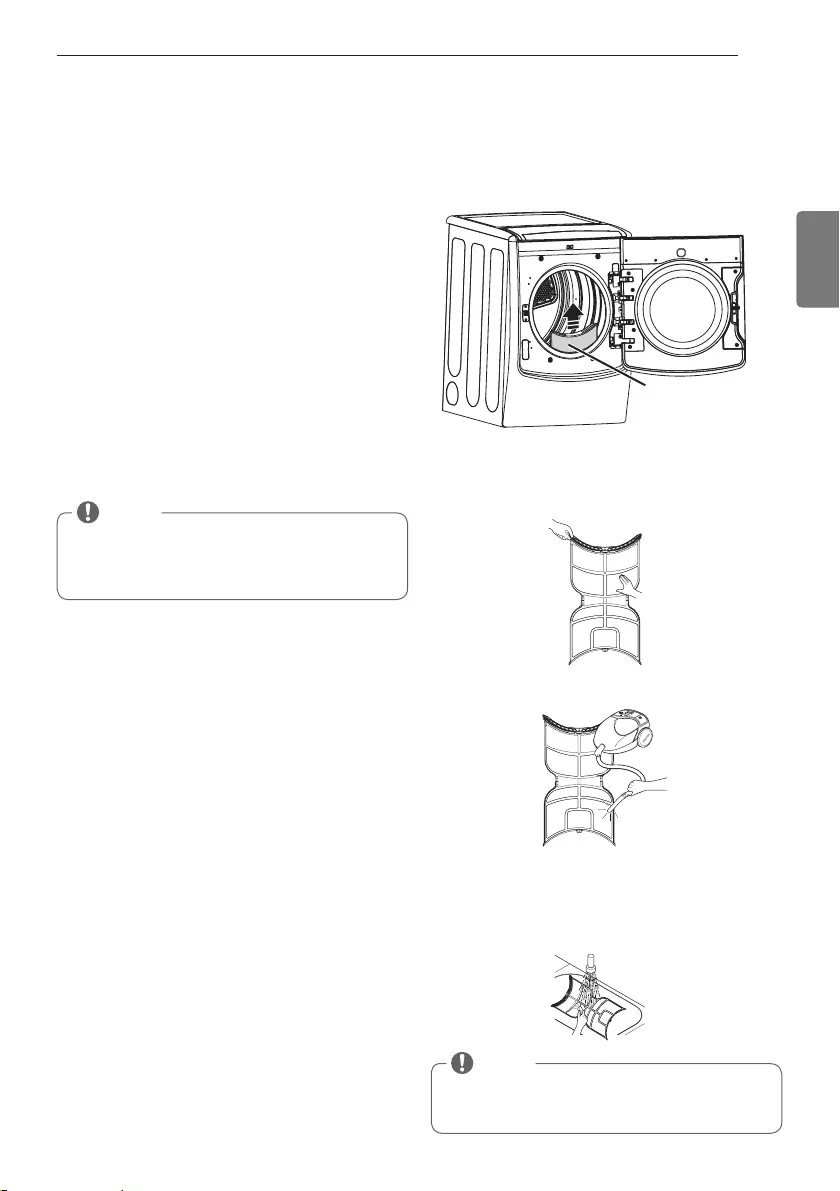
45
ESPAÑOL
MANTENIMIENTO
Limpieza regular
wADVERTENCIA
Para reducir el riesgo de incendio, descargas eléctricas o
heridas al usar su electrodoméstico, siga las precauciones
básicas, incluyendo lo siguiente:
•
Si no se cumple con esta advertencia se podrán producir
heridas graves, incendios, descargas eléctricas o muerte.
•
Los mismos dañarán su aspecto.
Limpieza del exterior
El mantenimiento adecuado de su secadora podría prolongar
su vida útil. El exterior de la unidad puede limpiarse con agua
tibia y un detergente de jabón medio, no abrasivo.
Limpie inmediatamente cualquier clase de fuga, con un trapo
suave y húmedo.
Limpieza del interior
Limpie con un paño alrededor de la abertura y el sello
de la puerta con un paño suave húmedo para prevenir la
acumulación de pelusa y polvo que podrían dañar el sello de
la puerta.
Limpie la ventanilla con un paño suave humedecido con agua
caliente y un detergente suave no abrasivo para el hogar;
luego seque con un paño.
Se puede limpiar el tambor de acero inoxidable con un
limpiador de acero inoxidable convencional, usado según
las especificaciones del fabricante. Nunca use limpiadores
abrasivos ni de lana metálica; pueden raspar o dañar la
superficie.
Limpieza alrededor y debajo de la secadora
Aspire la pelusa y polvo alrededor de la secadora y debajo
de ella con regularidad. Se debe revisar que el sistema de
conductos de ventilación no tenga acumulación de pelusa y
se debe limpiar una vez por año. Si se percibe una reducción
del flujo de aire o desempeño del secado notorios, revise
que el sistema de conductos no esté bloqueado ni tenga
obstrucciones.
Mantenimiento del sistema de conductos
Se debe revisar que el sistema de conductos de ventilación
no tenga acumulación de pelusa y se debe limpiar una
vez por año. Si se percibe una reducción del flujo de aire o
desempeño del secado notorios, revise que el sistema de
conductos no esté bloqueado ni tenga obstrucciones. Llame
a un técnico o proveedor de mantenimiento calificados.
Limpieza del filtro de pelusa
Limpie siempre el filtro de pelusa después de cada ciclo.
Para limpiarlo, tire del filtro de pelusa verticalmente.
Luego:
1. Con los dedos, enrolle cualquier pelusa para retirarla
del filtro, o
2. Limpie el filtro de pelusa con un aspirador, o
3. Si el filtro de pelusas se ha ensuciado mucho o se ha
obstruido con suavizante de tejido, lávelo en agua
caliente jabonosa y déjelo secar completamente antes
de volverlo a colocar.
NOTA
NUNCA opere la secadora sin haber colocado antes
el filtro de pelusa. NUNCA haga funcionar la secadora
con un filtro de pelusas húmedo.
NOTA
No use alcohol desnaturalizado, disolventes o
productos similares.
Nunca use limpiadores abrasivos o de lana metálica;
pueden dañar la superficie.
MANTENIMIENTO
Filtro de
pelusa
MFL67731049_sp_170714.indd 45 2017.7.14 2:22:50 PM

46
RESOLUCIÓN DE PROBLEMAS
Antes de llamar a mantenimiento
Su secadora está equipada con un sistema de monitoreo de errores automático para la detección y el diagnóstico de
problemas en una etapa temprana. Si su secadora no funciona adecuadamente o no funciona en lo absoluto, revise
lo siguiente antes de llamar a mantenimiento.
Soluciones
La secadora no
se enciende • El cable eléctrico no está
enchufado adecuadamente.
• El fusible del hogar está
quemado, el cortacircuitos se
ha accionado, o ha ocurrido una
interrupción eléctrica.
• Asegúrese de que el enchufe esté conectado de manera
segura en un tomacorriente con conexión a tierra, que se
corresponda con la placa de clasificación.
• Reactive el disyuntor o cambie el fusible. No aumente
la capacidad del fusible. Si el problema se debe a una
sobrecarga de circuito, pida a un electricista calificado que
solucione el problema.
La secadora no
calienta • El fusible del hogar está
quemado, el cortacircuitos se
ha accionado, o ha ocurrido una
interrupción eléctrica.
• Se ha apagado el suministro o
servicio de gas (sólo modelos a
gas).
• La opción de ahorro de energía
(Energy Saver) está seleccionada
• Reactive el disyuntor o cambie el fusible. No aumente
la capacidad del fusible. Si el problema se debe a una
sobrecarga de circuito, pida a un electricista calificado que
solucione el problema.
• Confirme que la válvula de corte de gas de la vivienda
y la válvula de corte de gas de la secadora estén
completamente abiertas.
•
Si utiliza el ciclo Algodón/Normal, desactive la opción de ahorro
de energía. La opciónde ahorro de energía se selecciona de forma
predeterminada y permite reducir elconsumo de energía, ya que
incorpora una sección de secado por aire al comienzo delciclo.
Es normal que sienta que la secadora no calienta al comienzo del
ciclo cuando elmodo de ahorro de energía está seleccionado.
Manchas
de grasa o
suciedad en las
prendas
• Suavizador de telas usado
incorrectamente.
• Prendas limpias y sucias secadas
juntas.
• Prendas limpias y sucias secadas
juntas.
• Confirme y siga las instrucciones provistas con su
suavizador de telas.
• Asegúrese de usar su secadora solo para secar artículos
limpios, ya que los artículos sucios pueden ensuciar las
prendas limpias en la misma carga o en las subsiguientes.
•
Las manchas en ropas secas son en realidad manchas que
no se eliminaron durante los procesos de lavado. Asegúrese
de que las ropas queden completamente limpias de
acuerdo con las instrucciones de su lavadora y detergente.
La pantalla
muestra los
errores tE1 o tE2
• No está funcionando el
calefactor. • Apague la secadora y llame a mantenimiento.
Pelusa en las
prendas • No se ha limpiado correctamente
el filtro de pelusa.
• Prendas de lavado no
clasificadas adecuadamente.
• Exceso de estática en las
prendas.
• La secadora está sobrecargada.
• Pañuelos de papel, papeles, etc.
dejados en los bolsillos.
•
Asegúrese de limpiar el filtro de pelusa antes de cada carga.
Con algunas cargas que producen altas cantidades de
pelusa, puede ser necesario limpiar el filtro durante el ciclo.
• Algunas telas producen pelusas (por ejemplo: una toalla
de algodón peluda blanca) y deben secarse aparte de
las prendas que atrapan pelusa (por ejemplo: un par de
pantalones de lino).
• Observe el exceso de estática en las prendas después del
secadora indicado de la sección más abajo.
• Divida las cargas grandes en cargas más pequeñas para
realizar el secado.
• Revise los bolsillos minuciosamente antes de lavar y secar
prendas.
Exceso de
estática en
las prendas
después del
secado
• No se usa suavizador de tela o se
usa incorrectamente.
• Las prendas se secaron
por demasiado tiempo
(excesivamente secas).
•
Secado de telas sintéticas, planchado
permanente o combinación de
materiales sintéticos.
•
Use un suavizador de telas para reducir la electricidad
estática. Asegúrese de seguir las instrucciones del fabricante.
• Sobrecargar una carga de lavado puede causar la
acumulacion de electricidad estatica. Programe los ajustes
y use un tiempo de secado menos prolongado; o use los
ciclos SECADO CON SENSOR (SENSOR DRY).
• Estos materiales pueden causar acumulación de estática.
Intente usar un suavizador de telas.
El tiempo de
secado no es
constante
• Los ajustes de calor, el tamaño
de la carga o la humedad de las
prendas no son constantes.
•
El tiempo de secado para una carga variará dependiendo del ajuste
de calor, tipo de calor utilizado (eléctrico, natural, o gas LP), el tamaño
de la carga, el tipo de tela, el nivel de humedad de las prendas y la
condición de los conductos de escape y el filtro de pelusa.
RESOLUCIÓN DE PROBLEMAS
MFL67731049_sp_170714.indd 46 2017.7.14 2:22:50 PM

47
ESPAÑOL
Antes de llamar a mantenimiento (cont.)
Soluciones
Las prendas
tardan
demasiado
tiempo en
secarse
• La carga no está correctamente
clasificada.
• Carga grande de telas pesadas.
• No se han programado
adecuadamente los controles de la
secadora.
• Se necesita limpiar el filtro de pelusa.
• Los conductos de escape están
bloqueados, sucios o el tendido de los
conductos es demasiado largo.
• El fusible del hogar está quemado, el
cortacircuitos se ha accionado, o ha
ocurrido una interrupción eléctrica.
• La secadora está sobrecargada.
• Hay muy poca carga en la secadora.
• La opción de ahorro de energía
(Energy Saver) está seleccionada
• Separe los artículos pesados de los livianos. Los artículos más
grandes y pesados requieren de mayor tiempo de secado.
• Las telas pesadas requieren de mayor tiempo de secado ya que
tienden a retener mayor humedad. Para ayudar a reducir y mantener
tiempos de secado más constantes para telas pesadas y de mayor
tamaño, separe estos artículos en cargas más pequeñas de un
tamaño sistemático.
• Use los ajustes de control adecuados para el tipo de carga que esté
secando.
• Asegúrese de limpiar el filtro de pelusa antes de cada carga. Con
algunas cargas que producen altas cantidades de pelusa, puede ser
necesario limpiar el filtro durante el ciclo.
• Confirme que el sistema de conducto de escape se encuentre
configurado correctamente y no tenga desechos, pelusa ni
obstrucciones. Asegúrese de que los reguladores de tiro exteriores
abran adecuadamente y no estén bloqueados, atascados ni dañados.
• Reactive el disyuntor o cambie el fusible. No aumente la capacidad
del fusible. Si el problema se debe a una sobrecarga de circuito, pida
a un electricista calificado que solucione el problema.
• Divida las cargas grandes en cargas más pequeñas para realizar el
secado.
• Si está secando una carga muy pequeña, añada algunos artículos
adicionales para asegurar una acción de giro apropiada.
•
Si utiliza el ciclo Algodón/Normal, desactive la opción de ahorro
de energía. Esta opción permite reducir el consumo de energía, ya
que incorpora una sección de secado poraire al comienzo del ciclo.
Las prendas
están
arrugadas
• Las prendas se secaron por demasiado
tiempo (excesivamente secas).
• Se han dejado las prendas en la
secadora por demasiado tiempo una
vez finalizado el ciclo.
• Secar excesivamente una carga de lavandería puede provocar
arrugas en las prendas. Intente secar por un período menos
prolongado y retire los artículos mientras aún retienen una cantidad
leve de humedad.
• Retire inmediatamente todos los articulos de la secadora al final
del ciclo. Use la opcíon CUIDADO DE ARRUGAS (WRINKLE CARE)
para continuar girando las prendas al final de un ciclo, por un plazo
maximo de 3 horas.
Las prendas
encogen
• No se siguen las instrucciones de la
etiqueta de la prenda. • Para evitar que las prendas encojan, siga cuidadosamente las
instrucciones de cuidado de telas correspondiente a su prenda,
ya que algunas telas encogen naturalmente cuando se lavan.
Otras telas se pueden lavar, pero encogen cuando se secan en una
secadora. Use un ajuste de calor bajo o sin calor.
La pantalla
muestra el código
de error PS
• El cable de alimentación está mal
conectado. • Compruebe la conexión del cable de alimentación al bloque de
terminales. Consulte las páginas 26-29 de este manual.
La luz de
AÑADIR AGUA
( ) esta
encendida
durante el ciclo
de secado
• Error de entrada de agua. • Verifique el cajón del alimentador de vapor:
(1) El alimentador de vapor debe estar lleno de agua hasta la línea
MAX.
(2) Constate que el alimentador de vapor esté bien colocado y que el
cajón esté completamente cerrado.
(3) Apague la secadora, luego vuelva a iniciar el ciclo de vapor.
• No use agua destilada; el sensor de nivel de agua del generador de
vapor no funcionará.
• No funciona la bomba. Desenchufe la secadora y llame al servicio
técnico.
Gotea agua de la
boquilla cuando
comienza el ciclo
de vapor
• Esto es normal. • Esto es condensación de vapor. El agua parará de gotear después de
un tiempo.
No se produce
vapor pero no
aparece ningún
código de error
• Error de nivel de agua. • Desenchufe la secadora y llame al servicio técnico.
RESOLUCIÓN DE PROBLEMAS
MFL67731049_sp_170714.indd 47 2017.7.14 2:22:51 PM

48
Antes de llamar a mantenimiento (cont.)
Soluciones
Las prendas
siguen arrugadas
después del ciclo
STEAM FRESH™
• Demasiadas prendas o prendas
muy diferentes en la secadora. • Cargas pequeñas de 1 a 5 prendas funcionan mejor.
• Cargue menos prendas. Cargue prendas de clase similar.
No quedan
rayas en la ropa
después de
STEAM FRESH™
• La función de este ciclo es
quitar las arrugas de las telas. • Use una plancha para hacer las rayas.
Gotea agua de la
puerta durante el
ciclo de vapor
• Esto es normal. • Normalmente, se forma condensación en el interior de
la puerta de la secadora durante el funcionamiento de
vapor. Puede gotear la condensación desde el fondo de
la puerta.
No se ve vapor
durante el ciclo
de vapor
• Esto es normal. • Es difícil ver el vapor con la puerta cerrada.
Sin embargo, la condensación se forma normalmente
en el interior de la puerta de la secadora si el sistema
funciona con normalidad.
El tambor no gira
durante el ciclo
de vapor
• Esto es normal. • El tambor está apagado para que el vapor permanezca
en el tambor. Normalmente, el tambor gira
aproximadamente 2 segundos cada minuto.
No se ve vapor
al comienzo del
ciclo
• Esto es normal. • El vapor se libera en diferentes etapas del ciclo para cada
opción.
La pantalla
muestra carga
voluminosa
• El botón MÁS TIEMPO (MORE
TIME) está presionado. • Esta pantalla indica que la opción de vapor se ha
ajustado para un elemento “grande”, por ejemplo, un
edredón. Pulse el botón LESS TIME MENOS TIEMPO para
reducir el tamaño de carga indicado.
Olores restantes
en la ropa
después de
STEAM FRESH™
• STEAM FRESH™ no eliminó
completamente el olor. • Lave las telas que contienen los olores en un ciclo de
lavado normal.
RESOLUCIÓN DE PROBLEMAS
MFL67731049_sp_170714.indd 48 2017.7.14 2:22:51 PM

49
ESPAÑOL
Antes de llamar a mantenimiento (cont.)
Soluciones
La luz de REVISE
EL FILTRO
(CHECK FILTER)
esta encendida
durante el ciclo
de secado
• El filtro de pelusa está casi
atascado o lleno. • Pause el ciclo de secado y limpie el filtro de pelusa.
El indicador Flow
Sense™ muestra
cuatro barras
durante el ciclo
de secado o la
pantalla muestra
“d80” luego del
secado.
• La tubería es demasiado
larga o posee muchos giros/
restricciones.
• Bloqueo significativo de la
tubería por acumulación de
pelusa o escombros.
• El electrodoméstico ha
detectado una obstrucción
en la ventilación externa de la
secadora.
• Instale un conducto más corto o más derecho. Lea las
Instrucciones de Instalación.
• La tubería se deberá controlar/limpiar de inmediato
para eliminar la pelusa acumulada y otros bloqueos.
La secadora se puede usar, pero su funcionamiento y
eficacia se verán reducidos de forma importante.
• Si el sistema Flow SenseTM detecta restricciones de salida,
el indicador permanecerá encendido durante dos horas
tras finalizar el ciclo. Si abre la puerta o pulsa el botón
Encendido/Apagado (Power), se apagará la pantalla.
El visualizador
muestra “d80”,
“d90”, “d95”
• Los conductos están
bloqueados al 80%, 90%~95%
aproximadamente.
(el código de error “d80”, “d90” o
“d95” sólo se visualiza durante 2
horas)
• Sistema de escape doméstico
bloqueado.
•
Utilizar
la secadora con un escape gravemente restringido es
peligroso y podría conllevar un incendio u otros daños a
la propiedad.
• Compruebe la ventilación externa de la secadora cuando
la misma está funcionando para asegurarse que el flujo
de aire es potente.
• Si el sistema de escape es extremadamente largo, hágalo
reparar o desviar.
• Mantenga la zona alrededor de la secadora limpia y libre
de desorden.
• Compruebe los daños en la campana de la ventilación o
el atasco de pelusas.
• Asegúrese que la zona alrededor de la campana de
ventilación está despejada.
Descripción Secadora con vapor
Requisitos eléctricos Consulte la placa de clasificación para información en detalles.
Requisitos de gas NG: 4 a 10,5 pulgadas WC
LP: 8 a 13 pulgadas WC
Dimensiones 27” (ancho) X 311/8” (profundidad) X 3811/16” (alto), 54” (D con la puerta abierta)
68,6 cm (ancho) X 79,0 cm (profundidad) X 98,3 cm (alto), 137,2 cm
(D con la puerta abierta)
Peso neto Secadoras a gas : 151,7 lbs(68,8 kg)
Secadoras electricas : 148,6 lbs(67,4 kg)
Capacidad de secado
- Ciclo de normal
- Ciclo de vapor
IEC 7,4 pies cubicos (22,5 lbs/10,2 kg)
IEC 7,4 pies cubicos (8 lbs/3,6 kg)
ESPECIFICACIONES
RESOLUCIÓN DE PROBLEMAS / ESPECIFICACIONES
MFL67731049_sp_170714.indd 49 2017.7.14 2:22:51 PM
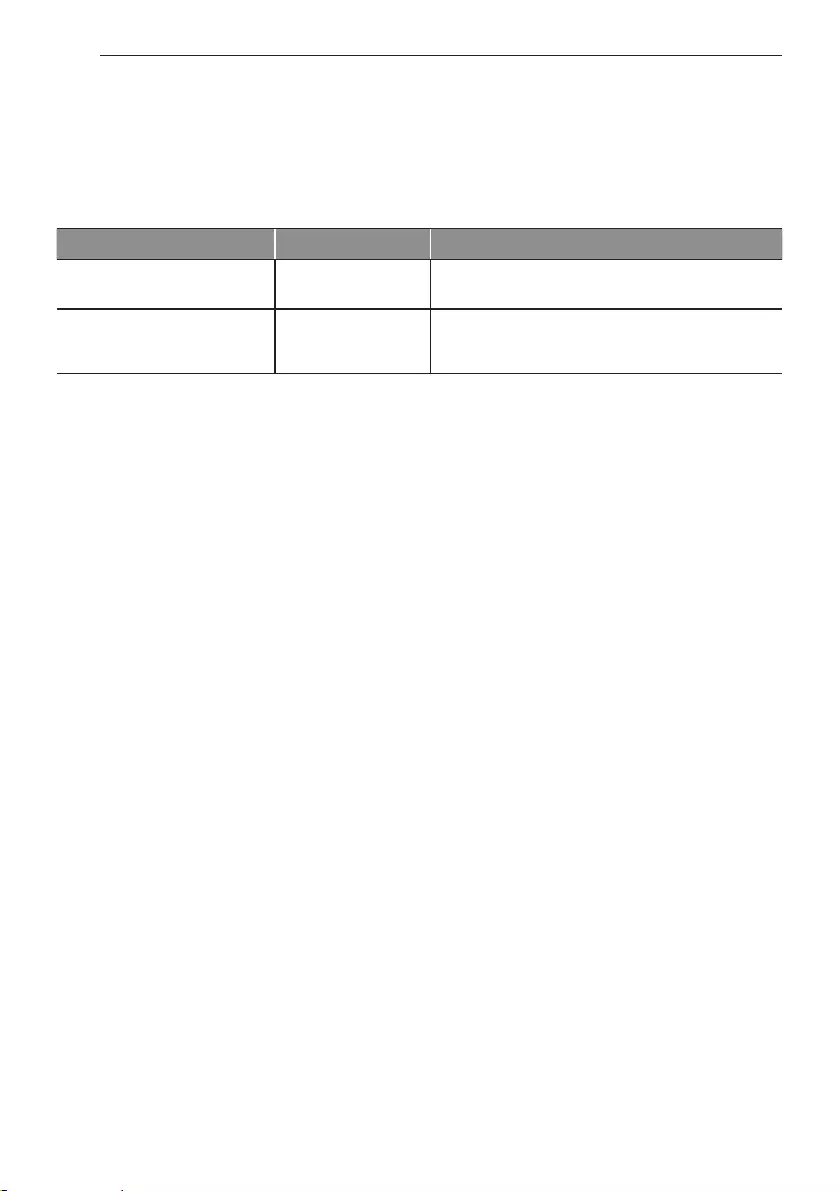
50 GARANTÍA
GARANTÍA (EE. UU.)
Si su secadora LG (el “Producto”) fallara debido a defectos de materiales o de fabricación en el uso doméstico
normal, durante el período de garantía que se establece a continuación, LG tendrá la opción de reparar o reemplazar
el producto. Esta garantía limitada solo es válida para el comprador minorista original del producto y será vigente
solo cuando se compre y use dentro de los Estados Unidos y de los territorios estadounidenses. Se exige el
comprobante de compra minorista original para solicitar servicio por garantía según esta garantía limitada.
Período de garantía
Alcance de la garantía
CÓMO SE MANEJA EL SERVICIO TÉCNICO
Un (1) año a partir de la fecha
de compra minorista original
Piezas y mano de
obra
LG suministrará las piezas y la mano de obra para
reparar o reemplazar las piezas defectuosas.
Diez (10) años a partir de la
fecha de compra minorista
original
Tambor de la
secadora
Solo las piezas. El cliente será responsable de
cualquier trabajo o servicio realizado en su casa para
reemplazar las piezas defectuosas.
Los productos y las piezas de repuesto están garantizados durante el tiempo restante del período original de
•
garantía o noventa (90) días, lo que resulte mayor.
Los productos y las piezas de repuesto pueden ser nuevos o reparados.
•
ESTA GARANTÍA REEMPLAZA CUALQUIER OTRA GARANTÍA, EXPRESA O IMPLÍCITA, LO QUE INCLUYE SIN
LÍMITE, LAS GARANTÍAS DE APTITUD COMERCIAL O IDONEIDAD PARA UN FIN EN PARTICULAR. SALVO
POR LAS GARANTÍAS IMPLÍCITAS EXIGIDAS POR LA LEY, ES DE DURACIÓN LIMITADA AL PERÍODO DE
GARANTÍA EXPRESA MENCIONADO ANTERIORMENTE. NI EL FABRICANTE NI SU DISTRIBUIDOR EN LOS
ESTADOS UNIDOS SERÁN RESPONSABLES DE NINGÚN DAÑO INCIDENTAL, EMERGENTE, INDIRECTO
NI PUNITIVO DE NINGÚN TIPO, LO QUE INCLUYE SIN LÍMITE, INGRESOS O GANANCIAS PERDIDOS O
CUALQUIER OTRO DAÑO CONTRACTUAL, EXTRACONTRACTUAL O DE OTRO TIPO.
Algunos estados no permiten la exclusión o limitación de daños incidentales o emergentes, o limitaciones a la duración de la
garantía implícita, por lo que la exclusión o limitación anteriormente mencionadas podrían no corresponder en su caso. Esta
garantía le otorga derechos legales específicos y es posible que usted cuente con otros derechos que varían según el estado.
ESTA GARANTÍA LIMITADA NO CUBRE LO SIGUIENTE:
Viajes del servicio técnico para entregar, buscar, o instalar o reparar el producto; instrucciones al cliente sobre la
•
operación del producto; reparación o reemplazo de fusibles o corrección de cableado o fontanería, o corrección
de reparaciones/instalaciones no autorizadas.
Incapacidad del producto para funcionar debido a fallas e interrupciones del suministro eléctrico, o a un servicio
•
eléctrico inadecuado.
Daños causados por tuberías de agua rotas o con fugas, tuberías de agua congeladas, líneas de drenaje
•
restringidas, suministro de agua inadecuado o interrumpido, o suministro de aire inadecuado.
Daños resultantes de operar el producto en una atmósfera corrosiva o contraria a las instrucciones esbozadas en
•
el manual del propietario del producto.
Daños al producto causados por accidentes, pestes y alimañas, rayos, viento, incendio, inundaciones o hechos
•
de fuerza mayor.
Daños o fallas causados por modificaciones o alteraciones no autorizadas, o si se usa para otro fin que no sea el
•
previsto, o por fugas de agua donde la unidad no se haya instalado correctamente.
Daños o fallas causados por corriente o voltaje eléctricos incorrectos, o por códigos de fontanería, por uso
•
comercial o industrial, o por uso de accesorios, componentes o productos de limpieza consumibles no aprobados
por LG.
Daños causados por el transporte y el manejo, incluye rayas, muescas, astillado y otros daños al acabado del
•
producto, a menos que tales daños resulten de defectos de los materiales o de la fabricación y se informen dentro
del plazo de una (1) semana de la entrega.
Daños o artículos faltantes a productos reacondicionados, comprados con descuento, con la caja abierta o que
•
hayan estado en exhibición.
Productos cuyos números de serie originales hayan sido retirados, alterados o no se puedan determinar
•
fácilmente. Los números de serie y de modelo, junto con el comprobante de venta minorista original, son
necesarios para validar la garantía.
Aumentos en los costos de los servicios públicos y otros gastos adicionales de dichos servicios.
•
MFL67731049_sp_170714.indd 50 2017.7.14 2:22:51 PM

51
ESPAÑOL
Reparaciones cuando el producto se use de otra forma que no sea uso doméstico usual y normal (p. ej., uso
•
comercial, en oficinas e instalaciones recreativas) o contraria a las instrucciones esbozadas en el manual del
propietario del producto.
Costos asociados con el retiro del producto de su casa para realizar reparaciones.
•
El retiro y la reinstalación del producto si está instalado en un lugar inaccesible o no está instalado de acuerdo
•
con las instrucciones de instalación publicadas, lo que incluye los manuales de instalación y del propietario de LG.
Daños resultantes de mal uso, abuso, instalación, reparación o mantenimiento incorrectos. Una reparación
•
incorrecta incluye el uso de piezas no aprobadas o especificadas por LG.
El filtro está tapado.
La secadora no calienta,
•
tiempo de secado
prolongado.
Limpie el filtro de pelusa.
•
El conducto está tapado.
La secadora no calienta,
•
tiempo de secado
prolongado.
Limpie la campana y el
•
conducto.
Conducto demasiado largo
y/o con múltiples codos.
La secadora no calienta,
•
tiempo de secado
prolongado.
Mantenga los conductos de
•
escape lo más cortos que sea
posible y use la menor cantidad
de codos y curvas como le sea
posible.
Cable de alimentación mal
conectado o problema con la
toma de corriente eléctrica.
Sin corriente
•
No calienta
•
Vuelva a conectar el cable
•
de alimentación, reemplace
el fusible de la casa o vuelva
a iniciar el disyuntor. Si el
problema es la toma de
corriente, es probable que
necesite llamar a un electricista.
La válvula de gas no está
abierta. (Secadora de gas).
No calienta
•
Abra la válvula de gas.
•
Inversión de la puerta.
Las instrucciones para la
•
inversión de la puerta pueden
encontrarse en el manual del
usuario.
El costo de la reparación o el reemplazo en estas circunstancias excluidas estarán a cargo del consumidor.
CÓMO OBTENER SERVICIO EN GARANTÍA E INFORMACIÓN ADICIONAL
Si usted no tiene acceso a Internet y necesita asistencia para el uso de su producto o desea programar un servicio
técnico, puede comunicarse con LG Electronics al número que aparece a continuación.
Para obtener asistencia o servicio técnico, llame al 1-800-243-0000.
Si necesita más ayuda, puede escribir a LG para dirigir sus preguntas o inquietudes a la dirección que aparece a
continuación:
LG Electronics, 201 James Record Road, Huntsville, Alabama 35813
Para obtener más información sobre el producto, visite nuestro sitio web en http://www.lg.com
GARANTÍA
MFL67731049_sp_170714.indd 51 2017.7.14 2:22:58 PM
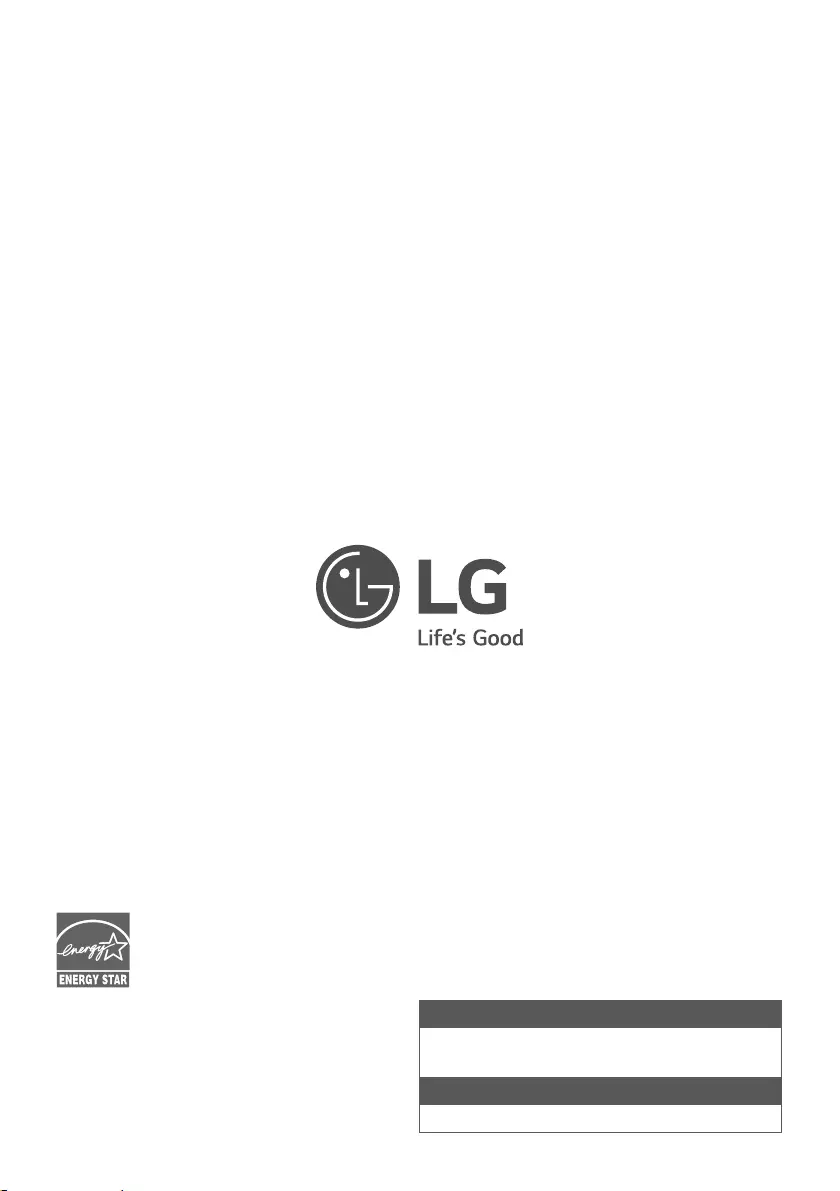
1-800-243-0000 USA
1-888-542-2623 CANADA
LG Customer Information Center
Register your product Online!
www.lg.com
This product qualifies for ENERGY STAR in
the “factory default (Home Use)” setting.
Changing the factory default settings or
enabling other features may increase power
consumption that could exceed the limits
necessary to qualify for ENERGY STAR.
MFL67731049_sp_170714.indd 52 2017.7.14 2:23:0 PM